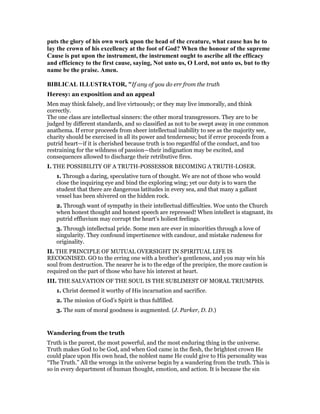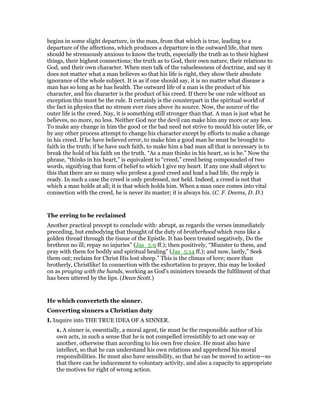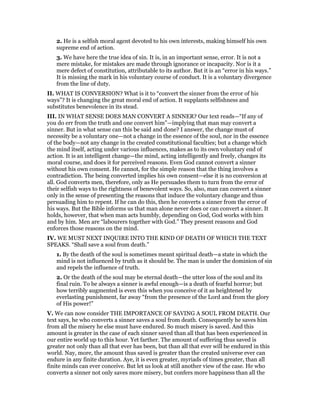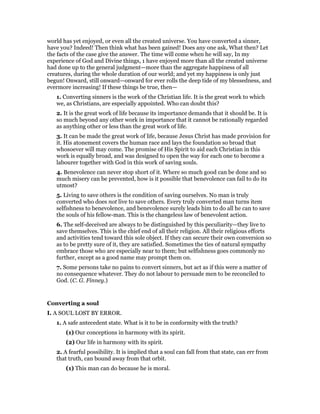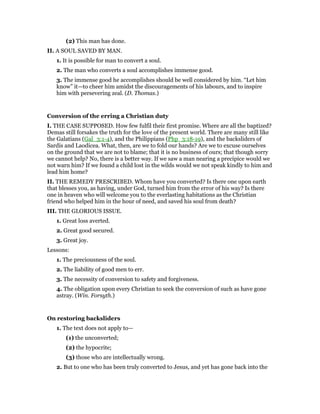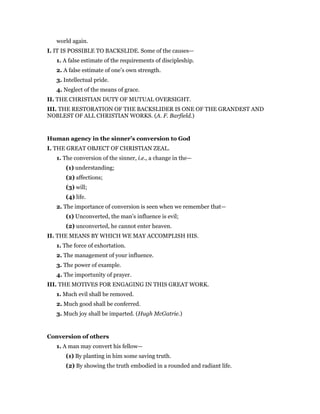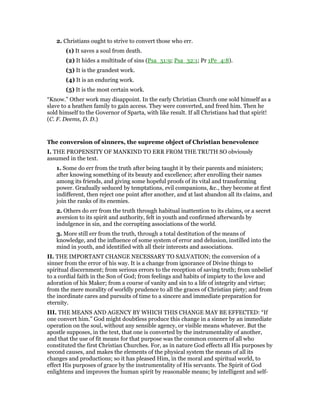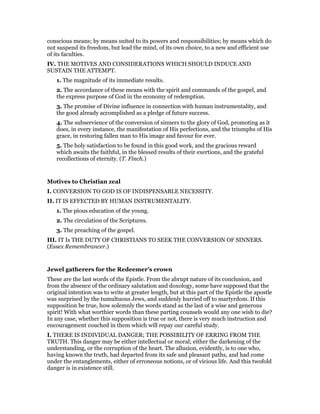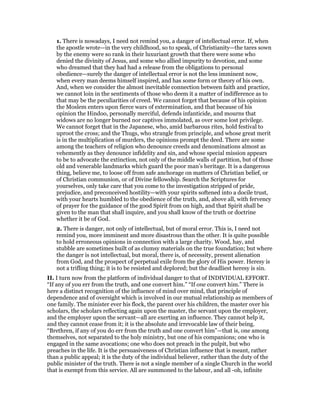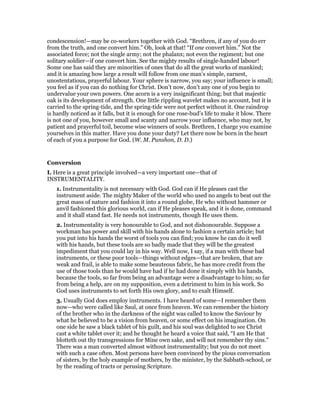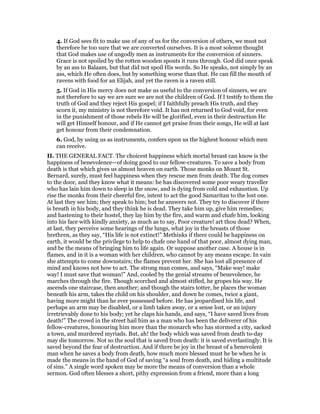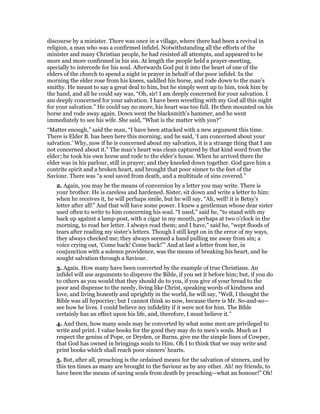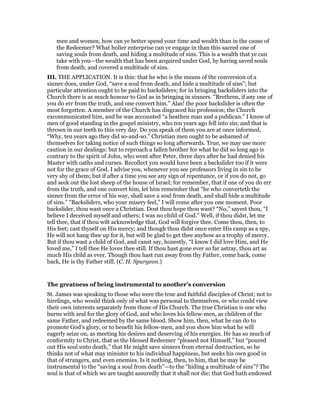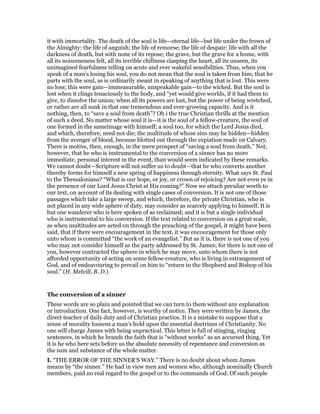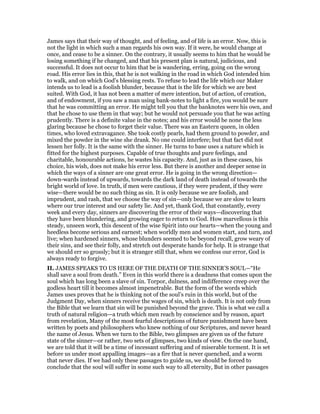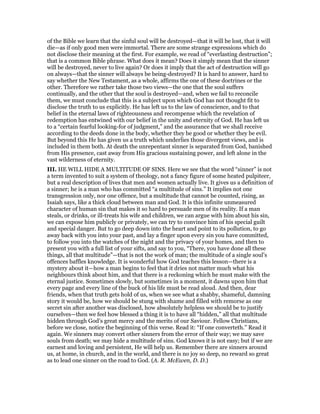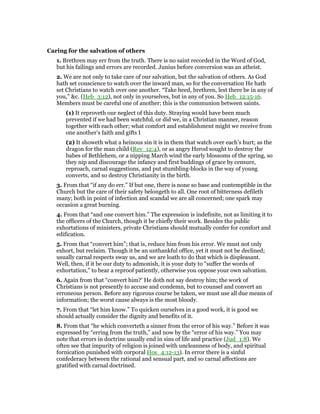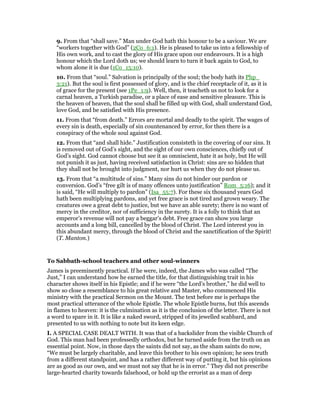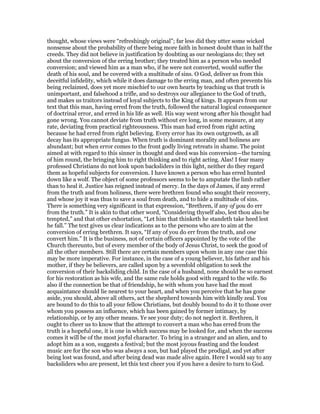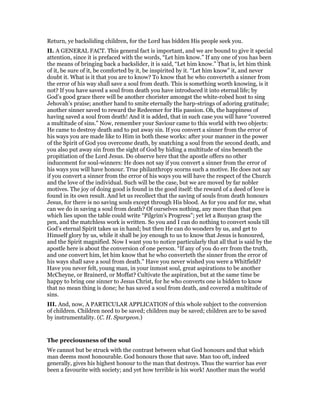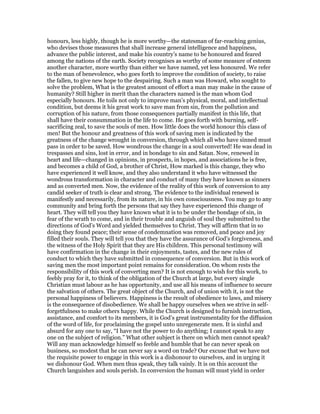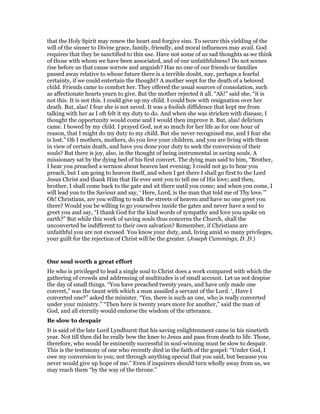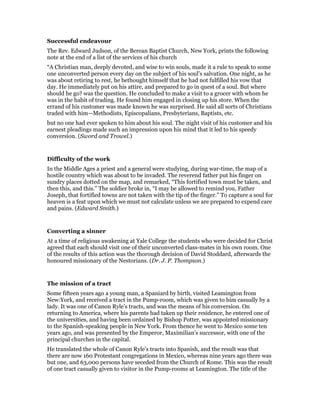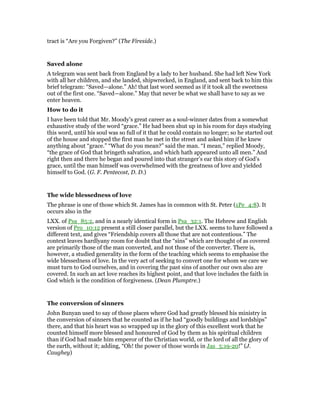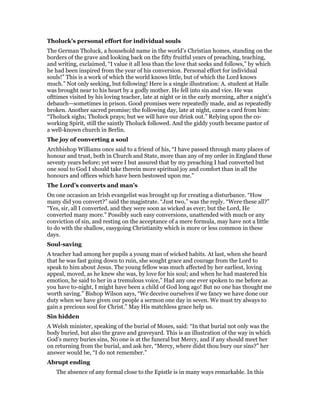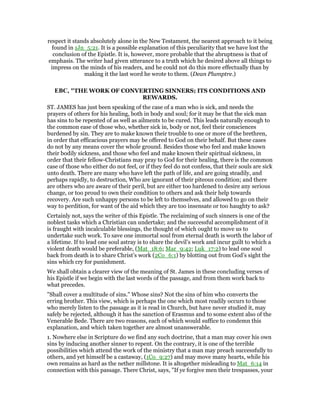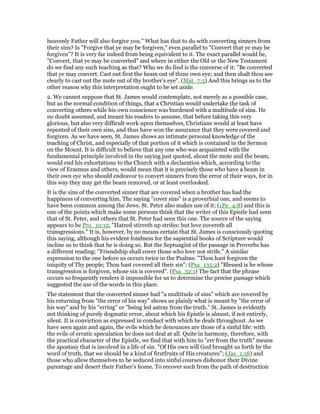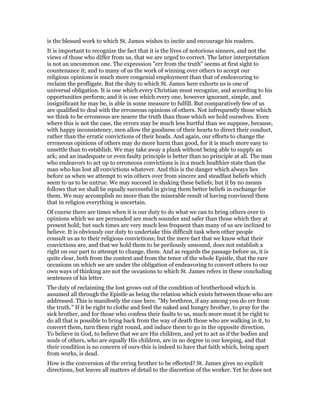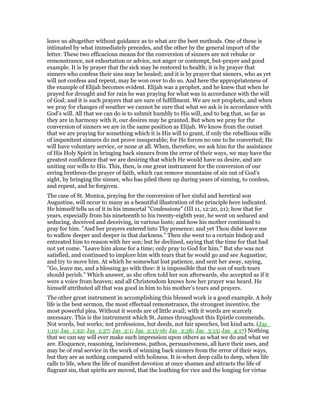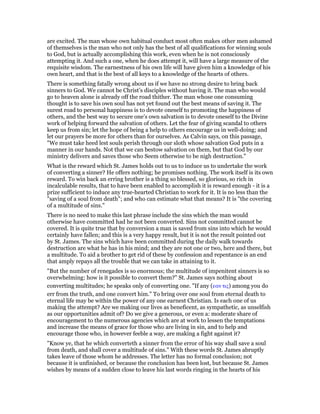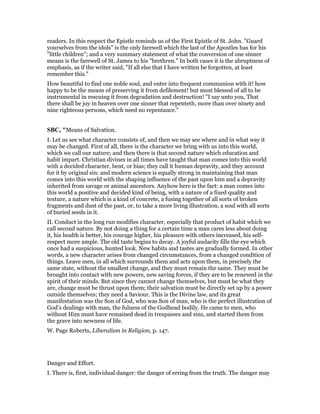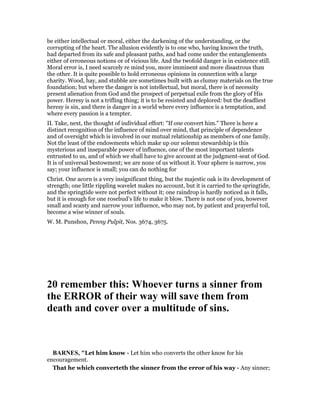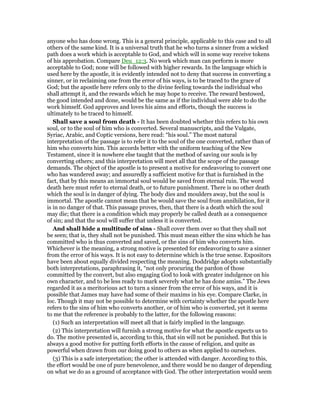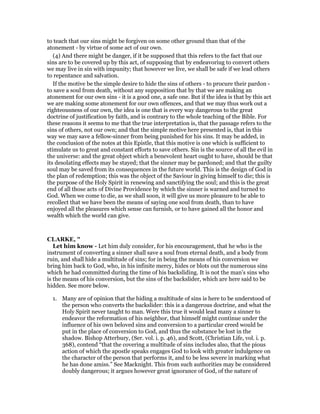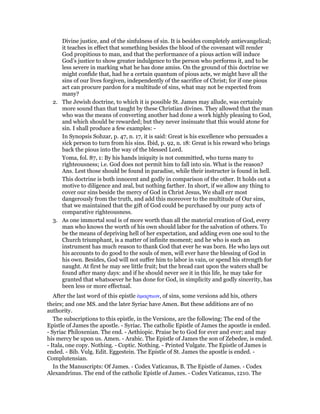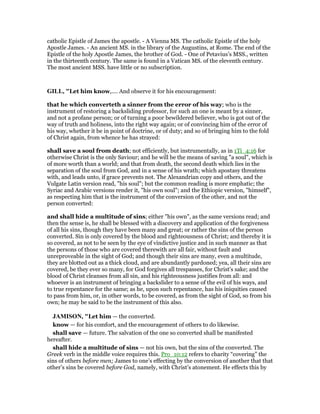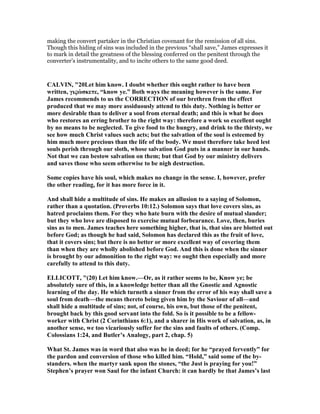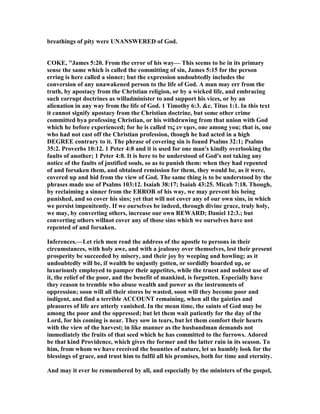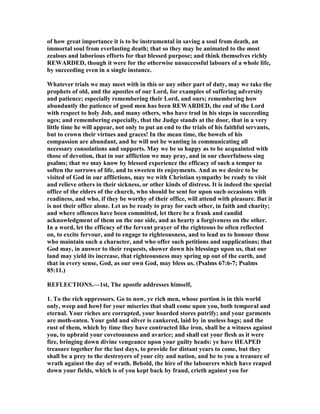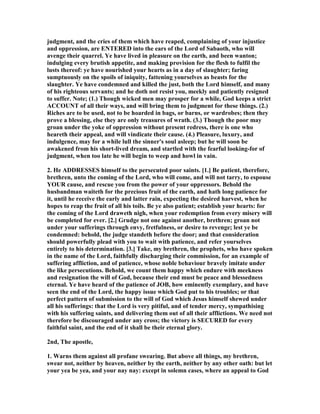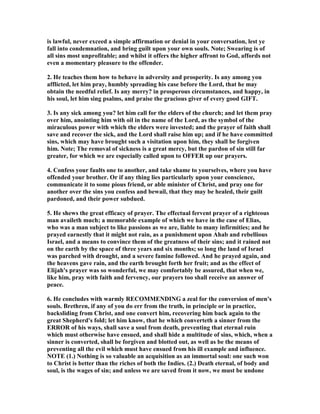The document presents a commentary on James 5, specifically addressing the rich and the impending judgment they face due to their unjust and oppressive actions. It emphasizes the emotional distress that is foretold for these individuals, calling them to weep and wail for the miseries that are to come, which are interpreted as both temporal and eternal. The text warns against the false sense of security that wealth provides, highlighting the ultimate worthlessness of earthly riches and the serious consequences of neglecting spiritual responsibilities.
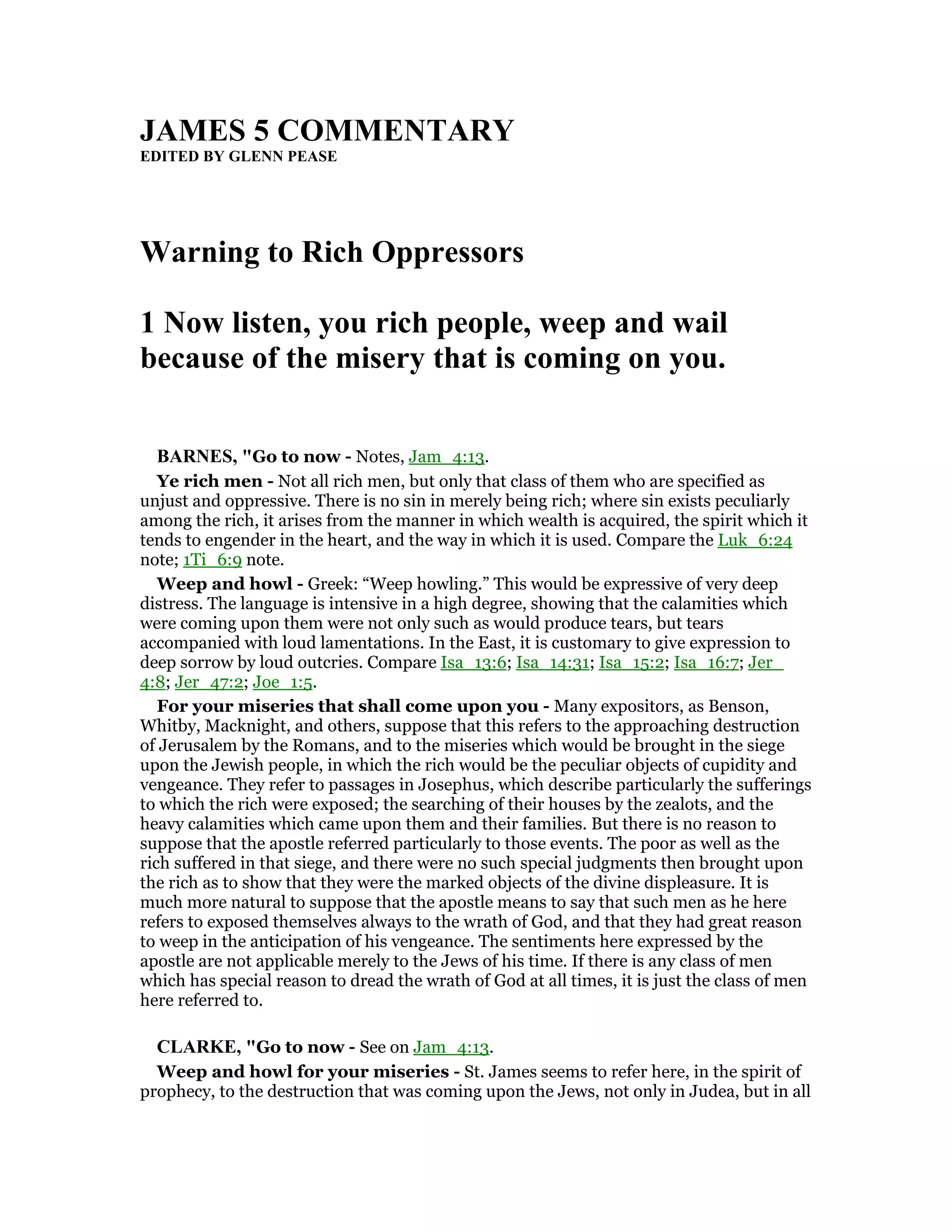
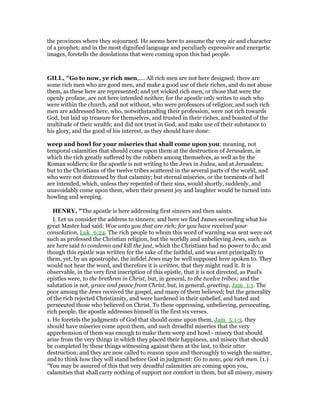
![in time, misery to eternity, misery in your outward afflictions, misery in your inward
frame and temper of mind, misery in this world, misery in hell. You have not a single
instance of misery only coming upon you, but miseries. The ruin of your church and
nation is at hand; and there will come a day of wrath, when riches shall not profit men,
but all the wicked shall be destroyed.” (2.) The very apprehension of such miseries as
were coming upon them is enough to make them weep and howl. Rich men are apt to say
to themselves (and others are ready to say to them), Eat, drink, and be merry; but God
says, Weep and howl. It is not said, Weep and repent, for this the apostle does not expect
from them (he speaks in a way of denouncing rather than admonishing); but, “Weep and
howl, for when your doom comes there will be nothing but weeping, and wailing, and
gnashing of teeth.” Those who live like beasts are called howl like such. Public calamities
are most grievous to rich people, who live in pleasure, and are secure and sensual; and
therefore they shall weep and howl more than other people for the miseries that shall
come upon them
JAMISO , "Jam_5:1-20. Woes coming on the wicked rich: Believers should be
patient unto the Lord’s coming: Various exhortations.
Go to now — Come now. A phrase to call solemn attention.
ye rich — who have neglected the true enjoyment of riches, which consists in doing
good. James intends this address to rich Jewish unbelievers, not so much for
themselves, as for the saints, that they may bear with patience the violence of the rich
(Jam_5:7), knowing that God will speedily avenge them on their oppressors [Bengel].
miseries that shall come — literally, “that are coming upon you” unexpectedly and
swiftly, namely, at the coming of the Lord (Jam_5:7); primarily, at the destruction of
Jerusalem; finally, at His visible coming to judge the world.
CALVI , "1Go to now. They are mistaken, as I think, who consider that James
here exhorts the rich to repentance. It seems to me to be a simple denunciation of
God’s judgment, by which he meant to terrify them without giving them any hope of
pardon; for all that he says tends only to despair. He, therefore, does not ADDRESS
them in order to invite them to repentance; but, on the contrary, he has a regard to
the faithful, that they, hearing of the miserable and of the rich, might not envy their
fortune, and also that knowing that God would be the avenger of the wrongs they
suffered, they might with a calm and resigned mind bear them. (136)
But he does not speak of the rich indiscriminately, but of those who, being immersed
in pleasures and inflated with pride, thought of nothing but of the world, and who,
like inexhaustible gulfs, devoured everything; for they, by their tyranny, oppressed
others, as it appears from the whole passage.
Weep and howl, or, Lament, howling. Repentance has indeed its weeping, but being
mixed with consolation, it does not PROCEED to howling. Then James intimates
that the heaviness of God’s vengeance will be so horrible and severe on the rich, that
they will be constrained to break forth into howling, as though he had said briefly to
them, “Woe to you!” But it is a prophetic mode of speaking: the ungodly have the
punishment which awaits them set before them, and they are represented as already
enduring it. As, then, they were now flattering themselves, and promising to
themselves that the prosperity in which they thought themselves happy would be](https://image.slidesharecdn.com/james5commentary-150623140637-lva1-app6891/85/James-5-commentary-3-320.jpg)
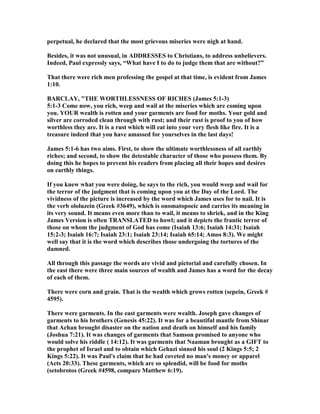
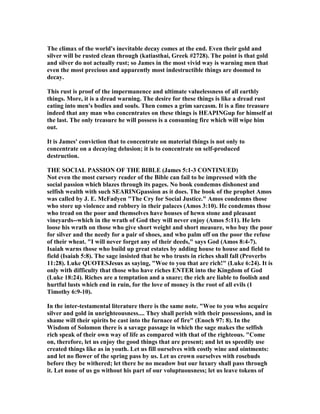
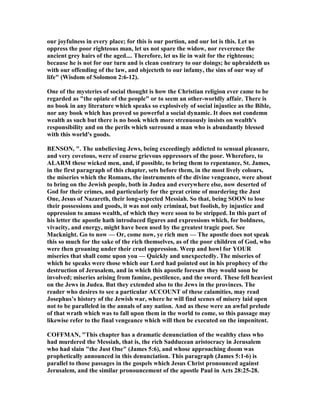
![Calvin was probably CORRECT in failing to find here any call to repentance.[1] It
was past time for that. The hour was approaching when the wrath of God would be
poured out upon Israel for their final rejection of Christ; and James adopted the
stern language of the Old Testament prophets for pronouncing their doom. As
Gibson said, "This paragraph might almost be a leaf torn out of the Old
Testament."[2] Despite the original APPLICATIO of these verses, however, there
remains an eloquent warning for all men who may be tempted to amass their wealth
through selfishness and exploitation. If Christians are in this ungodly class, the
warning is for them also. As Lenski said, "Merely bearing the Christian name does
not exempt them."[3] James, more than any other ew Testament writer, identified
the true reason why "the righteous one" was slain. It resulted directly from the
selfish hatred of the Jewish religious hierarchy in Jerusalem, a hatred which was
inspired by Jesus' twice cleansing the temple and challenging their godless robbing
of the people. It was their conduct in the temple that figured prominently in the
teachings of Jesus; but in this inspired paragraph, James gives a little more
extensive view of their "operations," in the wicked defrauding of farm laborers, and
their selfish lives of luxury.
The next paragraph (James 5:7-12) has an admonition directed to the brethren with
a plea for them to be patient and wait until the Lord himself would avenge their
wrongs and execute judgment upon their oppressors. There is more here than
merely a social injustice. "The rich" in focus here were also the persecutors of
Christians (James 2:6,7).
[1] Calvin as QUOTED by E. G. Punchard, Ellicott's Commentary on the Holy
Bible, Vol. VIII (Grand Rapids, Michigan: Zondervan Publishing House, 1959), p.
375.
[2] E. C. S. Gibson, The Pulpit Commentary, Vol. 21, James (Grand Rapids,
Michigan: Wm. B. Eerdmans Publishing Company, 1950), p. 67.
[3] R. C. H. Lenski, The Interpretation of the Epistle of James (Minneapolis:
Augsburg Publishing House, 1938), p. 644.
Come now, ye rich, weep and howl for YOUR miseries which are coming upon you.
(James 5:1)
Ye rich ... " either here nor elsewhere in the ew Testament are the rich
denounced simply because they are rich."[4] Many God-fearing souls have been
wealthy, from the days of JOB and Abraham until the present day; and the frequent
ew Testament warnings relative to riches must always be understood as reference
to wealth held without regard for the kingdom of God. Yet, there is an inherent
dishonesty in riches themselves, meaning not that such wealth was dishonorably
procured, or even that its possessor is unmindful of God, but that wealth inherently,
within itself, has an evil influence. For discussion of this, see in my Commentary on
Luke, pp. 349,350.](https://image.slidesharecdn.com/james5commentary-150623140637-lva1-app6891/85/James-5-commentary-7-320.jpg)
![Weep and howl for your miseries ... "The verb [@ololuzein] (used here) means more
than to wail; it means to shriek ... it depicts the frantic terror of those upon whom
the judgment of God has come."[5] This supports the interpretation that what we
are DEALI G with here is a judgment of God upon a self-hardened and rebellious
people.
Which are coming upon you ... The tense of the verbs in this paragraph is the
present perfect, the traditional prophetic tense of the Old Testament, in which God's
judgments are announced in the present tense, indicating that such prophesies are
as certain to be fulfilled as if fulfillment had ALREADY come to pass. Gibson said
that "The perfects are probably to be explained as prophetic in accordance with a
common Hebrew idiom."[6]
[4] A. F. Harper, Beacon Bible Commentary (Kansas City: Beacon Hill Press, 1967),
p. 238.
[5] William Barclay, The Letters of James and Peter (Philadelphia: The
Westminster Press, 1977), p. 115.
[6] E. C. S. Gibson, op. cit., p. 67.
COKE, "Wicked rich men are to fear God's vengeance. We ought to be patient in
afflictions, after the example of the prophets, and Job: to forbear swearing; to pray
in adversity; to sing in prosperity; to acknowledge mutually our several faults; to
pray one for another, and to reduce a straying brother to the truth.
Anno Domini 60.
THE first six verses of this chapter have been looked upon as an ADDRESS to the
unbelieving Jews, among whom the Christians lived in their dispersions, and by
whom they were persecuted; but they appear to me to have been rather a fine
apostrophe. It is evident that this epistle is written in a sublime stile, and abounds
with lively images, beautiful similitudes, and other strong figures. Why may not we
then look upon these six verses as a remarkable instance of this kind? Indeed there
appears to me nothing to hinder us from supposing that they are introduced in a
figurative manner; that is, by way of apostrophe. There is a beautiful apostrophe to
this purpose, Revelation 18:20 and the speaking by way of apostrophe is not only
usual with the sacred writers, (see Deuteronomy 32:1. Jeremiah 22:29. 1
Corinthians 15:55.) but also with the best Greek and Roman writers: and the
apostle seems to have introduced it here, that by this image he might give the greater
force to those arguments which he was about to OFFER for the support and
encouragement of the Jewish Christians, who were at that time in a state of
persecution. For after he had, in this livelymanner, set before them the much
heavier calamities which were hanging over the heads of their greatest enemies and
most violent persecutors, and just ready to fall upon them, he then finishes the
apostrophe; and, addressing himself directly to the Jewish Christians, says with the
greatest propriety, Be ye patient therefore, unto the coming of the Lord, &c. That is,](https://image.slidesharecdn.com/james5commentary-150623140637-lva1-app6891/85/James-5-commentary-8-320.jpg)
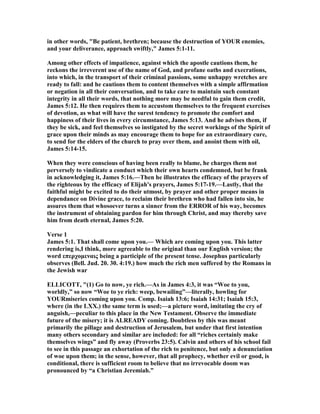
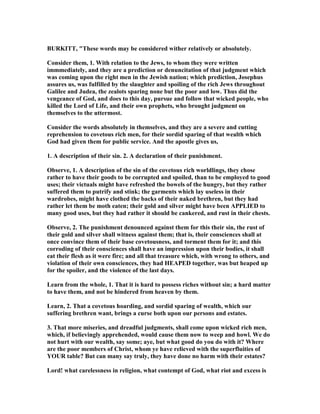
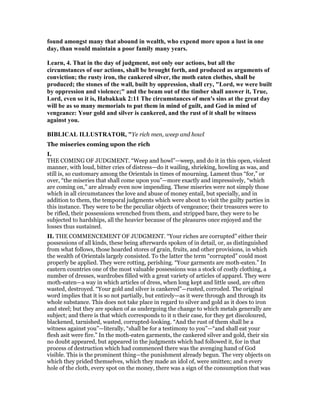
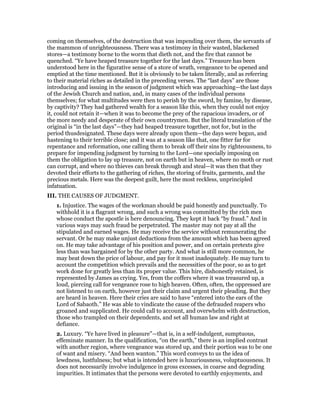
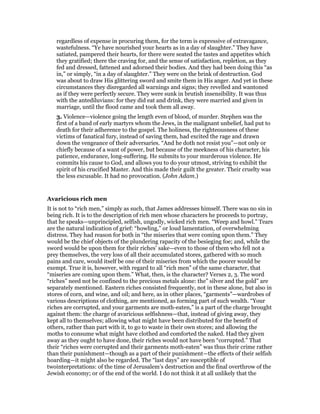
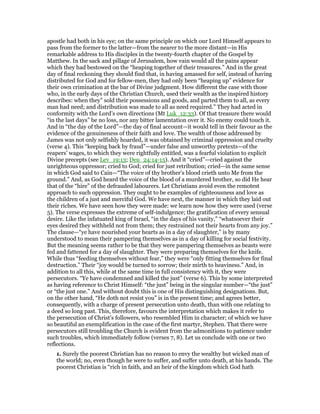
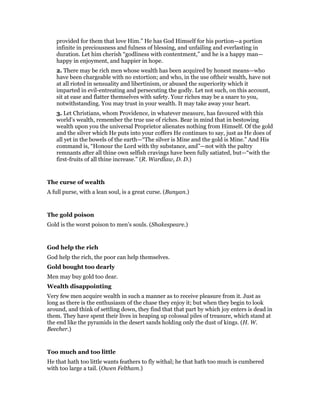
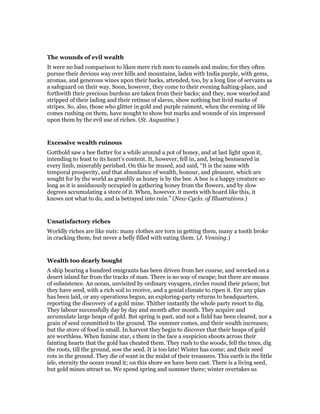
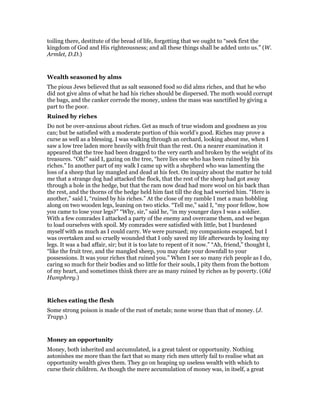
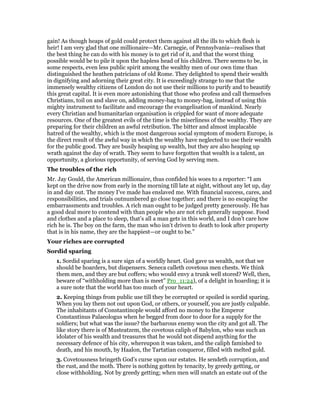
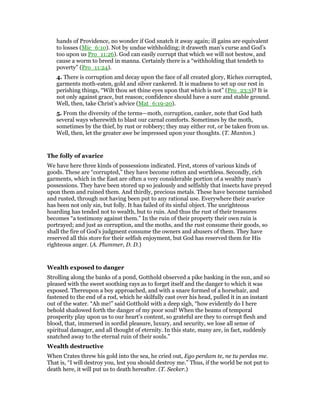
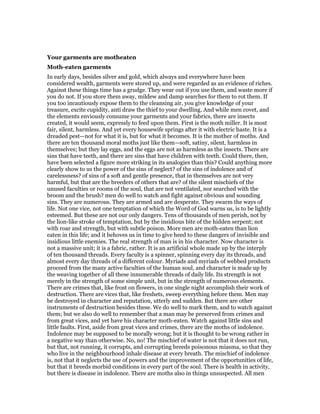
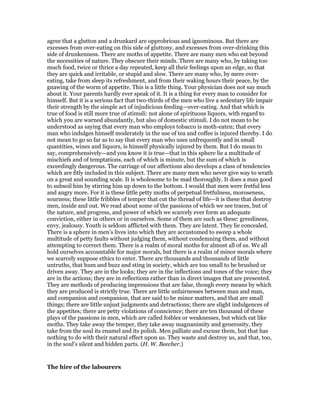
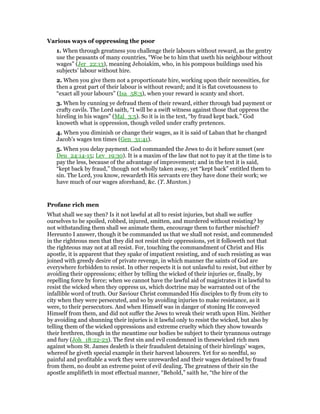
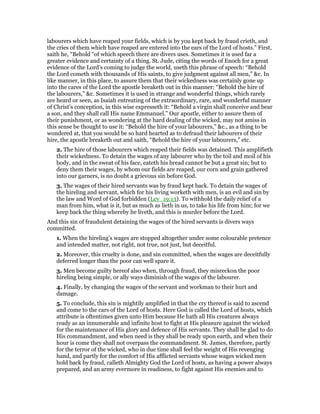
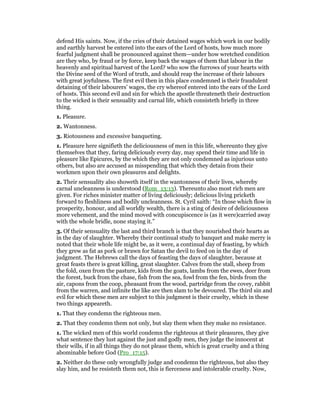
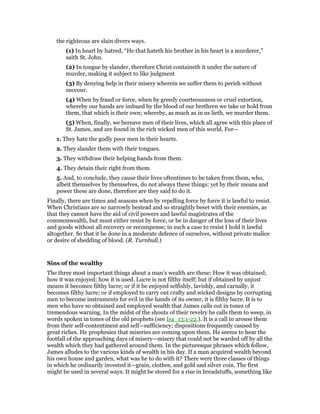
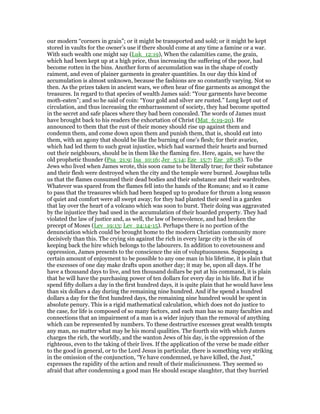
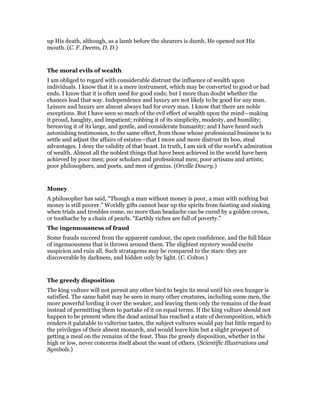
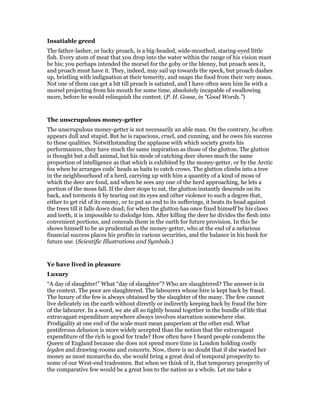
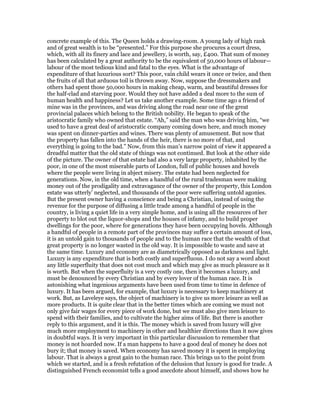
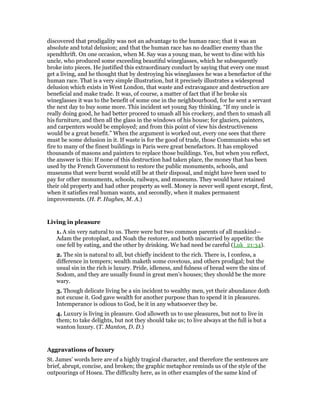
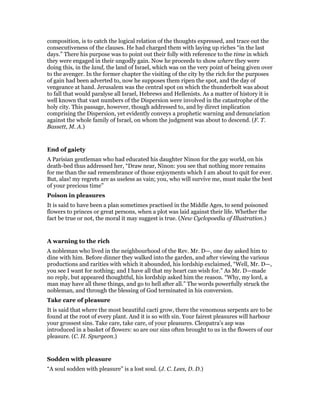
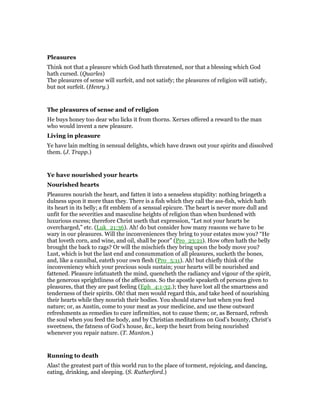
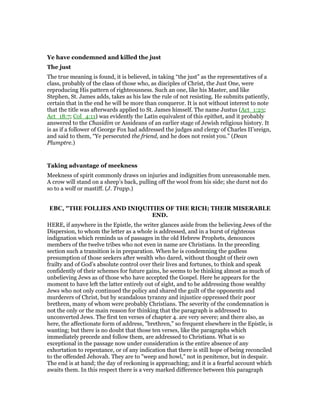
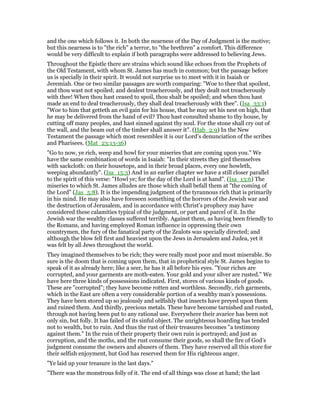
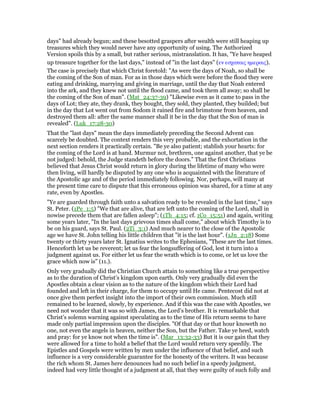
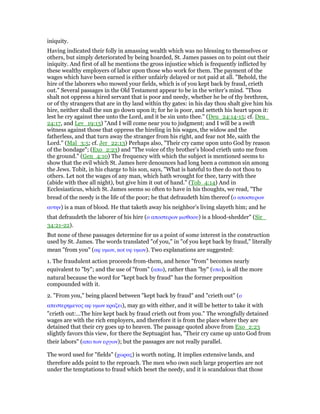
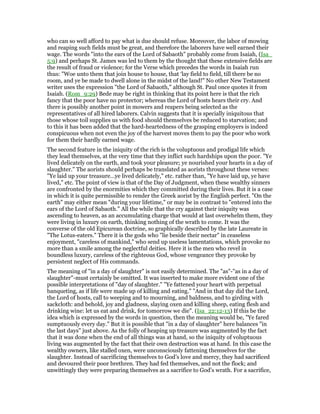
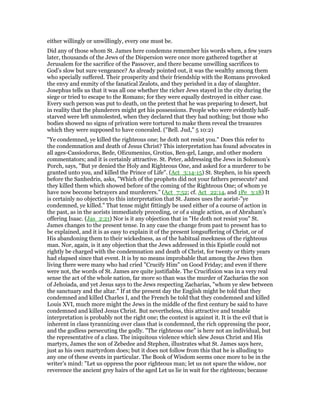
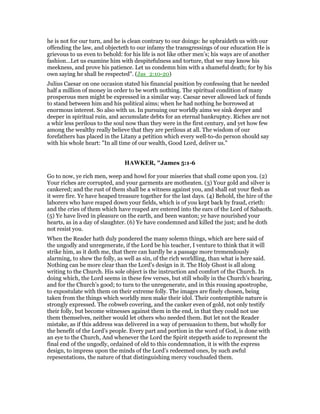
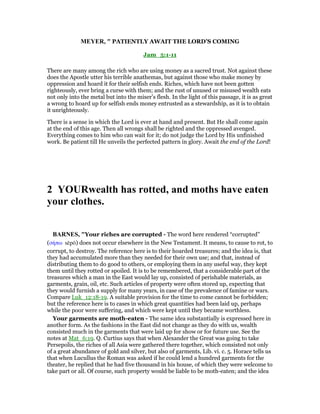
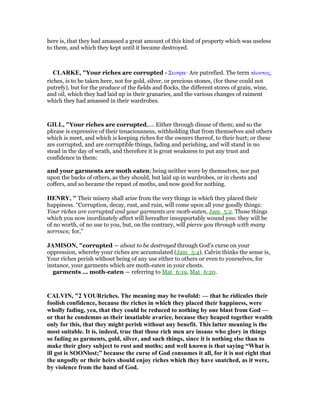
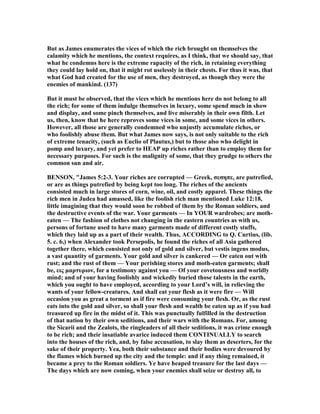
![your infinite vexation and distress: or, you have HEAPED them up when it is too
late; when you have no time or OPPORTU ITY to enjoy them. This phrase, the last
days, does not merely signify for the time to come, but for that period when the
whole Jewish economy was to close, and when those awful judgments, threatened in
the prophets to be poured out upon wicked men in the last days, were just coming.
COFFMA , "Your riches are corrupted, and your garments are moth-eaten.
All the fabulous wealth of the Jewish hierarchy in Jerusalem would prove utterly
worthless to prevent the "miseries" coming upon them. Their great STORES of oil
and wheat would be turned into famine by the siege against the city. Their fine
garments would prove as worthless as a moth-eaten rag. And did such miseries
indeed come upon them? Alas, they did. As Gibson observed, "The Jewish historian
(Josephus) was the unconscious witness of the fulfillment of the prophecies of our
Lord and his apostles against Jerusalem."[7] The best commentary upon what befell
Jerusalem is found in the works of Josephus, who related in detail the unspeakable
horror, disaster, slaughter, famine and total ruin, not merely of the city alone, but
even of the temple and everything else. All the major kinds of wealth were
enumerated here by James. The riches that would be "corrupted" were supplies like
those of corn and oil; fine clothing was also a standard treasure of the rich. Gold
and silver would be mentioned next.
E D OTE:
[7] Ibid.
COKE, "James 5:2. YOURriches are corrupted,— By riches here are very probably
meant their STORESof corn, wine, oil, and other perishing goods, which they used
to lay up in great abundance: see James 5:4 and Luke 12:16-19. Dr. Heylin reads it,
your stores. Another thing which CO FIRMS this conjecture is, that the word
σεσηπε, which we render corrupted, signifies any thing's being putrified by being
kept too long,—like the manna, Exodus 16:20. Such riches as gold, silver, &c.
afterwards mentioned, are not liable to a putrefaction of this kind. We have
heretofore observed, that the rich among the ancients used to have many changes of
garments ready made up, as many (or more sometimes,) as would serve them all
their lives; and those they kept by them, as a considerable part of their possessions.
The apostle alludes to this, when he says, Your garments are moth-eaten. See the
note on Matthew 22:11.
ELLICOTT, "(2) YOUR riches are corrupted . . .—As expanded in the eloquent
gloss of Bishop Wordsworth, “Your wealth is mouldering in corruption, and your
garments, stored up in vain superfluity, are become moth-eaten: although they may
still glitter brightly in your eyes, and may dazzle men by their brilliance, yet they
are in fact already cankered; they are loathsome in God’s sight; the Divine anger
has breathed upon them and blighted them; they are already withered and blasted.”
(Comp. Matthew 6:19.)](https://image.slidesharecdn.com/james5commentary-150623140637-lva1-app6891/85/James-5-commentary-43-320.jpg)
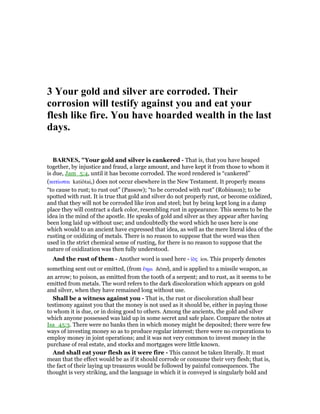
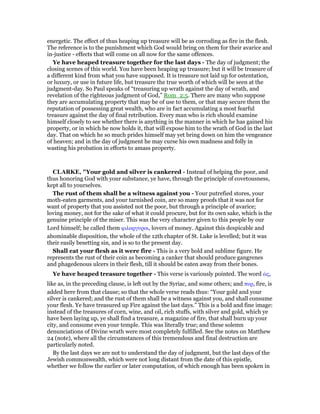
![the preface.
GILL, "Your gold and silver is cankered,.... Or grown rusty like iron, by lying long
without use; this is not easily and quickly done, but in length of time gold and silver will
change, and contract a rustiness; and so this conveys the same idea of hoarding up
riches and laying up money, without making use of it in trade, for the support of the
poor, and without distributing it to their necessities:
and the rust of them shall be a witness against you: at the day of judgment;
which will be a proof that they have not been employed to such services, and for such
usefulness, for which they were designed and given.
And shall eat your flesh as it were fire; that is, a remembrance of this, a sense of it
impressed upon them, shall be like fire in their bones; shall distress their minds, gnaw
their consciences, and be in them the worm that never dies, and the fire that shall never
be quenched:
ye have heaped treasure together for the last days; either for many years, as the
fool in the Gospel, for the times of old age, the last days of men, for fear they should then
want; or for the last days of the world, or of time, as if they thought they should live for
ever: the Vulgate Latin version reads, "ye have treasured up wrath for yourselves in the
last days"; instead of riches, as they imagined; and that by their covetousness and
wickedness, by a wicked disuse of their riches, and an unrighteous detention of them;
but this supplement seems to be taken from Rom_2:5 though the sense is confirmed by
some copies which connect the phrase, "as it were fire", in the preceding clause, with
this, "ye have treasured up as it were fire"; and the Syriac version renders it, "ye have
treasured up fire"; the fire of divine wrath; this is the fruit of treasuring up riches in an
ill way, and without making a proper use of them.
HE RY, " “They will witness against you, and they will eat your flesh as it were
fire,” Jam_5:3. Things inanimate are frequently represented in scripture as witnessing
against wicked men. Heaven, earth, the stones of the field, the production of the ground,
and here the very rust and canker of ill-gotten and ill-kept treasures, are said to witness
against impious rich men. They think to heap up treasure for their latter days, to live
plentifully upon when they come to be old; but, alas! they are only heaping up treasures
to become a prey to others (as the Jews had all taken from them by the Romans), and
treasures that will prove at last to be only treasures of wrath, in the day of the revelation
of the righteous judgment of God. Then shall their iniquities, in the punishment of them,
eat their flesh as it were with fire. In the ruin of Jerusalem, many thousands perished by
fire; in the last judgment the wicked shall be condemned to everlasting burnings,
prepared for the devil and his angels. The Lord deliver us from the portion of wicked
rich men! and, in order to this, let us take care that we do not fall into their sins, which
we are next to consider.
JAMISO , "is cankered — “rusted through” [Alford].
rust ... witness against you — in the day of judgment; namely, that your riches
were of no profit to any, lying unemployed and so contracting rust.
shall eat your flesh — The rust which once ate your riches, shall then gnaw your](https://image.slidesharecdn.com/james5commentary-150623140637-lva1-app6891/85/James-5-commentary-46-320.jpg)
![conscience, accompanied with punishment which shall prey upon your bodies for ever.
as ... fire — not with the slow process of rusting, but with the swiftness of consuming
fire.
for the last days — Ye have heaped together, not treasures as ye suppose (compare
Luk_12:19), but wrath against the last days, namely, the coming judgment of the Lord.
Alford translates more literally, “In these last days (before the coming judgment) ye laid
up (worldly) treasure” to no profit, instead of repenting and seeking salvation (see on
Jam_5:5).
CALVI , "3A witness against you. He CO FIRMS the explanation I have already
given. For God has not appointed gold for rust, nor garments for moths; but, on the
contrary, be has designed them as aids and helps to human life. Therefore, even
spending without benefit is a witness of inhumanity. The rusting of gold and silver
will be, as it were, the occasion of inflaming the wrath of God, so that it will, like
fire, consume them.
Ye have heaped treasure together: These words may also admit of two explanations:
— that the rich, as they would always live, are never satisfied, but weary themselves
in heaping together what may be sufficient to the end of the world, — or, that they
heap together the wrath and curse of God for the last day; and this second view I
embrace. (138)
COFFMA , "YOURgold and your silver are rusted; and their rust shall be for a
testimony against you, and shall eat your flesh as fire. Ye have laid up your
treasures in the last days.
Gold ... silver ... rusted ... The precious metals themselves did not rust, of course,
and James certainly knew that; but the base alloys evil men had mixed with them
did rust. The gold and silver of the Sadducean enemies were in no sense "pure," but
they had been mixed with fraud, deceit, oppression, falsehood and murder; and the
metaphor of rusted gold and silver is eloquent. Even the most precious assets would
be of no AVAIL when the judgment fell.
A testimony against you ... As the blood of righteous Abel cried unto God, just so the
Sadducean wealth of Jerusalem would cry to heaven for vengeance. Long centuries
of God's forbearance and patient love, still spurned, still contemptuously rejected,
would at last reap their inevitable harvest.
And shall eat your flesh as fire ... This is a metaphor. The woes coming upon them
were, in fact, caused by their inordinate love of that very wealth so avidly and
fraudulently acquired; thus it was appropriate to say that the wicked riches unjustly
extorted and wickedly abused would indeed eat their flesh as fire. Punchard
declared that "The wages of the traitor, the spoil of the thief, and the wealth of the
oppressor burn the hands that clasp them. Memories of the wrongs shiver through
each guilty soul like fire."[8]
Dummelow referred this to "the siege of Jerusalem."[9] Likewise, Carson:](https://image.slidesharecdn.com/james5commentary-150623140637-lva1-app6891/85/James-5-commentary-47-320.jpg)
![The last days were ALREADY upon them. The Christian is always in the last days
(Acts 2:17; 1 John 2:18). The reference is to the last days before the Second Advent,
of which the destruction of Jerusalem was a type.[10]SIZE>
In the destruction of Jerusalem, the wealthy Sadduceans lost all of their wealth, and
more than a million were ruthlessly murdered, fulfilling perfectly the promise of
Jesus that "The king was wroth; and he sent his armies, and destroyed those
murderers, and burned their city" (Matthew 22:7). This was "the last days" of the
Jewish commonwealth.
Despite the Old Testament overtones of this passage, the spirit and teaching of the
ew Testament also permeate it, as indicated by this reference to "the last days,"
and the laying up of treasures where moth and rust doth consume (James 5:2), a
plain reference to Jesus' teaching in Matthew 6:20f.
[8] E. G. Punchard, op. cit., p. 375.
[9] J. R. Dummelow, Commentary on the Holy Bible ( ew York: The Macmillan
Company, 1937), p. 1037.
[10] T. Carson, A ew Testament Commentary (Grand Rapids, Michigan:
Zondervan Publishing House, 1969), p. 580.
COKE, "James 5:3. Ye have HEAPED treasure together, &c.— The literal and
most exact translation of the words is, Ye have heaped up treasure in the last days;
which rendering leads us to the true interpretation of them. By the last days, we
understand here the end of the Jewish state; when the temple, city, and polity, were
to be all destroyedtogether,andtheRomanswouldspoilthemof all their possessions.
Daniel's four monarchies are, according to Mede, the grand calendar in holy
scripture, to which the mention of times and seasons in the ew Testament ought in
general to be referred. These four monarchies were to succeed each other: that was
the long line of time; and under the last, (that is, the Roman monarchy,) the
kingdom of God was to be erected: the seventy weeks prophesied of, Daniel 9:24
were to be a shorter line of time; cut out of the longer line. And the last days
mentioned here, and in the parallel passages of the ew Testament, were the
conclusion of the seventy weeks, or shorter line of time; when the city and
sanctuary, or temple, were to be destroyed with an utter desolation. See 1 Timothy
4:1. Heaping up treasures when that desolation was approaching, could turn to no
ACCOU T, because they had very little or no time to enjoythem; for the rich Jews
in their dispersions did many of them share the same fate with those in Judea and
Jerusalem.
ELLICOTT, "(3) Your gold and silver . . .—In like manner, the gold and silver are
said to be “cankered,” or eaten up with rust. The precious metals themselves do not
corrode, but the base alloy does, which has been mixed with them for worldly use
and device. The rust of them shall be a witness to you: not merely against, but
convincing yourselves in the day of judgment; and, moreover, a sign of the fire](https://image.slidesharecdn.com/james5commentary-150623140637-lva1-app6891/85/James-5-commentary-48-320.jpg)
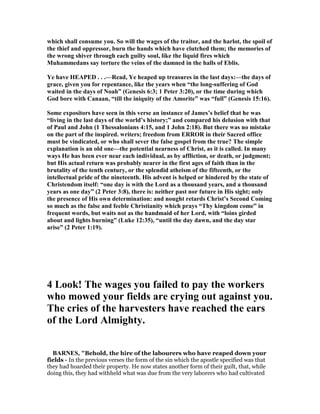
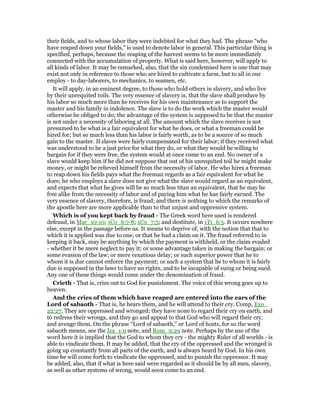
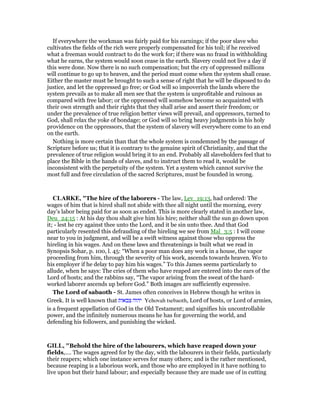
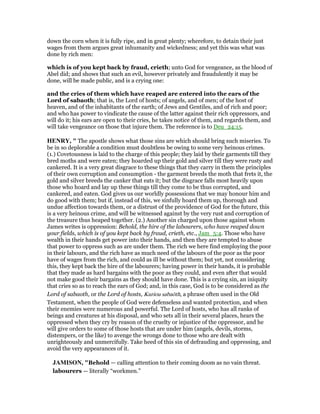
![of you kept back — So English Version rightly. Not as Alford, “crieth out from you.”
The “keeping back of the hire” was, on the part OF the rich, virtually an act of “fraud,”
because the poor laborers were not immediately paid. The phrase is therefore not, “kept
back by you,” but “of you”; the latter implying virtual, rather than overt, fraud. James
refers to Deu_24:14, Deu_24:15, “At this day ... give his hire, neither shall the sun go
down upon it, lest he CRY against thee unto the Lord, and it be sin unto thee.” Many sins
“cry” to heaven for vengeance which men tacitly take no account of, as unchastity and
injustice [Bengel]. Sins peculiarly offensive to God are said to “cry” to Him. The rich
ought to have given freely to the poor; their not doing so was sin. A still greater sin was
their not paying their debts. Their greatest sin was not paying them to the poor, whose
wages is their all.
cries of them — a double cry; both that of the hire abstractly, and that of the
laborers hired.
the Lord of sabaoth — here only in the New Testament. In Rom_9:29 it is a
quotation. It is suited to the Jewish tone of the Epistle. It reminds the rich who think the
poor have no protector, that the Lord of the whole hosts in heaven and earth is the
guardian and avenger of the latter. He is identical with the “coming Lord” Jesus (Jam_
5:7).
CALVI , "4Behold, the hire. He now condemns cruelty, the invariable companion
of avarice. But he refers only to one kind, which, above all others, ought justly to be
deemed odious. For if a humane and a just man, as Solomon says in Proverbs 12:10,
regards the life of his beast, it is a monstrous barbarity, when man feels no pity
towards the man whose sweat he has EMPLOYED for his own benefit. Hence the
Lord has strictly forbidden, in the law, the hire of the laborer to sleep with us
(Deuteronomy 24:15). Besides, James does not refer to laborers in common, but, for
the sake of amplifying, he mentions husbandmen and reapers. For what can be
more base than that they, who supply us with bread by their labor should be pined
through want? And yet this monstrous thing is common; for there are many of such
a tyrannical disposition, that they think that the rest of mankind live only for their
benefit alone.
But he says that this hire crieth, for whatever men retain either by fraud or by
violence, of what belongs to another; it calls for vengeance as it were by a loud voice.
We ought to notice what he adds, that the cries of the poor come to the ears of God,
so that we may know that the wrong done to them shall not be unpunished. They,
therefore, who are oppressed by the unjust ought resignedly to sustain their evils,
because they will have God as their defender. And they who have the power of doing
wrong ought to abstain from injustice, lest they provoke God against them, who is
the protector and patron of the poor. And for this reason also he calls God the Lord
of Sabaoth, or of hosts, intimating thereby his power and his might, by which he
renders his judgment more dreadful.
BARCLAY, "THE WAY OF SELFISH ESS A D ITS E D (James 5:4-6)
5:4-6 Look you, the pay of the reapers who reaped YOUR estates, the pay kept back
from them by you, cries against you, and the cries of those who reaped have come to](https://image.slidesharecdn.com/james5commentary-150623140637-lva1-app6891/85/James-5-commentary-53-320.jpg)
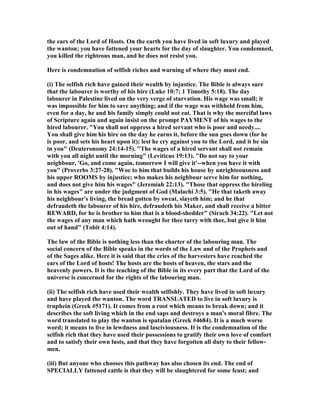
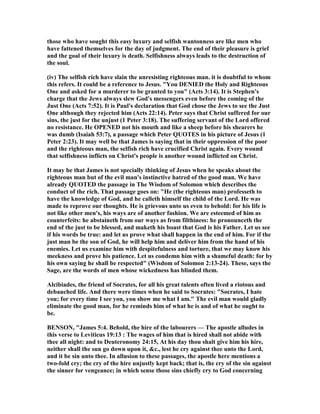
![which human laws are silent; such are luxury, unchastity, and various kinds of
injustice. But the cry of the labourers themselves is also here mentioned, to mark
more strongly the greatness of the injustice committed. And “by representing the
cries of the reapers defrauded of their hire as E TERI Ginto the ears of the Lord
of Sabaoth, that is, hosts, or armies, the apostle intimates that the great Ruler of the
universe attends to the wrongs done to his creatures, and is affected by them as
tender-hearted persons are affected by the cries of the miserable; and that he will, in
due time, avenge them by punishing their oppressors. Let all oppressors consider
this!” — Macknight.
COFFMA , "Behold the hire of the laborers who mowed your fields, which is of
you kept back by fraud, crieth out: and the cries of them that reaped have
E TERED into the ears of the Lord of Sabaoth.
It was not merely the rejection of Christ that provoked the judgment of God upon
the Jewish state, although that was sufficient; but it was their gross rebellion against
the very law they pretended so much to adore. Leviticus 13:13, and Deuteronomy
24:15, and countless other passages forbade the withholding of the laborers' pay
even for the space of a SI GLE day, but the evil men James denounced had
withheld it altogether, defrauding them of it.
The hire of the laborers ... This is an eloquent statement. It identifies the place of the
offense cited as Jerusalem of Judea, the rest of the civilized world of that period
having all of the farm work done by slaves. "Only in Palestine would field laborers
have been hired help; elsewhere in the Roman Empire the fields were worked by
slaves."[11] It also means that this epistle was surely written before the destruction
of Jerusalem, because after that event the slave system prevailed in Judea also.
Lord of Sabaoth ... Some writers seize upon this as proof of their allegation that
here we have a Jewish writing; but their ERROR is due to a failure to discern
James' reason for this usage. The judgment about to fall upon Israel was due to
their having rejected the teachings of the Lord of Sabaoth, as inculcated in the Law
of Moses; and it was most fitting that this lapse on their part should have been
mentioned in connection with this prophetic announcement of their destruction. The
expression means "The Lord of Hosts," "The God of the heavenly armies," "God of
the heavenly hosts (such as the sun, moon and stars)," "God of all the armies of
angels arranged in an orderly host," etc., etc. It speaks of the omnipotence, glory
and eternity of Almighty God. Tasker called this "One of the most majestic of all the
titles of God in the Old Testament."[12] The only other ew Testament usage of this
title is in Romans 9:29, where Paul QUOTED it from Isaiah in exactly the same
context as that in which James used it here, namely, that of discussing the apostasy
of Israel. How strange it is that some fail to see the same connection here.
[11] A. F. Harper, op. cit., p. 238.
[12] R. V. G. Tasker, Tyndale ew Testament Commentaries, James (Grand
Rapids, Michigan: Wm. B. Eerdmans Publishing Company, 1977), p. 113.](https://image.slidesharecdn.com/james5commentary-150623140637-lva1-app6891/85/James-5-commentary-56-320.jpg)
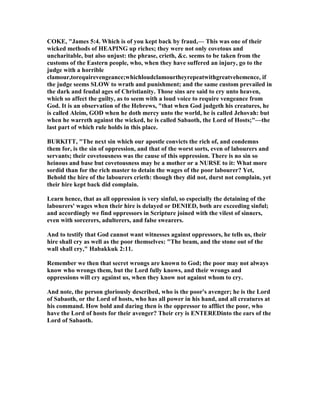
![5 You have lived on earth in luxury and self-
indulgence. You have fattened yourselves in the
day of slaughter.[a]
BAR ES, "Ye have lived in pleasure on the earth - One of the things to which
the rich are peculiarly addicted. Their wealth is supposed to be of value, because it
furnishes them the means of doing it. Compare Luk_12:19; Luk_16:19. The word
translated “lived in pleasure, (τρυφάω truphaō) occurs only here in the New Testament.
It means, to live delicately, luxuriously, at ease. There is not in the word essentially the
idea or vicious indulgence, but that which characterizes those who live for enjoyment.
They lived in ease and affluence on the avails of the labors of others; they indulged in
what gratified the taste, and pleased the ear and the eye, while those who contributed the
means of this were groaning under oppression. A life of mere indolence and ease, of
delicacy and luxury, is nowhere countenanced in the Bible; and even where unconnected
with oppression and wrong to others, such a mode of living is regarded as inconsistent
with the purpose for which God made man, and placed him on the earth. See Luk_12:19-
20. Every man has high and solemn duties to perform, and there is enough to be done on
earth to give employment to every human being, and to fill up every hour in a profitable
and useful way.
And been wanton - This word now probably conveys to most minds a sense which is
not in the original. Our English word is now commonly used in the sense of “lewd,
lustful, lascivious.” It was, however, formerly used in the sense of “sportive, joyous, gay,”
and was applied to anything that was variable or fickle. The Greek word used here
(σπαταλάω spatalaō) means, to live luxuriously or voluptuously. Compare the notes at
1Ti_5:6, where the word is explained. It does not refer necessarily to gross criminal
pleasures, though the kind of living here referred to often leads to such indulgences.
There is a close connection between what the apostle says here, and what he refers to in
the previous verses - the oppression of others, and the withholding of what is due to
those who labor. Such acts of oppression and wrong are commonly resorted to in order
to obtain the means of luxurious living, and the gratification of sensual pleasures. In all
countries where slavery exists, the things here referred to are found in close connection.
The fraud and wrong by which the reward of hard toil is withheld from the slave is
connected with indolence and sensual indulgence on the part of the master.
Ye have nourished your hearts - Or, yourselves - the word hearts here being
equivalent to themselves. The meaning is, that they appeared to have been fattening
themselves, like stall-fed beasts, for the day of slaughter. As cattle are carefully fed, and
are fattened with a view to their being slaughtered, so they seemed to have been fattoned
for the slaughter that was to come on them - the day of vengeance. Thus many now live.
They do no work; they contribute nothing to the good of society; they are mere
consumers - fruges, consumere nati; and, like stall-fed cattle, they seem to live only with
reference to the day of slaughter, and to the recompense which awaits them after death.
As in a day of slaughter - There has been much variety in the interpretation of this
expression. Robinson (lex.) renders it, “like beasts in the day of slaughter, without care
or forethought.” Rosenmuller (Morgenland) supposes that it means, as in a festival;](https://image.slidesharecdn.com/james5commentary-150623140637-lva1-app6891/85/James-5-commentary-58-320.jpg)
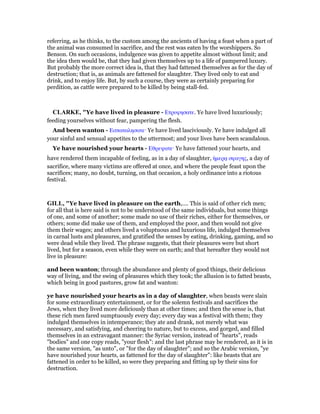
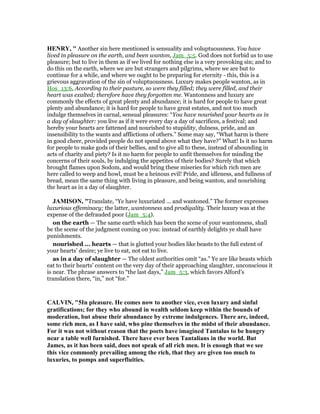
![And though the Lord allows them to live freely on what they have, yet profusion
ought to be avoided and frugality practiced. For it was not in vain that the Lord by
his prophets severely reproved those who slept on beds of ivory, who used precious
ointments, who delighted themselves at their feasts with the sound of the harp, who
were like fat cows in rich pastures. For all these things have been said for this end,
that we may know that moderation ought to be observed, and that extravagance is
displeasing to God.
Ye have nourished YOUR hearts. He means that they indulged themselves, not only
as far as to satisfy nature, but as far as their cupidity led them. He adds a similitude,
as in a day of slaughter, because they were wont in their solemn sacrifices to eat
more freely than ACCORDI G to their daily habits. He then says, that the rich
feasted themselves every day of their life, because they immersed themselves in
perpetual indulgences.
BE SO , "James 5:5-6. Ye have lived in pleasure, and have been wanton —
ετρυφησατε και εσπαταλησατε. The former word signifies, ye have lived
luxuriously; or, as the Vulgate has it, Epulati estis, ye have feasted; it being intended
of their luxuries and intemperance in eating and drinking: the latter word is
intended of their indulging themselves in lasciviousness and carnal lusts. Ye have
nourished — Or cherished; your hearts — Have indulged yourselves to the
uttermost; as in a day of slaughter — That is, as beasts are fed for a day of
slaughter; or, as the words may be rendered, as in a day of sacrifice, which were
solemn feast-days among the Jews. The apostle’s meaning is, both that the rich Jews
pampered themselves every day, as the luxurious did on high festival-days; and that,
by their luxury and lasciviousness, they had rendered themselves fit to be destroyed
in the day of God’s wrath. Ye have condemned and killed, τον δικαιον, the Just One
— Many just men, and in particular that Just One, termed, (Acts 3:14,) the Holy
One and Just. They had killed Stephen, also, and they afterward killed James, the
writer of this epistle, surnamed the Just. But the expression might be intended to
comprehend all the righteous persons who were murdered by the Jews from first to
last. And he — The Just One; doth not resist you — With that display of power
which he can easily exert to YOUR utter destruction, and therefore you are
SECURE. But the day will speedily come when God will avenge his own cause, and
pour out upon you the judgments he has threatened.
COFFMA , "Ye have lived delicately on the earth, and taken YOUR pleasure; ye
have nourished your hearts in a day of slaughter.
ourished your hearts in a day of slaughter ... This is a reference (a) to their delicate
living and their pleasures, called here "nourishing their hearts" and (b) to the
forthcoming destruction of Jerusalem, called here "a day of slaughter," the Old
Testament expression meaning "the day of God's judgment" (Isaiah 34:6; Ezekiel
21:15); and let it be noted that the day had already arrived. Their sins
CO TI UED in a day of slaughter, that is, up until the very moment of the
impending judgment. As Carson put it, "They were like animals gorging themselves
on the very day of their destruction."[13] As Adam Clarke said, concerning "the
last days" of James 5:3, and the "day of slaughter" here, "This is not to be](https://image.slidesharecdn.com/james5commentary-150623140637-lva1-app6891/85/James-5-commentary-61-320.jpg)
![understood as the judgment day, but as the last days of the Jewish
commonwealth."[14] Carson also said that the best exposition of this verse is
"Josephus' ACCOU T of the destruction of Jerusalem."[15]
[13] T. Carson, op. cit., p. 580.
[14] Adam Clarke, Commentary on the Holy Bible, Vol. VI (London: Carlton and
Porter, 1829), p. 824.
[15] T. Carson, op. cit., p. 580.
COKE, "James 5:5. Ye have lived in pleasure, &c.— Ye have passed your lives in
luxury and voluptuousness; ye have satiated yourselves [every day] as on a day of
sacrifice.
It is well known that at their high FESTIVALS, or when they offered their
eucharistical sacrifices, the Jews used to fare sumptuously, and devote the day to
feasting and joy; and very often would drink to excess. How justly was their luxury
condemned, when the rich persons here addressed, pampered themselves every day,
as other persons used commonly to do on the day of a high sacrifice and festival;—
while, notwithstanding their plenty, they neglected the poor, and hoarded up riches
to spend luxuriously upon themselves!
ELLICOTT, "(5) Ye have lived in pleasure.—And what an indictment is this
brought against them by the Apostle:—Ye revelled upon earth, and wantoned; ye
nourished your hearts in a day of slaughter. The pleasure and wantonness wherein
the rich had lived, the selfishness with which they had cared for their own hearts, in
a time of death for others—nay, preparation of like for themselves: this is the
aggravated wrong, and the inexpiable shame. In the Received text above they are
accused of having “nourished their hearts as in a day of slaughter,” the cries of the
victims thus seeming an addition to their own delights; but the charge against them
is heavy enough without this insertion.
As they had dealt to others, so the vengeance of God dealt with them. The Passover
called together the richest Jews from all parts of the earth, and they themselves were
the victims in their last sacrifice. o words can overdraw the fury of the Roman
onset, under Titus, when the Temple floors ran with blood, and the roofs raged in
fire till all was utter desolation.
BURKITT, "The next sin he charges upon them, is sensuality, luxury,
lasciviousness, their eating and drinking to excess in their feasts, pampering
themselves for the slaughter and the shambles. These are sins very natural to
corrupt nature, but chiefly incident to the rich. Pride, idleness, fulness of bread, and
living in pleasure, are too frequently sins that do abound in rich men's houses:
though their abundance is no excuse, but rather an aggravation of their sin.
God allows us to use pleasure, but not to live in pleasure; and by calling it pleasure](https://image.slidesharecdn.com/james5commentary-150623140637-lva1-app6891/85/James-5-commentary-62-320.jpg)
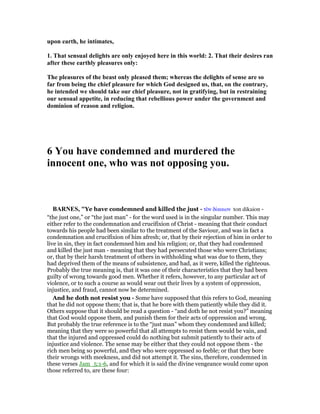
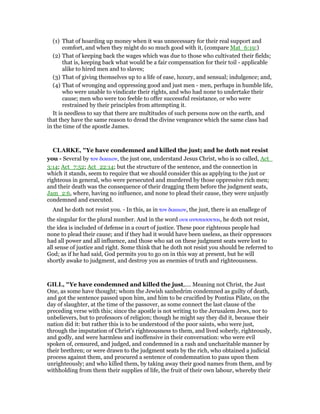
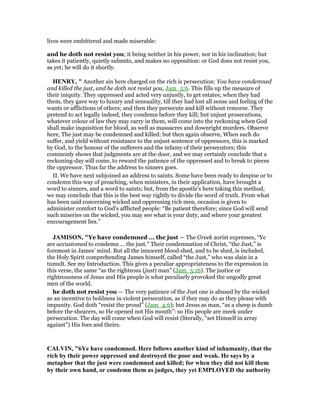
![which they had to do wrong, they corrupted judgments, and contrived various arts
to destroy the innocent, that is, really to condemn and kill them. (139)
By adding that the just did not resist them, he intimates that the audacity of the rich
was greater; because those whom they oppressed were without any PROTECTIO .
He, however, reminds them that the more ready and prompt would be the
vengeance of God, when the poor have no protection from men. But though the just
did not resist, because he ought to have patiently endured wrongs, I yet think that
their weakness is at the same time referred to, that is he did not resist, because he
was unprotected and without any help from men.
The two first verbs, being aorists, may be rendered in the present tense, especially as
the last verb is in that tense. For in the very next verse, the 7th, the aorist is so used.
We may then give this version, —
6. “Ye condemn, ye kill the righteous; he sets himself not in array against you.”
Probably the aorist is used, as it expresses what was done habitually, or a
CO TI UED act, like the future tense often in Hebrew. The preceding verse, the
5th, where all the verbs are aorists, would be better rendered in the same way, “Ye
live in pleasure,” etc.
COFFMA , "Ye have condemned, ye have killed the righteous one; he doth not
resist you.
The righteous one ... is an expression used of Christ in a number of ew Testament
references (Acts 3:14; 7:52; 22:14), and this is clearly the meaning of it here. That
James did not specify Christ by name is no problem, because ew Testament
writers generally were most reluctant to mention by name their own family; and
James adhered to this rule, making only enough exceptions to identify Jesus as the
Christ and Saviour. Dummelow, and many others, concede that "this may refer to
the Lord,"[16] and in the total absence of any reason why it should not be referred
to him, this is the way we shall construe it. Ward likewise allowed that "James
seems to see the condemnation of the Messiah repeated in the experience of his
righteous subjects."[17] Tasker and Gibson also APPLY this to righteous men
generally; but, while it is clear enough that it is true of righteous men generally the
specific reference here must be to Christ. Our interpretation of this whole
paragraph will hardly allow any other meaning. The great sin of the heartless rich
being thus condemned and judged was that of murdering the Messiah. "Ye have
condemned ..." indicates formal trial and passing sentence, details that were often
absent from their unjust dealings with the poor. "Ye have killed ..." This, they did
not generally do to the poor; but they effectively wrought the crucifixion of Christ.
Barclay admitted that this verse "could be a reference to Jesus Christ,"[18] though
he left the question open. That this is actually the meaning will appear in the further
examination of the last clause.
He doth not resist you ... It is a well know fact that the Greek words here may be
either affirmative or interrogative, the latter being in all probability CORRECT.](https://image.slidesharecdn.com/james5commentary-150623140637-lva1-app6891/85/James-5-commentary-66-320.jpg)
![Hort suggested, and Ropes advocated that it be read as a question, "Doth he not
resist you?"[19] Tasker explained that this would have a prophetic meaning,
demanding an affirmative reply.[20] The true meaning of the clause then is, "You
have killed the Christ, but will he not resist you? .... Do you really think you can
escape judgment for such a crime as that?" Thus read, this verse is a powerful and
dramatic conclusion of this terrible, yet magnificent, prophecy. The oppression of
the poor, the persecution of the church, the cruel and heartless crucifixion of the
Messiah inspired James in this sublime paragraph to announce the forthcoming
judgment of God as about to fall upon the perpetrators of such wickedness.
While construing this paragraph as primarily a prophecy against entrenched
Judaism, it should also be observed that it is charged with social consequences of the
most extensive dimensions. As Barclay said:
One of the mysteries is how Christianity ever came to be regarded as the opium of
the people. There is no book in any literature that speaks so explosively of social
injustice as does the Bible. It does not condemn wealth as such, but there is no book
which more strenuously insists on wealth's responsibilities, and on the perils that
surround the man of wealth.[21]SIZE>
This passage (James 5:1-6) deserves to rank alongside the greatest passages of the
Bible for its tremendous social implications. Charles David Eldridge identified the
Bible as the source of all social justice in these words:
The Old Testament prophets and the ew Testament writers denounce the exclusive
privileges of the rich, and the usurpation of the rights of the poor, and strenuously
enforce their demands for righteous DEALI GS among men. The Bible, like an
unfailing arsenal, has supplied the ammunition for the age-long struggle for liberty.
[22]SIZE>
Such qualities shine with exceptional brilliance in James' thundering denunciation
in this passage.
The CO ECTIO with the foregoing in the following passage (James 5:7-12) is
most intimate and instructive. With Lenski we deplore the blindness which has
viewed these as isolated statements. "He is charged with patching heterogeneous
pieces together. A redactor (!) is also mentioned."[23] It is simply incredible that
men should not see how closely James followed the teachings of Jesus Christ, the
writings of the ew Testament authors, and the teachings of the Old Testament in
this epistle. There is no need whatever to QUOTE from apocalyptic literature, the
book of Wisdom, Sirach and the inter-testamental writings in an effort to
understand James. The Holy Bible illuminates every word that he wrote.
The historical situation in which this epistle occurs is that of the expectancy
permeating the whole church during those years leading up to the destruction of
Jerusalem, an EVE T which was known and anticipated throughout the world of
that period. Christ had categorically predicted it in a prophecy that so inspired the
church that when the city was finally destroyed, not a Christian perished in the
disaster. They, having been forewarned, fled to Pella. This universal expectancy](https://image.slidesharecdn.com/james5commentary-150623140637-lva1-app6891/85/James-5-commentary-67-320.jpg)
![which dominated Christian thought in this period is conspicuous in the writings of
Paul, who noted with consternation a flowering of conceit and gloating expectancy
among the Gentile segment of Christianity, and who at Once wrote the book of
Romans, addressing it specifically to that conceit (see in my Commentary on
Romans, pp. 412,413). In the same manner, James in this epistle ADDRESSED that
air of expectancy (especially among the poor who had made up the vast majority of
Jewish Christianity), which as the years passed and Jerusalem was still standing,
had tended to be alloyed with impatience. The vital, intimate and urgent connection
is simply this: (1) the first six verses are a prophecy of the certain and impending
overthrow of the Sadducean overlords who were notorious oppressors of the poor
and the terminal heirs of that generation which had murdered the Son of God; (2)
the next six verses are concerned with the proper behavior and attitude of the
Christians who were destined to witness the fulfillment of the prophecy.
[16] J. R. Dummelow, op. cit, p. 1037.
[17] Ronald A. Ward, ew Bible Commentary, Revised (Grand Rapids, Michigan:
Wm. B. Eerdmans Publishing Company, 1970), p. 1233.
[18] William Barclay, op. cit., p. 120.
[19] R. V. G. Tasker, op. cit., p. 116.
[20] Ibid.
[21] William Barclay, op. cit., p. 117.
[22] Source of this quotation unknown.
[23] R. C. H. Lenski, op. cit., p. 645.
COKE, "James 5:6. Ye have condemned and killed the Just;— By τον ∆ικαιον, the
Just, some understand our Lord Jesus Christ, who is so termed, Acts 3:14 and in
other places. Him the Jews murdered, and he did not resist them; and they did it at
the timeof a great festival, when their hearts were elevated with high living and
jollity; for which crime particularly wrath was now swiftly coming upon them. All
these things maybe alledged in favour of that interpretation;—but I scarce think,
says Benson, that the apostle did here refer to the crucifixion of our Lord: for it was
chiefly the Jerusalem Jews, and not they of the dispersions, who were his
murderers; and how often is the singular number put for the plural?—I should
therefore choose to interpret this text of any of the Christians put to death by means
of the Jews, who were dispersed among the nations. Our Saviour prophesied that
his disciples should meet with such treatment; and St. Paul confessed that, while he
was a Jew, he had persecuted some of the Christians to death. Some of the Jews
likewise of the dispersions were the occasion of stoning St. Paul himself, till they
thought he had been dead. It may possibly be some CO FIRMATIO that by the
Just is meant, not our Lord, but his disciples; that in ch. James 2:6 rich men are](https://image.slidesharecdn.com/james5commentary-150623140637-lva1-app6891/85/James-5-commentary-68-320.jpg)
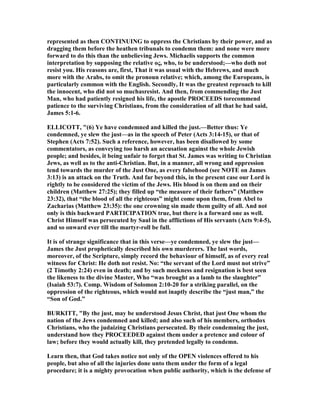
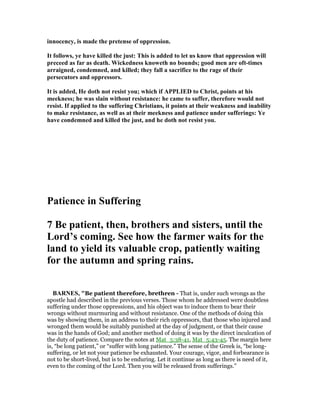
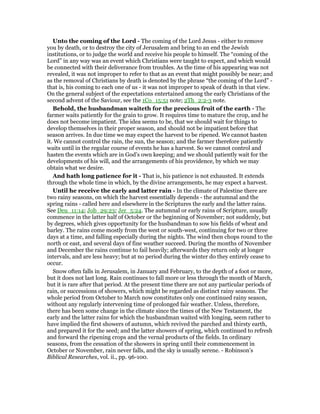
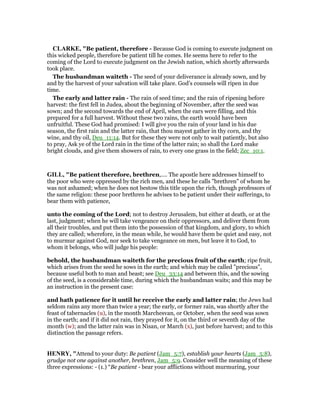
![injuries without revenge; and, though God should not in any signal manner appear for
you immediately, wait for him. The vision is for an appointed time; at the end it will
speak, and will not lie; therefore wait for it. It is but a little while, and he that shall
come will come, and will not tarry. Let your patience be lengthened out to long
suffering;” so the word here used, makrothumēsate, signifies. When we have done our
work, we have need of patience to stay for our reward. This Christian patience is not a
mere yielding to necessity, as the moral patience taught by some philosophers was, but it
is a humble acquiescence in the wisdom and will of God, with an eye to a future glorious
recompense: Be patient to the coming of the Lord. And because this is a lesson
Christians must learn, though ever so hard or difficult to the, it is repeated in Jam_5:8,
Be you also patient. (2.) “Establish your hearts - let your faith be firm, without
wavering, your practice of what is good constant and continued, without tiring, and your
resolutions for God and heaven fixed, in spite of all sufferings or temptations.” The
prosperity of the wicked and the affliction of the righteous have in all ages been a very
great trial to the faith of the people of God. David tells us that his feet were almost gone,
when he saw the prosperity of the wicked, Psa_73:2, Psa_73:3. Some of those
Christians to whom St. James wrote might probably be in the same tottering condition;
and therefore they are called upon to establish their hearts; faith and patience will
establish the heart. (3.) Grudge not one against another; the words mē stenazete signify,
Groan not one against another, that is, “Do not make one another uneasy by your
murmuring groans at what befalls you, nor by your distrustful groans as to what may
further come upon you, nor by your revengeful groans against the instruments of your
sufferings, nor by your envious groans at those who may be free from your calamities: do
not make yourselves uneasy and make one another uneasy by thus groaning to and
grieving one another.” “The apostle seemeth to me” (says Dr. Manton) “to be here taxing
those mutual injuries and animosities wherewith the Christians of those times, having
banded under the names of circumcision and uncircumcision, did grieve one another,
and give each other cause to groan; so that they did not only sigh under the oppressions
of the rich persecutors, but under the injuries which they sustained from many of the
brethren who, together with them, did profess the holy faith.” Those who are in the
midst of common enemies, and in any suffering circumstances, should be more
especially careful not to grieve nor to groan against one another, otherwise judgments
will come upon them as well as others; and the more such grudgings prevail the nearer
do they show judgment to be.
JAMISO , "Be patient therefore — as judgment is so near (Jam_5:1, Jam_5:3),
ye may well afford to be “patient” after the example of the unresisting Just one (Jam_
5:6).
brethren — contrasted with the “rich” oppressors, Jam_5:1-6.
unto the coming of the Lord — Christ, when the trial of your patience shall cease.
husbandman waiteth for — that is, patiently bears toils and delays through hope
of the harvest at last. Its “preciousness” (compare Psa_126:6, “precious seed”) will more
than compensate for all the past. Compare the same image, Gal_6:3, Gal_6:9.
hath long patience for it — “over it,” in respect to it.
until he receive — “until it receive” [Alford]. Even if English Version be retained,
the receiving of the early and latter rains is not to be understood as the object of his
hope, but the harvest for which those rains are the necessary preliminary. The early rain
fell at sowing time, about November or December; the latter rain, about March or April,
to mature the grain for harvest. The latter rain that shall precede the coming spiritual](https://image.slidesharecdn.com/james5commentary-150623140637-lva1-app6891/85/James-5-commentary-73-320.jpg)
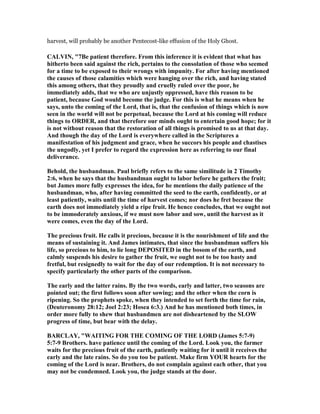
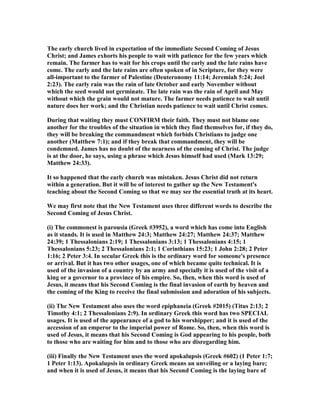
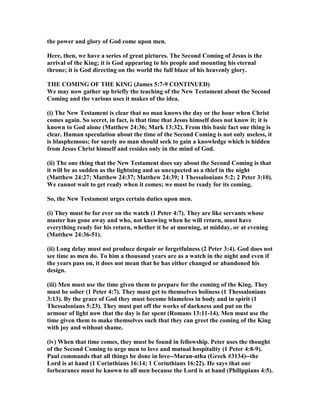
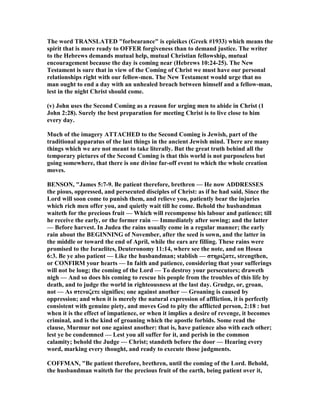
![until it receive the early and latter rain.
Until the coming of the Lord ... In Jesus' great prophetic utterances regarding the
destruction of Jerusalem, as recorded in Matthew 24; Mark 13, and Luke 21, our
Lord blended the prophecies of the destruction of Jerusalem with those of the
coming of the end of the world; and, in all probability, not even the apostles and
other ew Testament writers understood until long afterward that the two
EVE TSwould be separated by a vast distance in time. Only time would reveal that
the destruction of Jerusalem, which was indeed the end of the Jewish dispensation,
of the Jewish state, and of Judaistic persecution of Christianity, would be only a
type of the destruction of the whole world at the Second Advent. They fully
understood that Jerusalem was to be destroyed before that "generation" had passed
(see in my Commentary on Mark for double meaning of "generation," p. 292).
"Coming of the Lord," therefore, in this place has primary reference to the
destruction of Jerusalem; but in its wider reference to the Second Advent, the
admonition of "patience" APPLIES to all generations of Christians.
Be patient, therefore ... "Patience," as used here, does not mean merely patience
with respect to persons, but as Gibson noted, "It includes endurance in respect of
things (that is, of events)."[24] Harper paraphrased the meaning as "Patiently
accept God's delay in the timing of our Lord's return."[25]
The early and latter rain ... "The husbandman" here is a farmer who, after planting
his crops, does not expect the harvest at once, but patiently waits until the early and
latter rains have sprouted and matured the grain. As Wessel explained:
In Palestine, the early rain in October and ovember came after the crop was
planted, and the latter rain in April and May when they were maturing. Both were
crucial for the success of the crop.[26]SIZE>
Some have seen in this illustration an intimation that God in his harvest of the earth
will also wait for the early rain (that PROSPEROUS era of Christianity before the
destruction of Jerusalem), and the latter rain (the evangelization of the world prior
to the final advent of Christ). Although interesting, it is precarious to make such an
illustration the basis of any specific prophesy. However, as Carson noted, "The
words naturally recall our Lord's comparison of the consummation of the age to a
harvest (Matthew 13:39)."[27] Joel also has some words in the same line of thought
(Joel 2:23).
[24] E. C. S. Gibson, op. cit., p. 68.
[25] A. F. Harper, op. cit., p. 242.
[26] Walter W. Wessel, Wycliffe ew Testament Commentary (Chicago: Moody
Press, 1971), p. 961.
[27] T. Carson, op. cit., p. 580.
COKE, "James 5:7. Brethren,— It would have been exceedingly strange if the](https://image.slidesharecdn.com/james5commentary-150623140637-lva1-app6891/85/James-5-commentary-78-320.jpg)
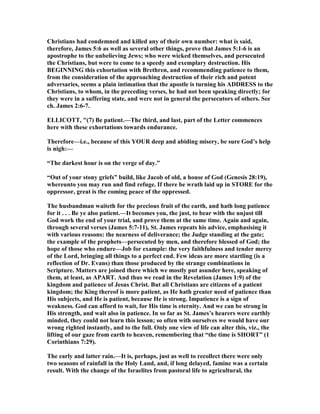
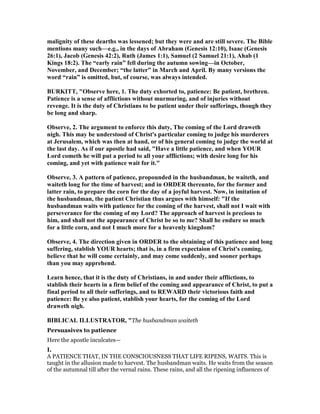
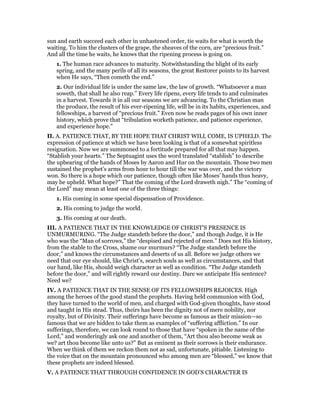
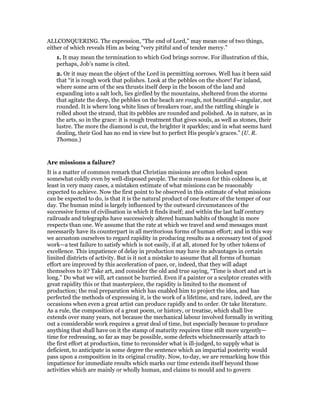
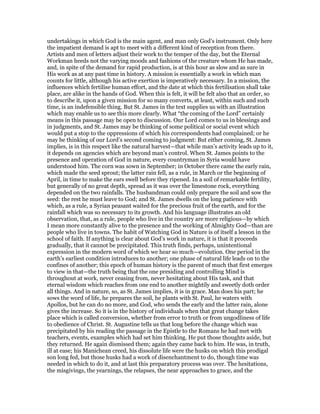
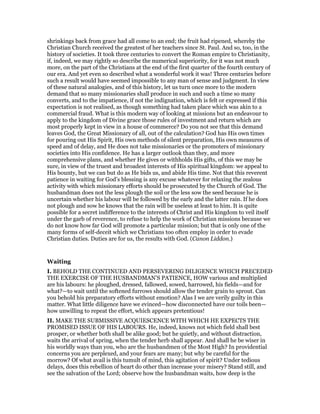
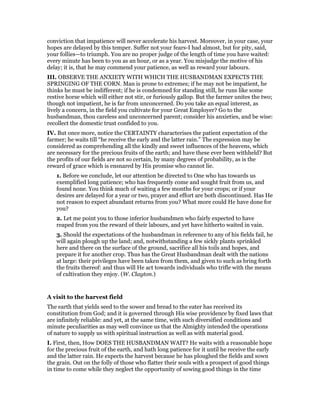
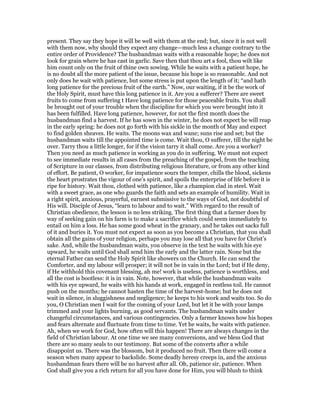
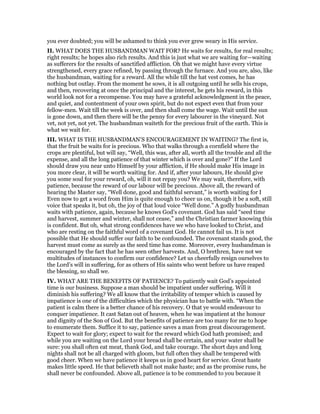
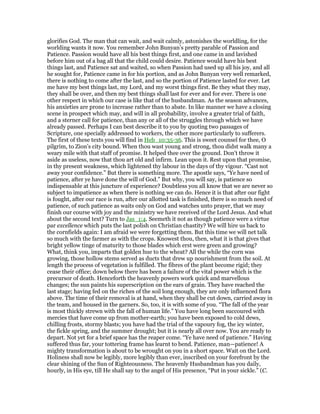
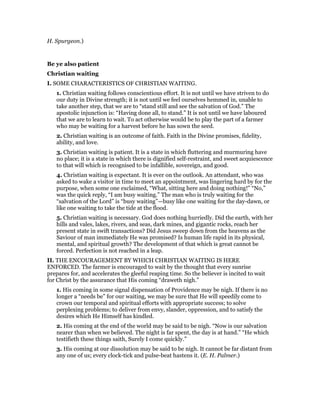
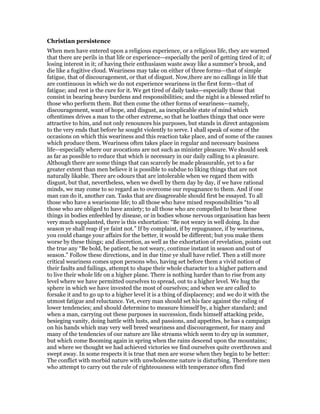
![themselves very tired of sitting and watching at the door of the mouth, and saying, “Let
your moderation be known [be made apparent] to all men.” They forget, they relax
vigilance, they faint; and the inordinate appetite which they have striven against for days
and weeks at once overtakes them, and they are swept away; and in looking back, when
they examine the tendencies of anger, and irritableness, and envy, and jealousy, and
avarice in the actual strifes of life, when they think of their relations to others, and of the
relative conditions of others and themselves, and when they, from year to year, mark
whether they grow in grace or not, it is not strange that weariness and discouragement
come over men. Then there is weariness in our social duties and relationships. In days of
sickness, in days of labour, and especially in days of poverty, when one can almost say,
“Heart and flesh have failed,” is it strange that there is discouragement? And is there no
need of the injunction, “Be not weary in well doing”? and of the promise, “In due season
ye shall reap, if ye faint not”? When dealing, not within the sacred precincts of the
family, but in our relations with those around us—with our neighbours, of every clime, of
every disposition, of every kind of education, and of every temperament—an amount of
forbearance, of patience, of gentleness, of wisdom, and ofgoodness is required that
cannot be measured in words. And when it becomes necessary to co-operate for the
public good, or for the good of special classes or conditions of men, human nature is a
thing that torments the patience. It is hard to bear with men, and it is hard to bear with
them just in the proportion in which they are strong and multiform in their nature. We
are disposed to be weary in doing good to others, so slow is the result of anything we
undertake in developing itself, so unfruitful is this result, and so material and
uninteresting are people. Is it the work of charity? To do good among those who need
you most—the poor and the ignorant—will require all the patience, all the gentleness, all
the self-denial that you can command. All men, therefore, who go out into the
community as reformers should bear in mind the difficulty of managing human nature,
and should remember that reformation is effectual only in proportion as it touches the
fundamental wants of men. The temperance reformation is slow, is intermittent, and has
its reactionary periods, because it strikes at the very strongest passions and appetites
which exist in human life. It is an attempt of goodness to overcome badness. It is a
promiscuous campaign carried on by all sorts of men. And the marvel is not that it is so
slow, but that it is so fast, and that there is so much in it that is permanent. To the end of
life and society, however, the work of temperance will be a thing to be done over and
over again; and every generation will have to go through precisely the same process. Yet
men must not be discouraged nor faint. Then, other men grow weary on account of
injudicious labours, on account of undertaking too much, and on account of constantly
attempting to work from wrong standards in themselves. Many a man works from the
impulse of praise; and as long as he is praised, not to say flattered, he is encouraged, and
works cheerfully; but when the praise ceases he begins to grow weary and discouraged,
and it seems to him as though life had lost its savour. Others work from the feeling of
pride; and so long as that feeling is gratified, and men look up to them, and show them
difference, and submit to their control, they are buoyant, and work willingly; but when
the gratification of their pride ceases, and men do not yield to them any longer, and they
are obliged to humble themselves before others, they grow weary. The trouble comes
from the fact that they are attempting to work from the standpoint of prominence and
dominance, and wish to be masters. Other men work because they have a sense of duty,
and a sense of duty ought to underlie every action of their life; nevertheless, if there is
nothing but a sense of duty, it is a hard master that grudges reward; for the sense of duty
increases with the performance of duty. The ideal of what we should be and should do
grows with actual attainment, so that a man will live for ever in the seventh chapter of
Romans, if his inspiration in life is for ever an inspiration of conscience or of duty. In](https://image.slidesharecdn.com/james5commentary-150623140637-lva1-app6891/85/James-5-commentary-91-320.jpg)
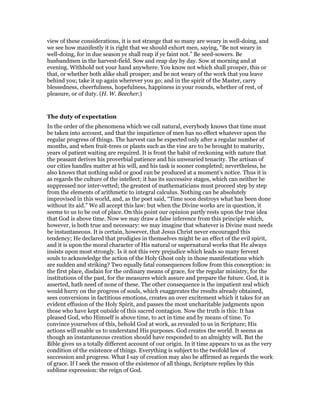
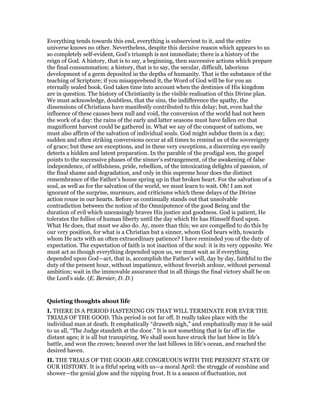
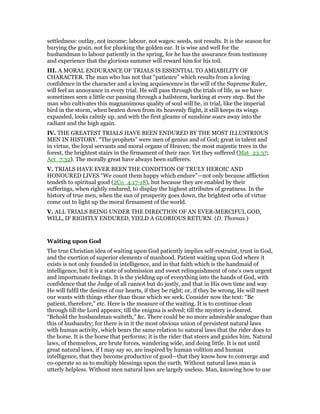
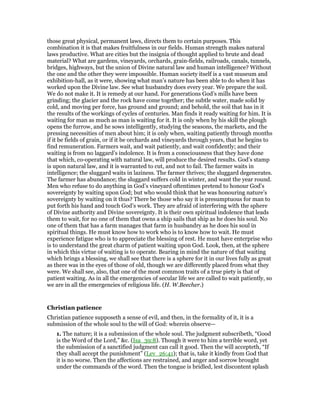
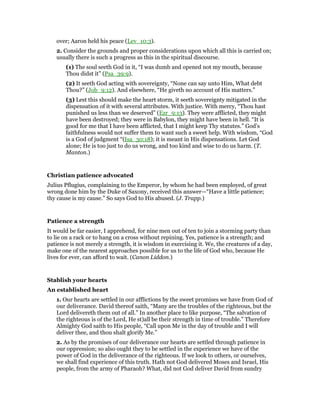
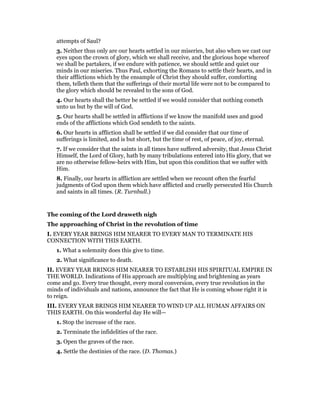
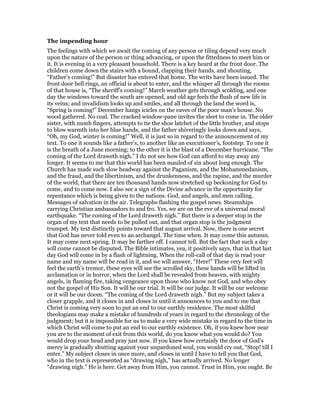
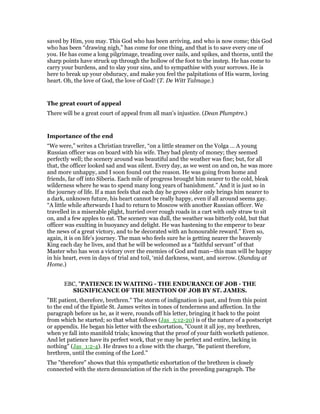
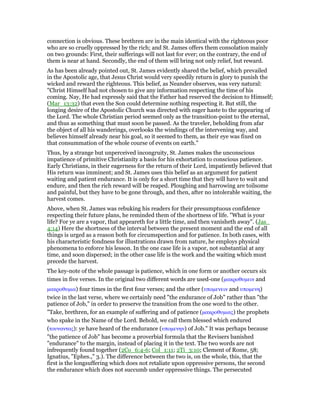
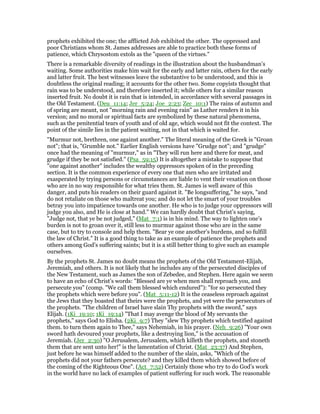
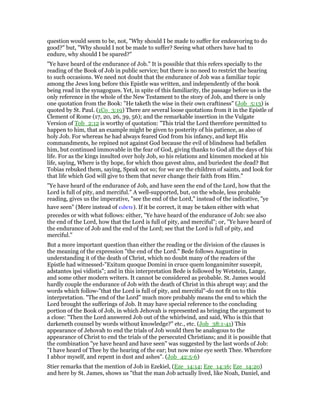
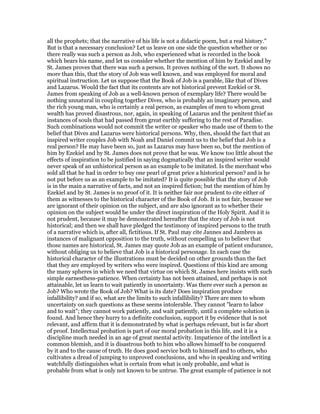
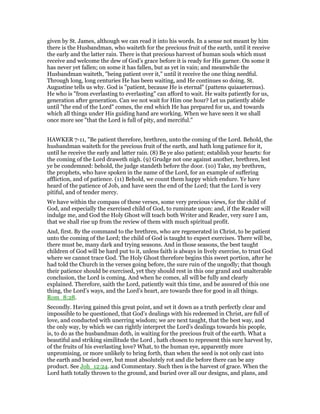
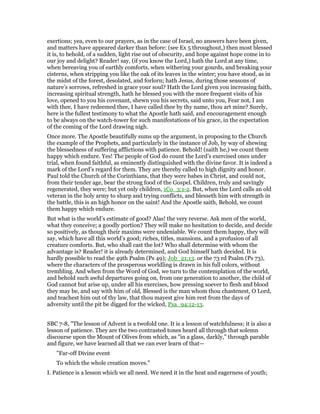
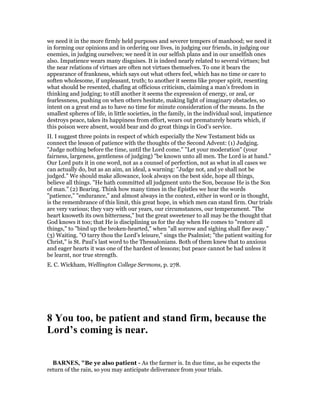
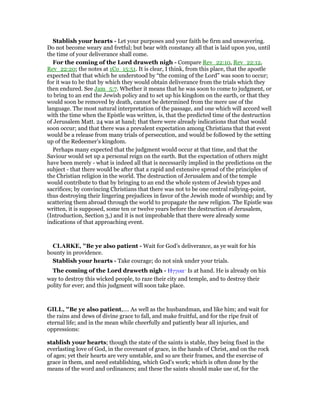
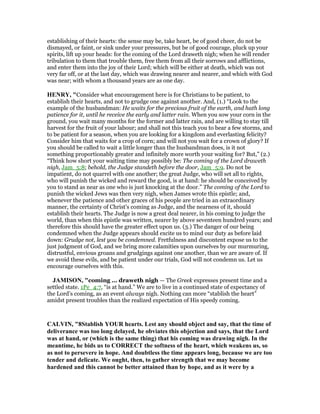
![realizing view of the near approach of our Lord.
COFFMA , "Be ye also patient; establish YOUR hearts: for the coming of the Lord
is at hand.
It is difficult not to lose patience with those commentators who receive every such
reference as this as an occasion for declaiming upon the "mistake" of all the ew
Testament writers in expecting the "coming of the Lord" (in his final advent, of
course) as an EVE T certain to occur in their lifetime. See extended discussion of
"The Speedy Return" of Christ, under 1 Thessalonians 1:10, in CT. The particular
"coming of the Lord" mentioned by James here was indeed "at hand." As James
would declare a little later, "The judge standeth before the doors" (James 5:9).
COKE, "James 5:8. For the coming of the Lord draweth nigh.— The apostle by this
phrase seems plainly to mean, the coming of the Romans to destroy or carry away
captive the Jewish nation: for what God in his providence promises, he himself is
very often said to do. See Matthew 27:33. Mark 13:29. Luke 21:20. Indeed it may be
asked, What other coming of the Lord was then drawing nigh? Is it not intimated,
James 5:1 that very great evils were just ready to fall upon the rich Jews? That they
would speedily be punished for their covetousness and luxury, and particularly for
their persecuting the Christians?—And it was about a year after the writing of this
epistle that the Jewish wars actually broke out, which ended in the destruction of
the Jewish nation. Well therefore might it now be said, that the coming of the Lord
drew nigh. This was a very proper motive by which to excite the Christians to
patience; for the Jews were their principal persecutors, and their destruction
approached swiftly. James 5:9. Grudge not, &c.] ΄η στεναζετε, groan not, from
anger or envy; complain not. Impatience toward each other is here condemned, as
impatience under the treatment which they met with from their enemies and
persecutors is condemned in the preceding verse; and the Judege might be at the
door, ready to condemn the guilty among the Christians, as well as to avenge them
of their adversaries.
ELLICOTT, "(8) The coming of the Lord draweth nigh.—Read thus, The presence
of the Lord is nigh. For the ancient belief in the nearness of Christ’s second advent,
see ote above, in James 5:3. The word used by the Apostle to describe its closeness
is the same as that used in Matthew 3:2, “The kingdom of heaven is at hand” The
afflicted are therefore to establish, or rather strengthen, their hearts. If “comfort”
retained its older sense, such would express the true idea. Comp. the great prophecy
of Israel’s consolation (Isaiah 40, et seq.).
9 Don’t grumble against one another, brothers](https://image.slidesharecdn.com/james5commentary-150623140637-lva1-app6891/85/James-5-commentary-109-320.jpg)
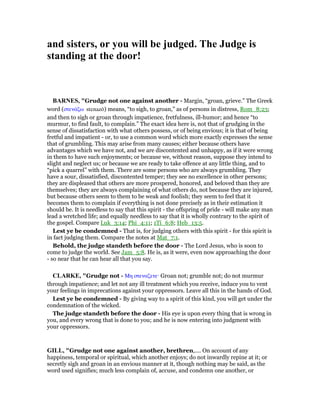
![meditate and seek revenge:
lest ye be condemned; hereafter, at the bar of Christ, by the Judge of the whole earth,
who is privy to the secret murmurings and grumblings, and the envious sighs and groans
of men; see Mat_7:1
behold the judge standeth before the door; there is another that judgeth, who is
the Lord, and he is at hand; he is just at the door; a little while and he will come, and not
tarry; which may refer not to Christ's coming to destroy Jerusalem, but to his second
coming to judgment, which will be quickly; for the Gospel times are the last times; there
will be no other age; at the end of this, Christ will come.
JAMISO , "Grudge not — rather “Murmur not”; “grumble not.” The Greek is
literally, “groan”: a half-suppressed murmur of impatience and harsh judgment, not
uttered aloud or freely. Having exhorted them to patience in bearing wrongs from the
wicked, he now exhorts them to a forbearing spirit as to the offenses given by brethren.
Christians, who bear the former patiently, sometimes are impatient at the latter, though
much less grievous.
lest ... condemned — The best manuscript authorities read, “judged.” James refers
to Mat_7:1, “Judge not lest ye be judged.” To “murmur against one another” is virtually
to judge, and so to become liable to be judged.
judge ... before the door — referring to Mat_24:33. The Greek is the same in both
passages, and so ought to be translated here as there, “doors,” plural. The phrase means
“near at hand” (Gen_4:7), which in the oldest interpretations [Targums of Jonathan and
Jerusalem] is explained, “thy sin is reserved unto the judgment of the world to come.”
Compare “the everlasting doors” (Psa_24:7, whence He shall come forth). The Lord’s
coming to destroy Jerusalem is primarily referred to; and ultimately, His coming again
visibly to judgment.
CALVI , "9Grudge not, or, groan not. As the complaints of many were heard, that
they were more severely treated than others, this passage is so explained by some, as
though James bade each to be contented with his own lot, not to envy others, nor
grudge if the condition of others was more tolerable. But I take another view; for
after having spoken of the unhappiness of those who distress good and quiet men by
their tyranny, he now exhorts the faithful to be just towards one another and ready
to pass by offenses. That this is the real meaning may be gathered from the reason
that is added: Be not querulous one against another; lest ye be condemned. We may,
indeed, groan, when any evil torments us; but he means an accusing groan, when
one expostulates with the Lord against another. And he declares that thus they
would all be condemned, because there is no one who does not offend his brethren,
and afford them an occasion of groaning. ow, if everyone complained, they would
all have accused one another; for no one was so innocent, that he did not do some
harm to others.
God will be the common judge of all. What, then, will be the case, but that every one
who seeks to bring judgment on others, must allow the same against himself; and
thus all will be given up to the same ruin. Let no one, then, ask for vengeance on](https://image.slidesharecdn.com/james5commentary-150623140637-lva1-app6891/85/James-5-commentary-111-320.jpg)
![others, except he wishes to bring it on his own head. And lest they should be hasty in
making complaints of this kind, he declares that the judge was at the door. For as
our propensity is to profane the name of God, in the slightest offenses we appeal to
his judgment. othing is a fitter bridle to CHECK our rashness, than to consider
that our imprecations vanish not into air, because God’s judgment is at hand.
COFFMA , "Murmur not, brethren, one against another, that ye be not judged:
behold, the judge standeth before the doors.
The judge standeth before the doors ... It is AGREED by all that "the judge" here is
Christ, thus justifying the conclusion that "the judge" mentioned a moment earlier
in James 4:12 is also Christ. As Roberts observed, "The clause reflects the very
words of Jesus (Mark 13:29; Matthew 24:33). The judge is Christ."[28]
Murmur not ... This is "grudge not" in the KJV, another example of words
changing their meaning. "Grudge has curiously changed its meaning from an
outward murmur to an inward feeling."[29] The type of murmuring which was
likely to have existed in the churches which originally received this letter was that of
complaining because so many years had passed and yet the old Sadducean
hypocrites were still totally in charge in Jerusalem. During the interval between the
governorships of Festus and Albinus, the wicked high priest Ananus seized the
OPPORTU ITY to murder James the author of this epistle.
He convened the judges and brought before them James a brother of Jesus who was
called Christ .... He accused him of having transgressed the law and delivered him
up to be stoned.[30]SIZE>
Unlike many early traditions, this one is generally received as being authentic.[31]
Punchard has this additional reference to it:
One of the mocking questions put to St. James by his enemies, as they hurried him
to death, was "Which is the door of Jesus?" Failing to receive an answer, they said,
"Let us stone this James the Just." So, they threw him from the pinnacle of the
temple, after which he was beaten to death with a fuller's club.[32]SIZE>
Thus, it is particularly interesting that James' words in this very verse were
mentioned on the occasion of his martyrdom.
Dummelow's paraphrase seems to be an accurate reflection of James' admonition in
this verse: "Do not let YOUR irritation and soreness at outside oppression vent
itself in impatience and grumbling towards one another."[33]
[28] J. W. Roberts, The Letter of James (Austin, Texas: The Sweet Publishing
Company, 1977), p. 154.
[29] E. G. Punchard, op. cit., p. 377.
[30] Flavius Josephus, Antiquities, 20:9. 1 (200).
[31] Jack P. Lewis, Historical BACKGROU DS of Bible History (Grand Rapids,](https://image.slidesharecdn.com/james5commentary-150623140637-lva1-app6891/85/James-5-commentary-112-320.jpg)
![Michigan: Baker Book House, 1971), p. 141.
[32] E. G. Punchard, op. cit., p. 377.
[33] J. R. Dummelow, op. cit., p. 1037.
ELLICOTT, "(9) Grudge not.—Say in preference, Murmur not. “Grudge” has
curiously changed its meaning from an outward murmur to an inward feeling. It
has unfortunately been retained both here and in 1 Peter 4:9. See also Psalms 59:15,
SPECIALLY the Prayer Book version, “They will . . . grudge if they be not
satisfied”—i.e., complain and murmur.
Lest ye . . .—It is not “lest ye be condemned,” but lest ye be judged, repeating the
exact words of the original in Matthew 7:1.
Behold, the judge standeth before the door.—Compare this scene with that depicted
in Revelation 3:20. In the one Christ lingers mercifully outside the door that “loves
its hinge”; fain would He E TER and abide. In the other He sounds a note of
alarm; men are “waked in the night, not girding their loins for a journey, but in
vague wonder at uncertain noise, who may turn again to their slumber,” or in
wistful listening wait in vain for the voice of mercy which shall plead with them no
more for ever (Ruskin).
One of the mocking questions put to St. James by his enemies, as they hurried him
to death, was, “Which is the door of Jesus?” And failing to receive an answer to
their mind, they said, “Let us stone this James the Just!” which they did, after they
had cast him over the Temple wall.
BURKITT, "Observe here, 1. A prohibiton, Grudge not one against another; that is,
do not murmur or repine, groan or grieve, as impatient men use to do under their
pressure; complain not of God, because the time of your deliverance is delayed:
thirst not after revenge against your persecutors, and envy not those who are
exercised with fewer troubles than yourselves: grudge not.
Observe, 2. The enforcement of this prohibition from the danger of the fact, lest ye
be condemned. As if he had said, "Impatience and discontent, envy and distrust,
will expose you to greater miseries than you complain of: Your sufferings here are
but for your probation, but your grudging and repining will be your
condemnation."
Observe, 3. The anticipation or forestalling of an objection, which some might make.
What! must we suffer, and may we not complain? Must we, by tamely bearing many
affronts, invite more, and revenge none?" Yes, says the apostle, be patient, and
commit your cause to him that judegeth righteously; for Behold the Judge standeth
before the door.
Where OTE, 1. A Judge, the supreme and U IVERSAL Judge, Jesus Christ, who](https://image.slidesharecdn.com/james5commentary-150623140637-lva1-app6891/85/James-5-commentary-113-320.jpg)
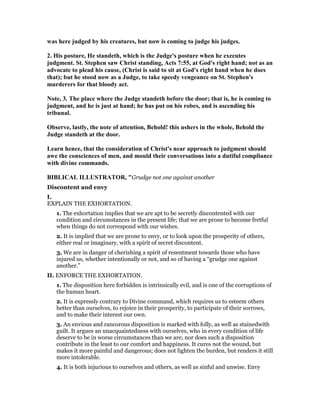
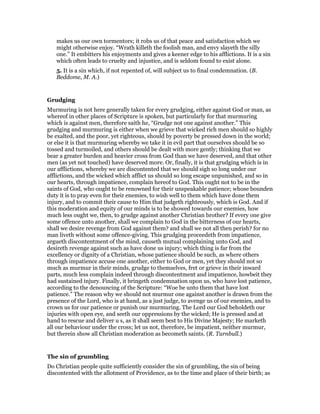
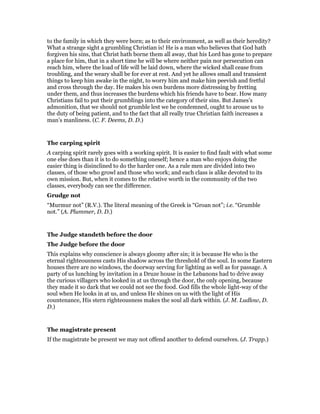
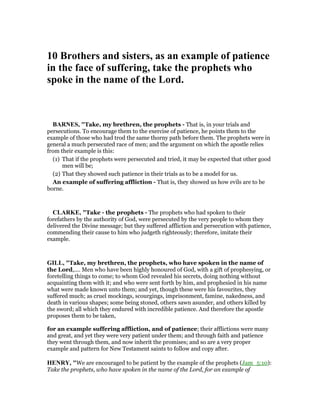
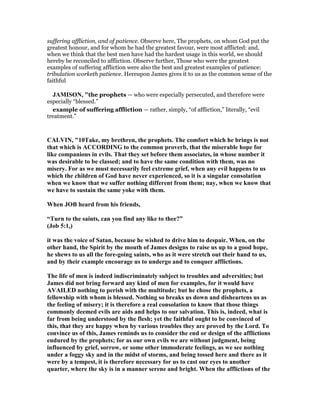
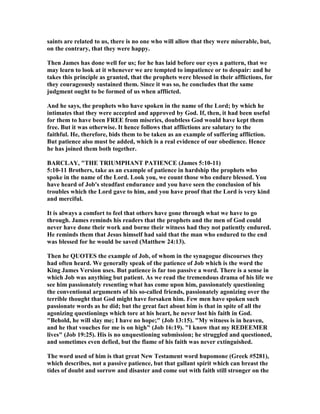
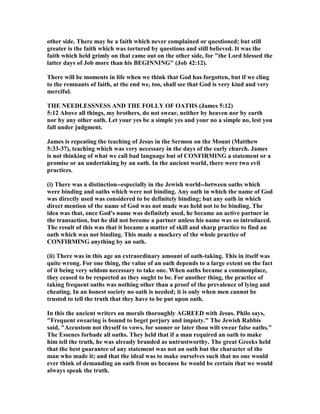
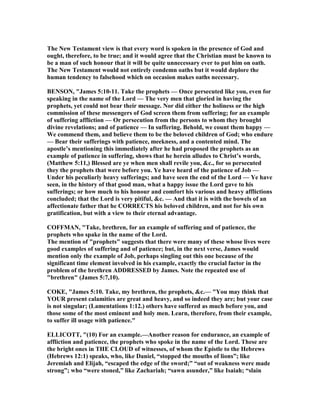
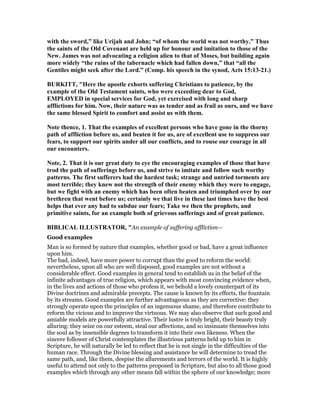
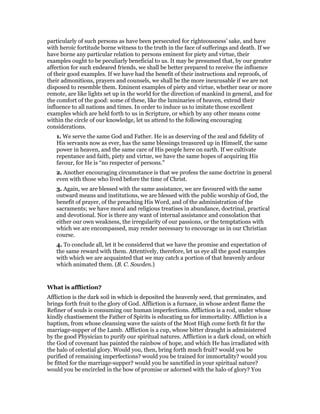
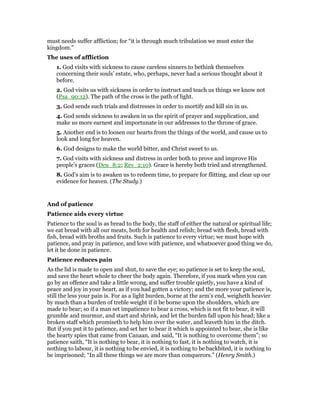
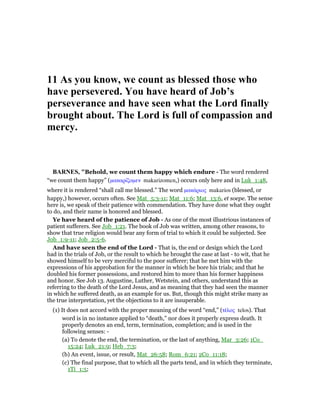
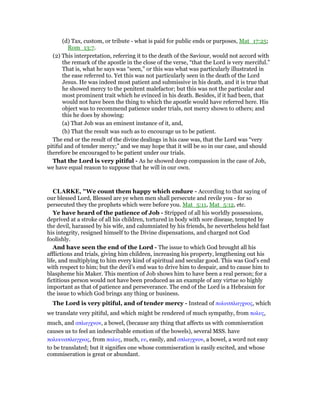
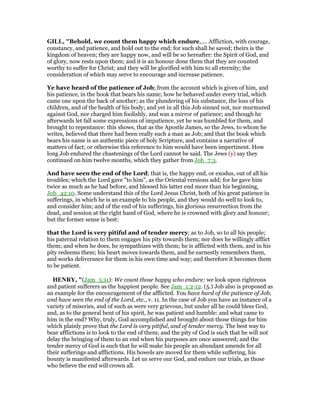
![JAMISO , "count them happy — (Mat_5:10).
which endure — The oldest authorities read, “which have endured,” which suits the
sense better than English Version: “Those who in past days, like the prophets and Job,
have endured trials.” Such, not those who “have lived in pleasure and been wanton on
the earth” (Jam_5:5), are “happy.”
patience — rather, “endurance,” answering to “endure”: the Greek words similarly
corresponding. Distinct from the Greek word for “patience” Jam_5:10. The same word
ought to be translated, “endurance,” Jam_1:3. He here reverts to the subject which he
began with.
Job — This passage shows the history of him is concerning a real, not an imaginary
person; otherwise his case could not be quoted as an example at all. Though he showed
much of impatience, yet he always returned to this, that he committed himself wholly to
God, and at last showed a perfect spirit of enduring submission.
and have seen — (with the eyes of your mind). Alford translates from the old and
genuine reading, “see also,” etc. The old reading is, however, capable of being translated
as English Version.
the end of the Lord — the end which the Lord gave. If Job had much to “endure,”
remember also Job’s happy “end.” Hence, learn, though much tried, to “endure to the
end.”
that — Alford and others translate, “inasmuch as,” “for.”
pitiful ... of tender mercy — The former refers to the “feeling”; the latter, to the
act. His pity is shown in not laying on the patient endurer more trials than he is able to
bear; His mercy, in His giving a happy “end” to the trials [Bengel].
CALVI , "11The patience of Job. Having spoken generally of the prophets, he now
refers to an example remarkable above others; for no one, as far as we can learn
from histories, has ever been overwhelmed with troubles so hard and so various as
JOB; and yet he emerged from so deep a gulf. Whosoever, then, will imitate his
patience, will no doubt find God’s hand, which at length delivered him, to be the
same. We see for what end his history has been written. God suffered not his servant
Job to sink, because he patiently endured his afflictions. Then he will disappoint the
patience of no one.
If, however, it be asked, Why does the Apostle so much commend the patience of
Job, as he had displayed many signs of impatience, being carried away by a hasty
spirit? To this I reply, that though he sometimes failed through the infirmity of the
flesh, or murmured within himself, yet he ever surrendered himself to God, and was
ever willing to be restrained and ruled by him. Though, then, his patience was
somewhat deficient, it is yet deservedly commended.
The end of the Lord. By these words he intimates that afflictions ought ever to be
estimated by their end. For at first God seems to be far away, and Satan in the
meantime revels in the confusion; the flesh suggests to us that we are forsaken of
God and lost. We ought, then, to extend our view farther, for near and around us](https://image.slidesharecdn.com/james5commentary-150623140637-lva1-app6891/85/James-5-commentary-128-320.jpg)
![there appears no light. Moreover, he has called it the end of the Lord, because it is
his work to give a PROSPEROUS issue to adversities. If we do our duty in bearing
evils obediently, he will by no means be wanting in performing his part. Hope
directs us only to the end; God will then shew himself very merciful, how ever rigid
and severe he may seem to be while afflicting us. (140)
COFFMA , "Behold, we call them blessed that endured: ye have heard of the
patience of Job, and have seen the end of the Lord, how that the Lord is full of pity,
and merciful.
We call them blessed that endured ... The true meaning of "patience" in this section
is inherent in this. In the sense of stoicism, Job would hardly classify as "patient";
however, he endured despite every temptation.
The patience of Job ... "Job is mentioned only here in the ew Testament,"[34]
however, the book of Job is QUOTED in 1 Corinthians 3:19, which refers to Job
5:13.
The Lord is full of pity, and merciful ... Punchard suggested that James here "in the
fullness of his gratitude, COI ED a word for this single phrase. `Great-hearted'
would be close to its meaning,"[35]
The particular purpose served by the I TRODUCTIO of Job as an example here
was explained by James Moffatt thus:
(The point of this is that) patient endurance can sustain itself on the conviction that
hardships are not meaningless, but that God has some end or purpose in them
which he will accomplish.[36]SIZE>
The marvelous endurance of Job's faith in God is inherently visible in his reaction
to one disaster after another. When death overtook his family, he said, "The Lord
gave, and the Lord hath taken away. Blessed be the name of the Lord" (Job 1:21).
When even his wife suggested that he curse God and die, he said, "What, shall we
receive good at the hand of God, and shall we not receive evil?" (Job 2:10). When
his philosophical friends accused him of sin, citing the calamities which had
overwhelmed him as proof of it, he said, "Though he slay me, yet will I trust him"
(Job 13:15).
[34] Walter W. Wessel, op. cit., p. 962.
[35] E. G. Punchard, op. cit., p. 378.
[36] James Moffatt, The Moffatt ew Testament Commentary, James (Garden City,
.Y.: 1928), p. 74.
COKE, "James 5:11. Behold, we count them happy which endure.— "Do we look
upon them as forsaken of God, because they were persecuted for righteousness'
sake? Or will any wise person say, that their sufferings were any token of the divine
displeasure?—On the contrary, Behold we applaud such martyrs and confessors,](https://image.slidesharecdn.com/james5commentary-150623140637-lva1-app6891/85/James-5-commentary-129-320.jpg)
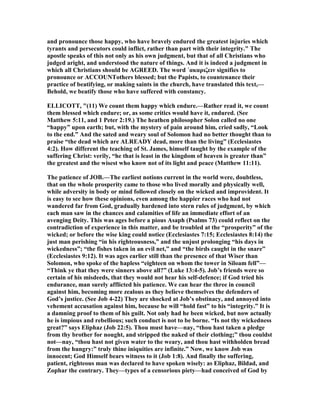
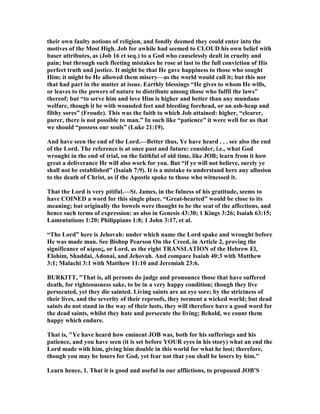
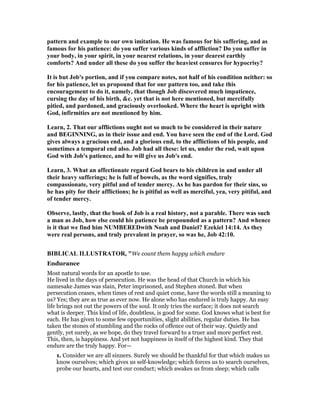
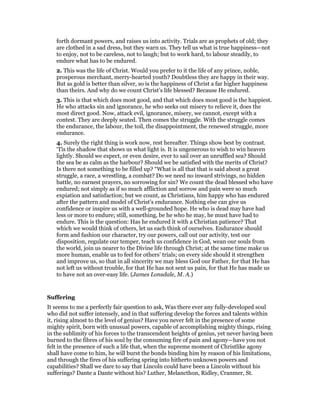
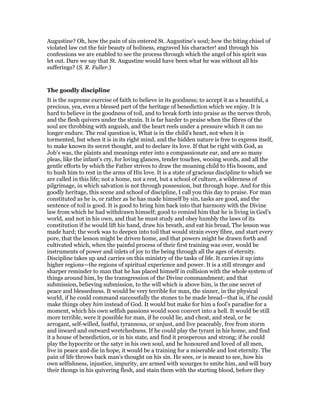
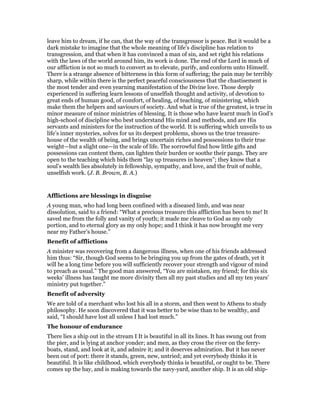
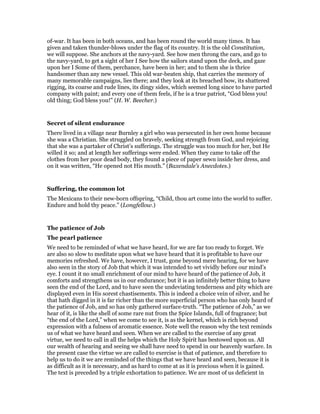
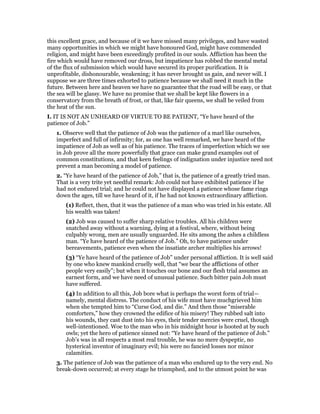
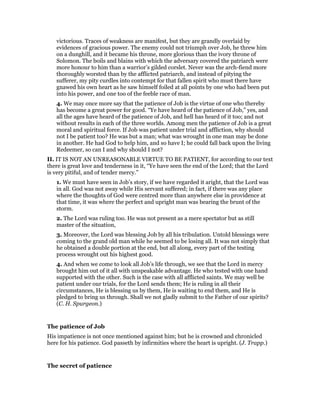
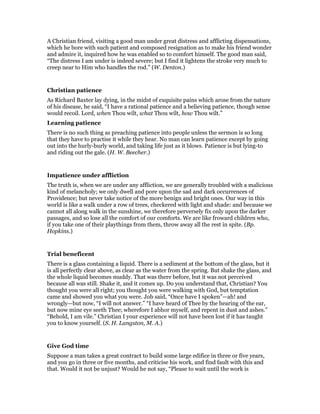
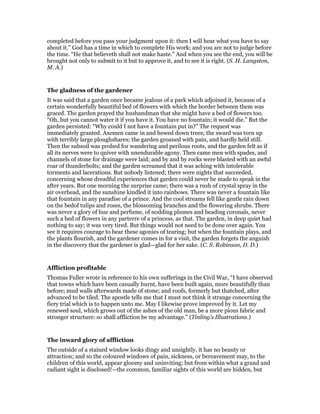
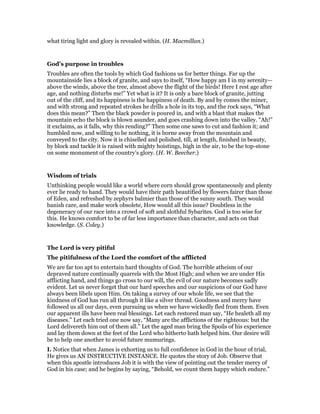
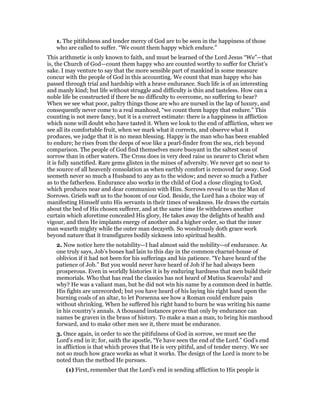
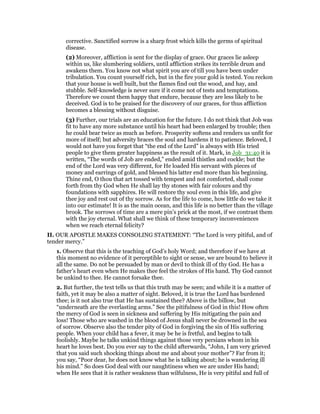
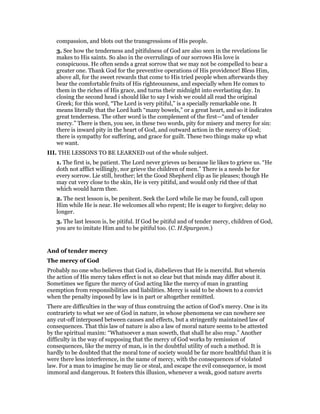
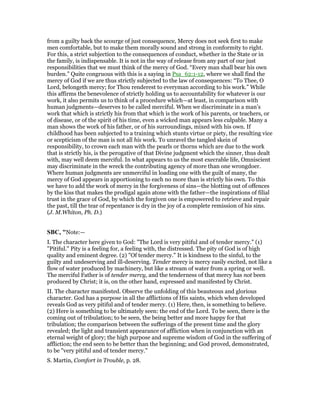
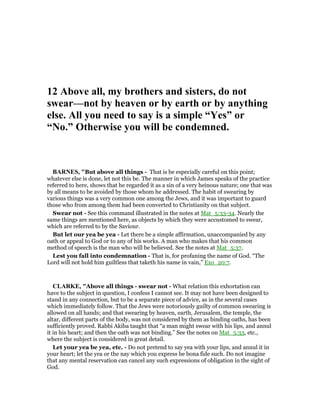
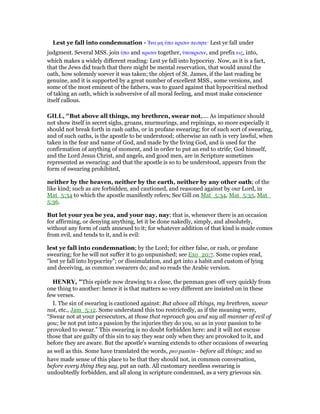
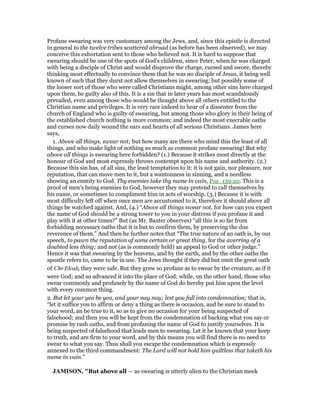
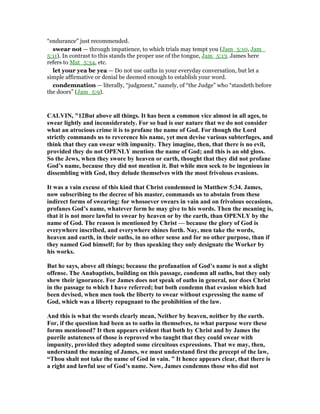
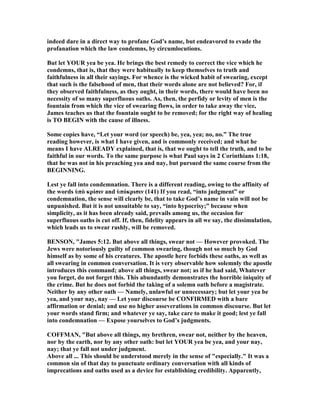
![many to whom James wrote were guilty of this, hence the emphasis upon it.
Dummelow's paraphrase is: "Avoid especially the use of an oath to strengthen your
assertions in ordinary conversation."[37] The words "above all" have the additional
utility of identifying the admonition here as having been given originally by the
Lord Jesus Christ himself (Matthew 5:34,37). Agreement is felt with Roberts and
many others who have insisted that "This passage has nothing to do with solemn
and serious and religious oaths."[38] Christ himself permitted himself to be placed
under oath for his Great Confession (Mark 14:61,62). The inherent CO ECTIO
of this verse with the foregoing is plain in that it was dealing with the demeanor and
attitude of those awaiting "the coming of the Lord" in judgment against Jerusalem.
For fuller discussion of the question of oaths, see in my Commentary on Matthew, p.
67.
[37] J. R. Dummelow, op. cit., p. 1037.
[38] J. W. Roberts, op. cit., p. 155.
COKE, "James 5:12. But above all things—swear not,— Some consider this verse as
joined to what goes before, to intimate that they were to be aware of impatience, and
particularly as it might lead them into rash and profane swearing, as men in a
passion are more apt to swear. The δε, but, favours this connection; though as the
word δε is often used by way of transition only, and this has so much the air of a
general rule, it may well be considered as such, and as distinct from the rest. They
were not to swear profanely at any time, either in affliction or prosperity; and
ACCORDI GLY the apostle here very strongly condemns the vice in general.
When he says, Above or before all things, swear not, it is not to be supposed that he
reckons this as the greatest of all crimes; but he condemns it in an earnest manner,
as one very great vice to which the Jews were remarkably addicted, and as a horrid
habit which required much care and attention to shake it off. See what has been said
on this subject, Matthew 5:33-37.
ELLICOTT, "(12) The question of the lawfulness of oaths has oftentimes perplexed
alike the DOCTORS of the Church and its simpler hearers of God’s word. The text,
taken as it stands, would support the views of the Essenes, and many of the
Paulicians, and other ancient sectaries. With equal force it might be urged by the
followers of Peter Waldo, or the Unitas Fratrum (the Moravians), or the Society of
Friends.
Swear not.—The words are put quite distinctly in Greek and English—neither by
the heaven, nor by the earth. And it sounds like special pleading, worthy of a rabbi,
to hear such a divine as Huther say that “swearing by the name of God is not
mentioned,” nor accordingly is such an oath prohibited. “We must not imagine,” he
CO TI UES (and his argument had best be fairly given), “that this is included in
the last member of the clause, the Apostle evidently intending by it (i.e., ‘neither by
any other oath’) to point only at certain formulæ, of which several are mentioned in
Matthew 5:34-37. Had he intended to forbid swearing by the name of God he would
most certainly have mentioned it expressly; for not only is it in the Law, in](https://image.slidesharecdn.com/james5commentary-150623140637-lva1-app6891/85/James-5-commentary-151-320.jpg)
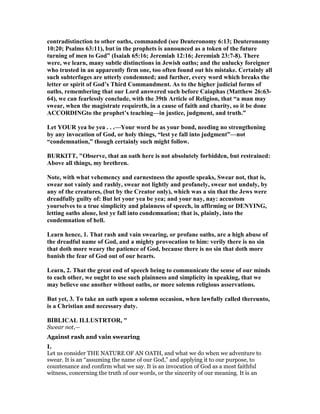
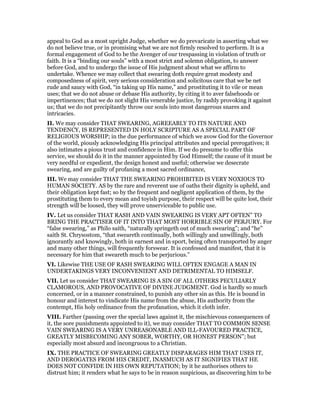
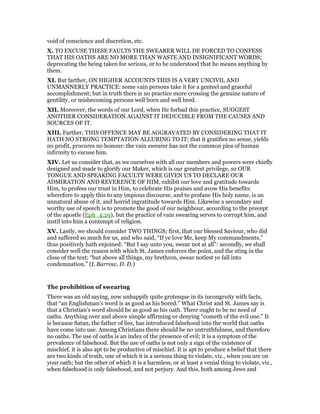
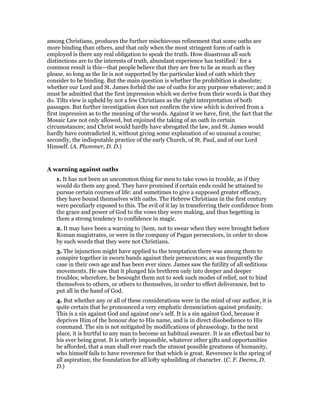
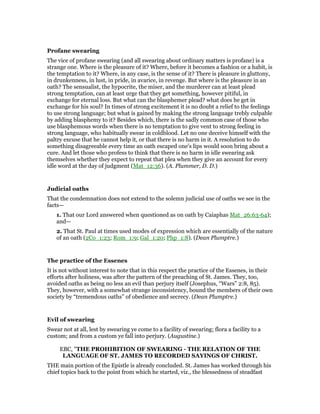
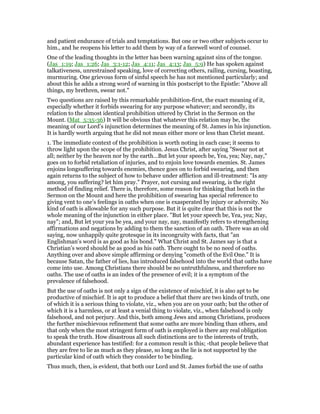
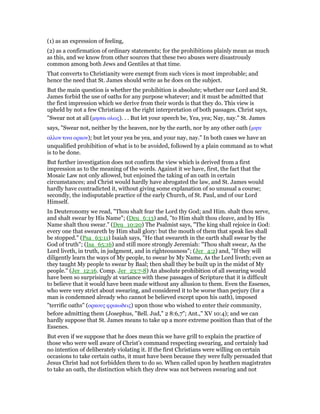
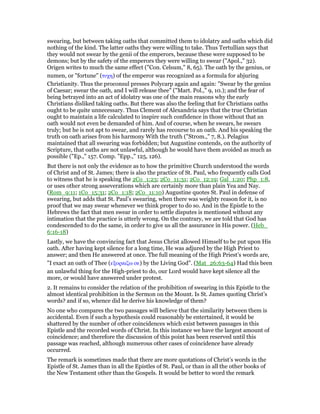
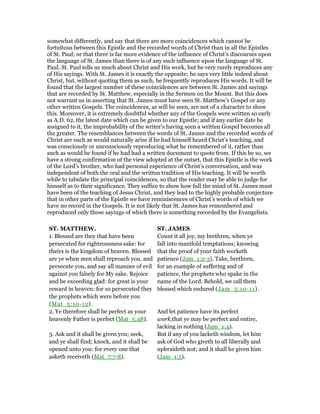
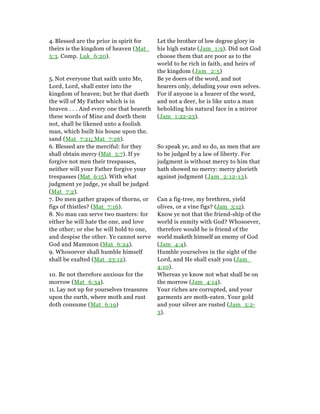
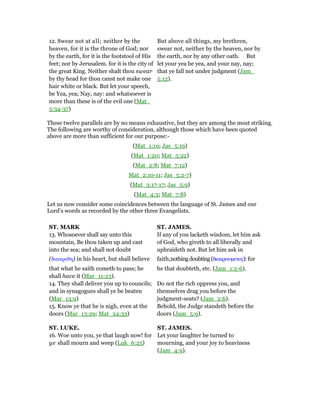
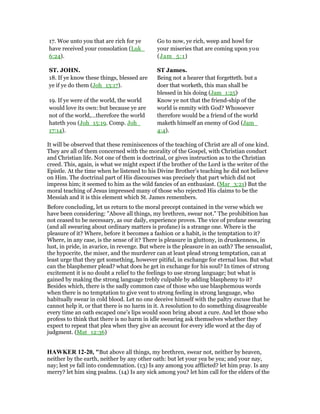
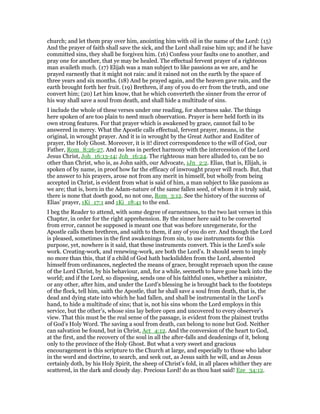
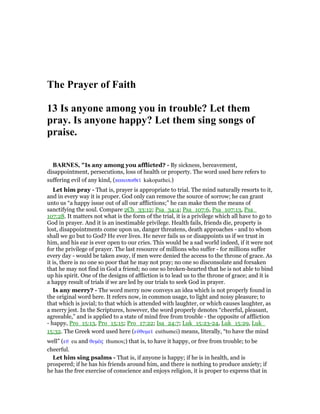
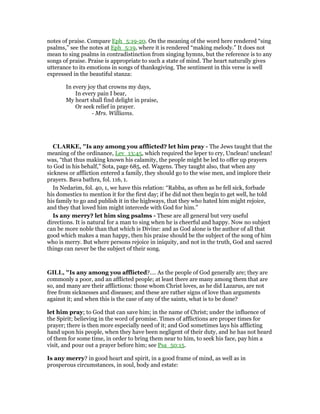
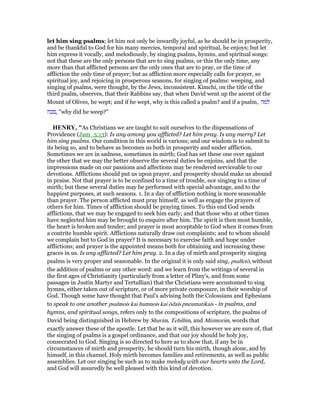
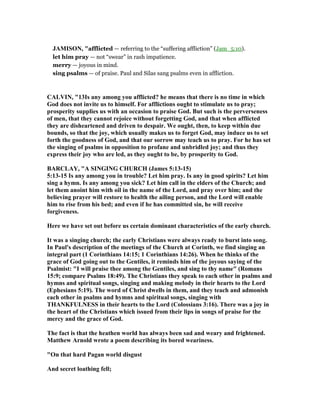
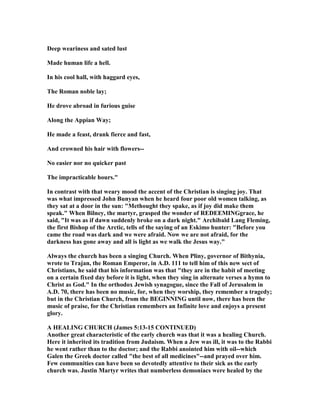
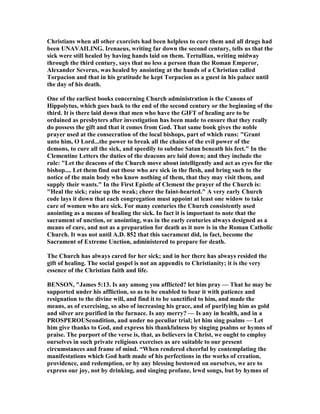
![praise and thanksgivings offered to God for all his mercies, Ephesians 5:18-19. On
the other hand, when afflicted, we are to pray; that being the best means of
producing in ourselves patience and resignation. But as the precept concerning our
singing psalms, when cheerful, does not imply that we are not to pray then; so the
precept concerning prayer in affliction, does not imply that we are not to express
our joy in suffering ACCORDI G to the will of God, by singing psalms or hymns,
as Paul and Silas did in the jail at Philippi.” — Macknight.
COFFMA , "Is any among you suffering? let him pray. Is any cheerful? let him
sing praise.
Here BEGI S a series of separate admonitions making up the final section of the
epistle.
Any suffering? ... let him pray ... This was, and is, the general rule for suffering of
all kinds; and it included even the SPECIAL cases alluded to in James 5:14 a
moment later. In a sense, all healing is divine. Over the main portal of the great
Presbyterian Medical Center in Manhattan, .Y., there are engraved the words:
"All healing is of God; physicians only bind up the wounds."
Any cheerful? ... let him sing praise ... Singing, from the earliest ew Testament
times, was used by the church for the purpose of sanctifying times of emotion,
whether joyful or sorrowful. As Harper pointed out, "Christian singing is supposed
to be the medium of the light and joyful as well as more serious sentiments."[39]
It is regrettable that commentators, for example, Tasker, and others drag into the
interpretation of this verse an attempted justification of instrumental music in
Christian worship, thus:
[@Psallo] originally meant to play by touching a stringed instrument ... it describes
the stirring of the soul ... it refers to every sounding of God's praises, whether in the
company of others or alone, whether vocally with or without musical
accompaniment, or silently.[40]SIZE>
It is a fact eloquently stated by F. F. Bruce that (concerning the Greek words
[@psallo] and [@psalmos] as used in this place) "Both are irrelevant to the question
of instrumental accompaniment, one way or the other."[41] For those interested in
pursuing the subject further, the scholarly work of J. W. Roberts settles the
question completely. " othing in the context indicates a meaning other than that of
vocal music."[42] o matter what the "original meaning" of [@psallo] might have
been, the instrument to be "plucked" is given in the sacred text; and it is not a
mechanical instrument, but the human voice.
God's church is a singing church. As early as 111 A.D., when Pliny wrote the
Emperor Trajan that the Christians assembled very "early on a fixed day and sang
by turns a hymn to Christ as God,"[43] until the present day, the churches of Christ
ring with the songs of praise and adoration. What a contrast this is with every other
religion ever known!](https://image.slidesharecdn.com/james5commentary-150623140637-lva1-app6891/85/James-5-commentary-171-320.jpg)
![In the orthodox Jewish synagogue, since the fall of Jerusalem in A.D. 70, there has
been no music, for, when they worship, they remember a tragedy; but, in the
Christian church, from the BEGI I G until now, there has been the music of
praise.[44]SIZE>
The Moslem shouts from his minaret at morning, noon and night, "To prayer! To
prayer!" The pagan temples for centuries resounded to the brassy cacophony of
trumpets and horns. The primitives of the African interior beat their tom-toms.
Only the Christian sings!
[39] A. F. Harper, op. cit., p. 245.
[40] R. V. G. Tasker, op. cit., p. 128.
[41] F. F. Bruce, Answers to Questions (Grand Rapids, Michigan: Zondervan
Publishing House, 1972), p. 107.
[42] J. W. Roberts, op. cit., p. 163.
[43] Henry Bettenson, Documents of the Christian Church ( ew York and London:
Oxford U IVERSITY Press, 1947), p. 6.
[44] William Barclay, op. cit., p. 129.
COKE, "James 5:13. Is any among you afflicted? &c.— These two directions
concerning prayer when they were afflicted, and praise when they were easy and
cheerful, seem to refer to private devotion, and not to their public worship: for if
one person was afflicted, and another quite easy, what might suit one, would,
ACCORDI G to this rule of the apostle, have been unfit for the other: accordingly
it is put in the singular number.
ELLICOTT, "(13) We now pass on to advice of different kinds—to the heavy-laden
or light-hearted, to the suffering and afflicted. Prayer is to be the refuge of one,
praise the safeguard of another; the whole life is to revolve, as it were, around the
throne of God, whether in the night of grief or day of joy.
Let him pray.— o worthier comment can be found than Montgomery’s hymn—
“Prayer is the burden of a sigh,
The falling of a tear,
The upward glancing of an eye,
When none but God is near.”
Long petitions, or many, cannot be always made; mind and body may be too weak
and ill; but ejaculations—“Arrows of the Lord’s deliverance,” as Augustine called](https://image.slidesharecdn.com/james5commentary-150623140637-lva1-app6891/85/James-5-commentary-172-320.jpg)
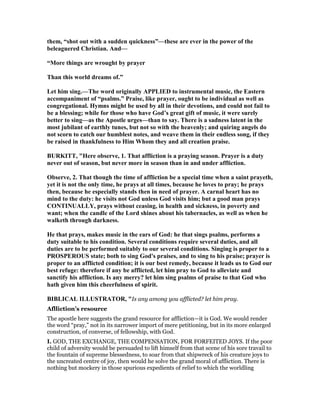
![resorts. But there is ineffable beatitude in God. What a transition! From “broken
cisterns, which can hold no water,” to “the fountain of living waters”; from fallacious and
treacherous joys to the fountain of perennial joy; from the very wreck and demolition of
earthly hopes to Him who is the sun and consummation of all hope. Even believers are
slow to make God their prime solace. They are prone to transfer themselves to some new
idol when one has been taken away; to dear with a morbid tenacity on visions of the
past; to feed on the dust and ashes of their own profuse lamentations—the morose
wakings of excessive grief. To all such the watchword prescribes itself—Betake you to
God.
II. GOD, THE CENTRE OF THE SOUL’S FELLOWSHIP. It is very marked, in the
history of affliction, what a charm communion of mind with mind exerts. If there be any
unison of sentiment at all, the reciprocity which occurs is most congenial; in point of fact
it is one of the expedients to which affliction betakes itself to arrest the converse of
kindred minds. There is probably no more potent creature resource. And we have only to
estimate what a transcendent charm must lie in fellowship with God, in communion
with Him who is consummate wisdom and excellence, and truth and benignity.
III. GOD, THE FOUNTAIN OF EXHAUSTLESS SYMPATHIES. There is nothing which
exerts such a charm in the hour of adversity as tender, sensitive fellow-feeling. And
hence the downcast and sorrowful seek some sympathetic bosom into which they may
pour their griefs. But for a sympathy surpassing all other sympathies, we point you to
Christ. Repair to that bosom, all fraught with fellow-feeling; throw thyself into the
embrace of that yearning tenderness.
IV. GOD, A PRESENT HELP IN TROUBLE. There are two aspects in which this holds
good. On the one hand, God is specially ready to ]end His ear in the day of His people’s
affliction; and, next, the succour which He supplies is specially adapted to their
emergency. (Adam Forman.)
Prayer in affliction
The family of the afflicted is a large one, and a wide-spread one. It forms a great nation
on the earth; and its members are to be found in every country, and in every rank and
condition of life. It is an old nation. The first human beings were the first members of it;
and an unbroken succession has kept it up ever since. This is the one nation in the world
that shows no symptom of decline or fall. It is an honourable nation. There was One
belonged to it whose name hallows it: our Blessed Redeemer was a Man of sorrows. The
wisest of men found that in much wisdom is much grief. Great forms of majesty: the just
whose memory is blessed, the kind whose memory is loved, the ancient seer, the inspired
apostle, the crowned martyr rise before the mind as it recalls the past, and reads the long
roll of afflicted men. It is our own nation. Affliction is the birthright of all. Some of you
feel it is so at this moment. Many have found it so, in the experience of departed days.
All will find it so, sooner or later. “Is any among you afflicted? Let him pray.” This is not
the prescription of mere worldly wisdom, for the cure of great grief. There is no difficulty
in this world in finding people who will give you advice as to what you ought to do, when
great sorrow comes your way; Try change of scene, they will say; Go to places that
suggest no sad associations and call up no bitter thoughts: Open your heart to the tide of
cheerfulness that is flowing all around you. Or perhaps they may say, Go into society.
Mix with your fellow-men. Or they will bid you trust to time—time the never-failing
comforter. Or, if nothing else will do—if your affliction be one that clings to your life, and
makes the condition of your being—then the worldly counsel would be to bear your grief](https://image.slidesharecdn.com/james5commentary-150623140637-lva1-app6891/85/James-5-commentary-174-320.jpg)
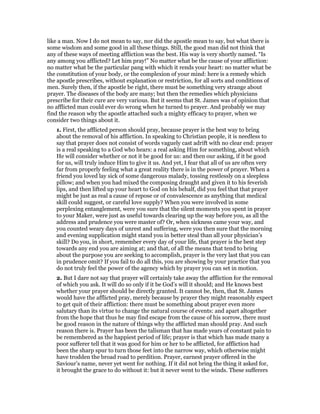
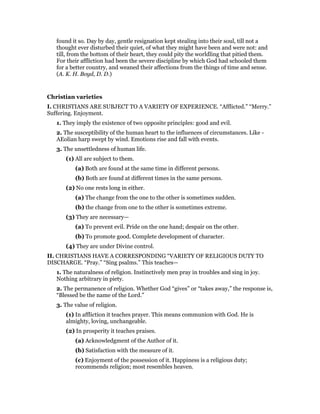
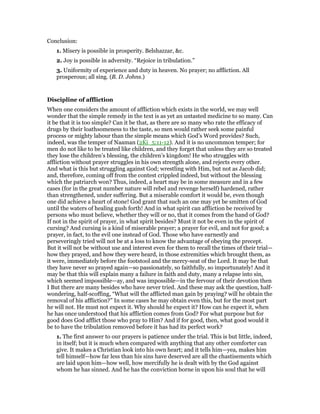
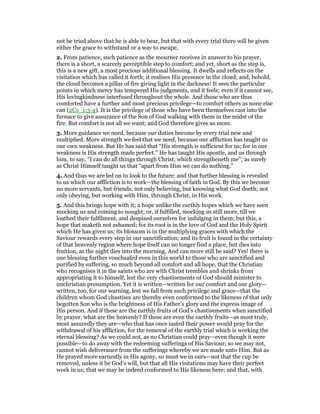
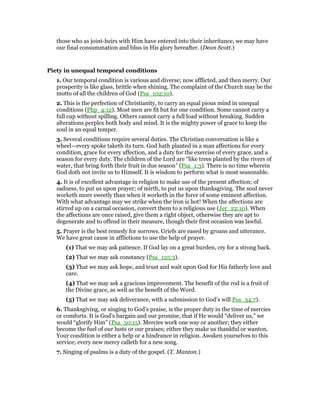
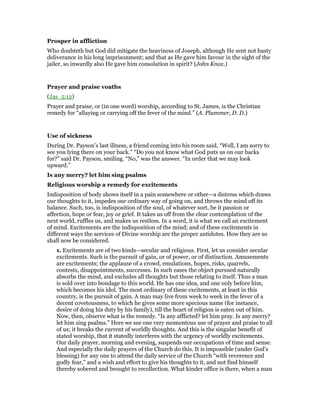
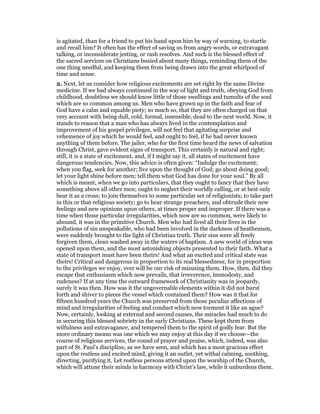
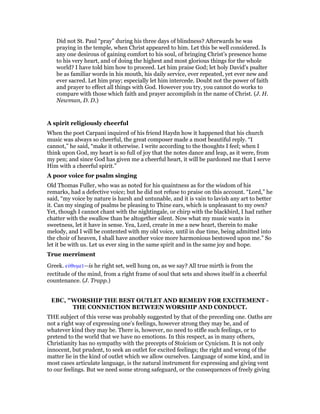
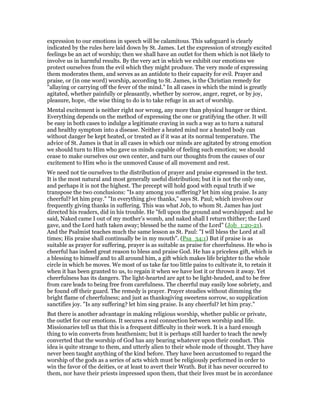
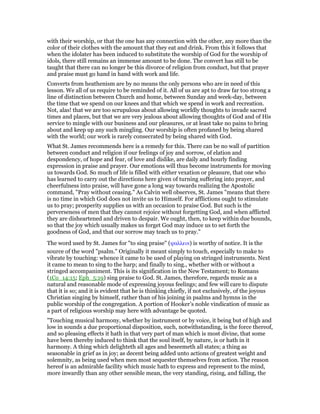
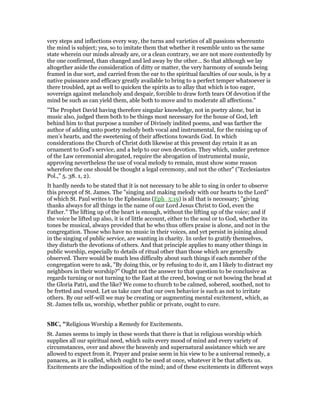
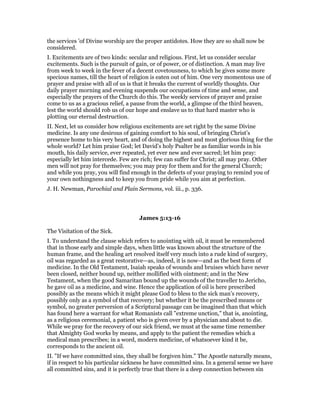
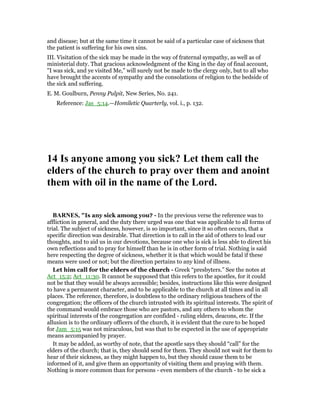
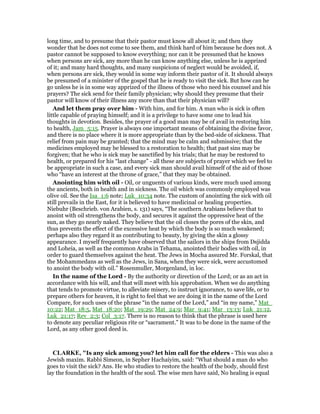
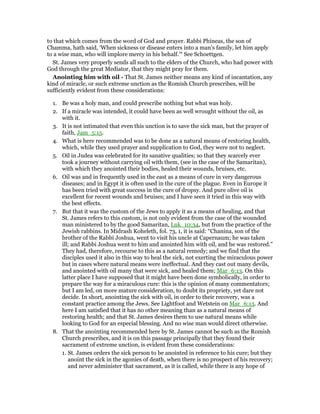
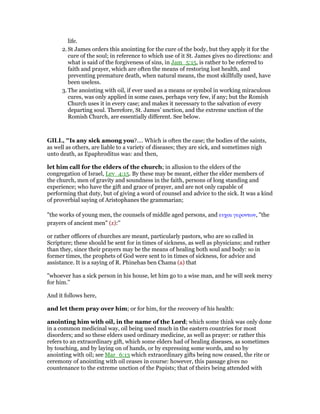
![many customs and ceremonies, which are not here made mention of; that being used, as
is pretended, for the healing of the souls of men, whereas this was used for corporeal
healing; that is only performed when life is despaired of, and persons are just going out
of the world; whereas this was made use of to restore men to health, and that they might
continue longer in it, as follows.
HE RY, "We have particular directions given as to sick persons, and healing
pardoning mercy promised upon the observance of those directions. If any be sick, they
are required, 1. To send for the elders, presbuterous tēs ekkēsias - the presbyters, pastors
or ministers of the church, Jam_5:14, Jam_5:15. It lies upon sick people as a duty to
send for ministers, and to desire their assistance and their prayers. 2. It is the duty of
ministers to pray over the sick, when thus desired and called for. Let them pray over
him; let their prayers be suited to his case, and their intercessions be as becomes those
who are affected wit his calamities. 3. In the times of miraculous healing, the sick were
to be anointed with oil in the name of the Lord. Expositors generally confine this
anointing with oil to such as had the power of working miracles; and, when miracles
ceased, this institution ceased also. In Mark's gospel we read of the apostle's anointing
with oil many that were sick, and healing them, Mar_6:13. And we have accounts of this
being practiced in the church two hundred years after Christ; but then the gift of healing
also accompanied it, and, when the miraculous gift ceased, this rite was laid aside. The
papists indeed have made a sacrament of this, which they call the extreme unction. They
use it, not to heal the sick, as it was used by the apostles; but as they generally run
counter to scripture, in the appointments of their church, so here they ordain that this
should be administered only to such as are at the very point of death. The apostle's
anointing was in order to heal the disease; the popish anointing is for the expulsion of
the relics of sin, and to enable the soul (as they pretend) the better to combat with the
powers of the air. When they cannot prove, by any visible effects, that Christ owns them
in the continuance of this rite, they would however have people to believe that the
invisible effects are very wonderful. But it is surely much better to omit this anointing
with oil than to turn it quite contrary to the purposes spoken of in scripture. Some
protestants have thought that this anointing was only permitted or approved by Christ,
not instituted. But it should seem, by the words of James here, that it was a thing
enjoined in cases where there was faith for healing. And some protestants have argued
for it with this view. It was not to be commonly used, not even in the apostolical age; and
some have thought that it should not be wholly laid aside in any age, but that where
there are extraordinary measures of faith in the person anointing, and in those who are
anointed, an extraordinary blessing may attend the observance of this direction for the
sick. However that be, there is one thing carefully to be observed here, that the saving of
the sick is not ascribed to the anointing with oil, but to prayer:
JAMISO , "let him call for the elders — not some one of the elders, as Roman
Catholics interpret it, to justify their usage in extreme unction. The prayers of the elders
over the sick would be much the same as though the whole Church which they represent
should pray [Bengel].
anointing him with oil — The usage which Christ committed to His apostles was
afterwards continued with laying on of hands, as a token of the highest faculty of
medicine in the Church, just as we find in 1Co_6:2 the Church’s highest judicial
function. Now that the miraculous gift of healing has been withdrawn for the most part,
to use the sign where the reality is wanting would be unmeaning superstition. Compare
other apostolic usages now discontinued rightly, 1Co_11:4-15; 1Co_16:20. “Let them use](https://image.slidesharecdn.com/james5commentary-150623140637-lva1-app6891/85/James-5-commentary-191-320.jpg)
![oil who can by their prayers obtain recovery for the sick: let those who cannot do this,
abstain from using the empty sign” [Whitaker]. Romish extreme unction is administered
to those whose life is despaired of, to heal the soul, whereas James’ unction was to heal
the body. Cardinal Cajetan [Commentary] admits that James cannot refer to extreme
unction. Oil in the East, and especially among the Jews (see the Talmud, Jerusalem and
Babylon), was much used as a curative agent. It was also a sign of the divine grace.
Hence it was an appropriate sign in performing miraculous cures.
in the name of the Lord — by whom alone the miracle was performed: men were
but the instruments.
CALVI , "14Is any sick among you. As the gift of healing as yet CO TI UED, he
directs the sick to have recourse to that remedy. It is, indeed, certain that they were
not all healed; but the Lord granted this favor as often and as far as he knew it
would be expedient; nor is it probable that the oil was indiscriminately applied, but
only when there was some hope of restoration. For, together with the power there
was given also discretion to the ministers, lest they should by abuse profane the
symbol. The design of James was no other than to commend the grace of God which
the faithful might then enjoy, lest the benefit of it should be lost through contempt
or neglect.
For this purpose he ORDERED the presbyters to be sent for, but the use of the
anointing must have been confined to the power of the Holy Spirit.
The Papists boast mightily of this passage, when they seek to pass off their extreme
unction. But how different their corruption is from the ancient ordinance mentioned
by James I will not at present undertake to shew. Let readers learn this from my
Institutes. I will only say this, that this passage is wickedly and ignorantly
perverted; when extreme unction is established by it, and is called a sacrament, to
be perpetually observed in the Church. I indeed allow that it was used as a
sacrament by the disciples of Christ, (for I cannot agree with those who think that it
was medicine;) but as the reality of this sign CO TI UED only for a time in the
Church, the symbol also must have been only for a time. And it is quite evident, that
nothing is more absurd than to call that a sacrament which is void and does not
really present to us that which it signifies. That the gift of healing was temporary, all
are constrained to allow, and events clearly prove: then the sign of it ought not to be
deemed perpetual. It hence follows, that they who at this day set anointing among
the sacraments, are not the true followers, but the apes of the Apostles, except they
restore the effect produced by it, which God has taken away from the world for
more than fourteen hundred years. So we have no dispute, whether anointing was
once a sacrament; but whether it has been given to be so perpetually. This latter we
deny, because it is evident that the thing signified has long ago ceased.
The presbyters, or elders, of the church. I include here generally all those who
presided over the Church; for pastors were not alone called presbyters or elders,
but also those who were chosen from the people to be as it were censors to
PROTECT discipline. For every Church had, as it were, its own senate, chosen from](https://image.slidesharecdn.com/james5commentary-150623140637-lva1-app6891/85/James-5-commentary-192-320.jpg)
![men of weight and of proved integrity. But as it was customary to choose especially
those who were endued with gifts more than ordinary, he ordered them to send for
the elders, as being those in whom the power and grace of the Holy Spirit more
particularly appeared.
Let them pray over him. This custom of praying over one was intended to shew, that
they stood as it were before God; for when we come as it were to the very scene
itself, we utter prayers with more feeling; and not only Elisha and Paul, but Christ
himself, roused the ardor of prayer and commended the grace of God by thus
praying over persons. (2 Kings 4:32; Acts 20:10; John 11:41.)
BE SO , "James 5:14-15. Is any sick? let him call for the elders of the church —
Those ministers of Christ whose office it is to oversee and feed the flock; and let
them pray over him — For his recovery, persuaded that what two or three of the
Lord’s true disciples shall AGREE to ask, it shall be done for them; anointing him
with oil — “This single conspicuous gift, (healing the sick by anointing them with
oil,) which Christ committed to his apostles, (Mark 6:13,) remained in the church
long after the other miraculous gifts were withdrawn. Indeed it seems to have been
designed to remain always, and St. James directs the elders, who were the most, if
not the only gifted men, to administer it. This was the whole PROCESS of physic in
the Christian Church till it was lost through unbelief. That novel invention among
the Romans, extreme unction, practised not for cure, but where life is despaired of,
bears no manner of resemblance to this.” See Bengelius and Wesley. And the prayer
offered in faith shall save, or heal, the sick, and the Lord shall raise him up — From
his sickness; and if he have committed sins — That is, any special sins, for which
this sickness has been laid upon him; they shall be forgiven him — Upon his
repentance the punishment shall be taken off.
COFFMA , "Is any among you sick? let him call for the elders of the church; and
let them pray over him, anointing him with oil in the name of the Lord: and the
prayer of faith shall save him that is sick, and the Lord shall raise him up; and if he
have committed sins, it shall be forgiven him.
James in this remarkable paragraph plainly has under consideration the
charismatic gift of healing, one of the SPECIAL gifts that attended the early
propagation of Christianity for the purpose of CO FIRMI G the word of God. As
Tasker succinctly put it:
It is probable that the mention of oil in this passage is to be regarded as one of the
accompaniments of that miraculous healing which was no infrequent occurrence in
the apostolic age, and is regarded in the ew Testament as a supernatural sign
vindicating the truth of the Christian gospel in the early days of its proclamation.
[45]SIZE>
Supporting this view is the fact of the apostles, upon the Lord's instructions, using
such a method when they were first sent out by Jesus (Mark 6:13).
An objection to this view has been founded on the fact that the ew Testament does
not say that "the elders" were the ones who usually possessed such gifts;](https://image.slidesharecdn.com/james5commentary-150623140637-lva1-app6891/85/James-5-commentary-193-320.jpg)
![nevertheless, the passage here may be interpreted as implying that very thing, an
implication that is certainly not contradicted by anything else in the ew Testament.
It is inherently reasonable that the very ones usually endowed by the Holy Spirit
with those special gifts would have been, of course, the elders of the church. The
miraculous gift of healing was the fourth in Paul's list of nine such gifts (1
Corinthians 12:9).
The understanding of this place is further illuminated by the words of Roberts:
Since it is clearly demonstrated from the ew Testament that such miraculous aid
EXISTED in the church of that age,
and since this healing would be more certain to OFFER aid to the sick, it would
seem that it might be expected that the instructions of James concern the miraculous
healings.[46]SIZE>
Punchard's quotation from Bishop Browne follows this same line of interpretation,
thus:
The aim of the apostolic anointing was bodily recovery, and this exactly corresponds
with the miraculous cures of early ages ... so long as such powers remained in the
church, it was reasonable that the anointing of the sick should be retained.[47]
SIZE>
Another objection to this view has been based upon the "absence from this passage
of `laying on of hands' usually mentioned in CO ECTIO with the miraculous
GIFT";[48] but since the anointing with oil would necessarily involve "laying on of
hands," the objection refutes itself. Carson recognized the interpretation adopted
here in saying that "Some believe that we have here the exercise of the miraculous
gift of healing."[49] From the citations here, it is clear enough that our
interpretation does not lack scholarly support.
EXTREME U CTIO
Any interpretation of this passage must take ACCOU T of the Roman Catholic
doctrine of extreme unction which is erroneously based upon it. The footnote in the
Douay Bible has this: "St. James promulgated here the Sacrament of Extreme
Unction. Presbyters is certainly used here in the sense of priests."[50]
James did not promulgate the doctrine mentioned. Indeed, it was never even heard
of in the Catholic Church itself until centuries after the ew Testament was written.
In the twelfth century, Petrus Lombardus named this as the fifth of the Roman
sacraments; and three centuries later the Council of Trent established the Catholic
sacrament as we know it today.[51]SIZE>
Regarding the notion that "presbyters," as James used the word here, actually
means "priests," this is a preposterous ERROR. There is not a single instance of
any such meaning pertaining to "presbyters" in the whole ew Testament.](https://image.slidesharecdn.com/james5commentary-150623140637-lva1-app6891/85/James-5-commentary-194-320.jpg)
![Of the many contradictions in the Roman "sacrament" against the ew Testament
itself, the following may be OTED: (1) The end in view in this passage is the
recovery of the patient; in "extreme unction," it is his death which is imminent. (2)
In the ew Testament, it is the elders of the church who were to be called; in
"extreme unction," it is a priest. (3) In the ew Testament, it is the bodily recovery
of the patient; in "extreme unction," it is the alleged salvation of the soul that is
accomplished. "Anointing in the name of the Lord" does not mean that a so-called
"sacrament" is in view; because, as Lenski pointed out, "All that we do in word or
in deed is done `in the name of the Lord' (Colossians 3:17).[52]
Before leaving these two verses, the sharp distinction between James 5:13 and James
5:14,15 should be marked. The rule for all ages includes prayer for the suffering
(James 5:13); the special rule for the miraculous healing still available when James
wrote is given in the next two verses. For those who believe that miraculous cures
are still being effected, the consideration should be pondered that such "cures"
carry no universal conviction, being neither like the truly miraculous cures of the
ew Testament, nor in any manner serving to CO FIRM the word of the Lord.
Those "performing" the cures are also different. Instead of being humble servants
of God who never took money for their miracles, the self-glorified "faith-healers" of
today have made themselves fantastically rich; and far from being infallible, as were
the apostles, in the performance of their wonders, the modern miracle workers fail
more often than they succeed, and countless thousands have sought them in vain.
Such considerations as these should give pause to any who might suppose that the
power James mentioned in these verses is anywhere on earth available to men today.
[45] R. V. G. Tasker, op. cit., p. 130.
[46] J. W. Roberts, op. cit., p. 169.
[47] E. G. Punchard, op. cit., p. 380.
[48] T. Carson, op. cit., p. 591.
[49] Ibid.
[50] The Douay Bible ( ew York: Catholic Book Publishing Company, 1949), in
loco.
[51] R. C. H. Lenski, op. cit., p. 665.
[52] Ibid., p. 663.
COKE, "James 5:14.— In the first age of Christianity, the miraculous gifts of the
Spirit were very common: it appears too, that when the Christians behaved very
unbecoming their character and profession, God sent down some diseases upon
them, as a punishment for those particular sins. Such of them as laboured under
sickness or other bodily disorders on that ACCOU T, are here advised to send for](https://image.slidesharecdn.com/james5commentary-150623140637-lva1-app6891/85/James-5-commentary-195-320.jpg)
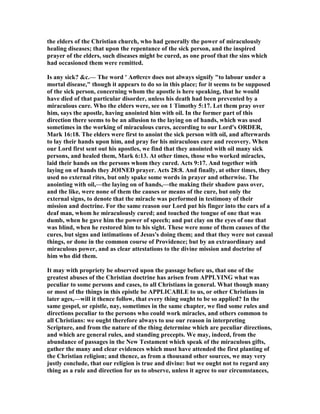
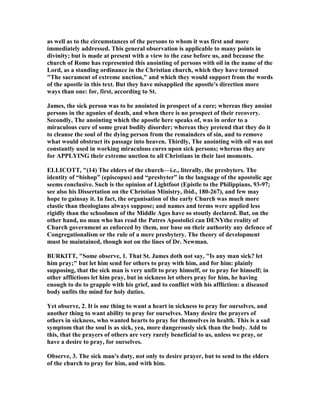
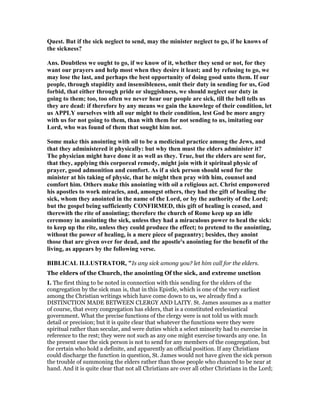
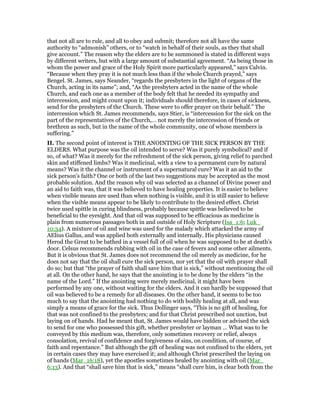
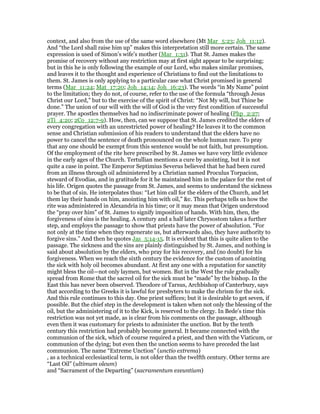
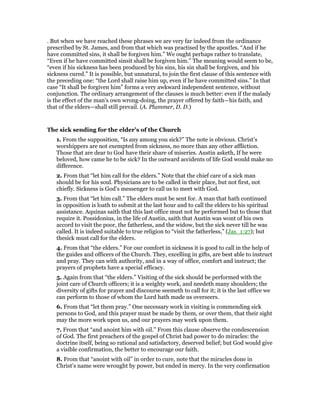
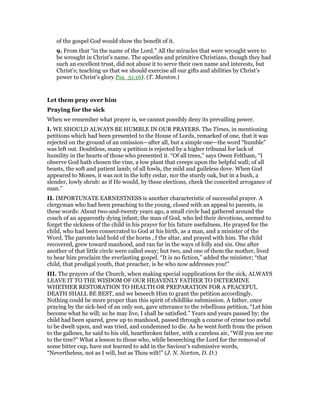
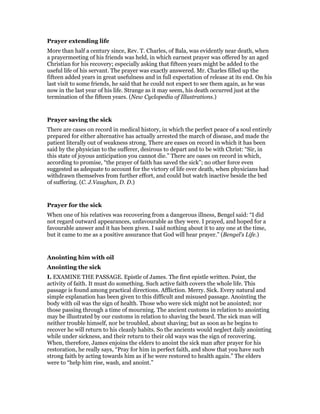
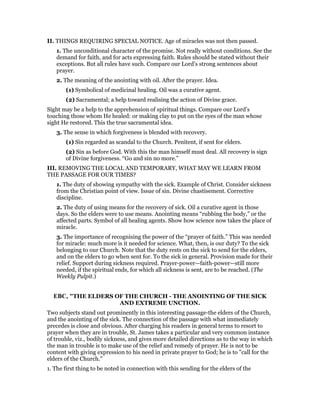
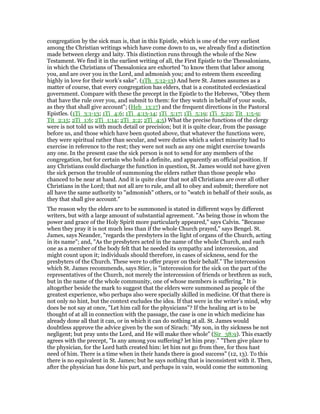
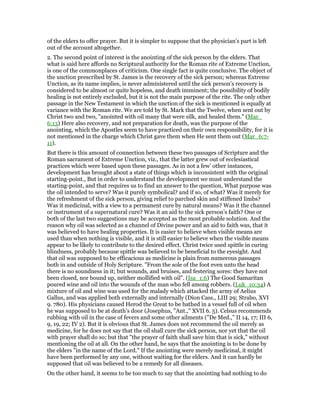
![with bodily healing at all, and was simply a means of grace for the sick. Thus Dollinger
says, "This is no gift of healing, for that was not confined to the presbyters; and for that
Christ prescribed not unction, but laying on of hands. Had he meant that, St. James
would have bidden or advised the sick to send for one who possessed this gift, whether
presbyter or layman"…
"What was to be conveyed by this medium was, therefore, only sometimes recovery or
relief, always consolation, revival of confidence and forgiveness of sins, on condition, of
course, of faith and repentance" ("First Age of the Church," p. 235, Oxenham’s
translation, 2d ed.: Allen, 1867).
But although the gift of healing was not confined to the elders, yet in certain eases they
may have exercised it; and although Christ prescribed the laying on of hands, (Mar_
16:18) yet the Apostles sometimes healed by anointing with oil. (Mar_6:13) And that
"shall save him that is sick" (σωσει τοµνοντα) means "shall cure him," is clear from the
context, and also from the use of the same word elsewhere. "Daughter, be of good cheer;
thy faith hath saved thee," to the woman with the issue of blood. (Mat_9:22) Jairus
prays, "Come and lay Thy hands on her, that she may be saved". (Mar_5:23) The
disciples say of Lazarus, "Lord, if he is fallen asleep, he will be saved". (Joh_11:12) And
"the Lord shall raise him up" makes this interpretation still more certain. The same
expression is used of Simon’s wife’s mother. (Mar_1:31) "The Lord" is Christ, not the
Father, both here and "in the Name of the Lord." Thus St. Peter says to Aeneas, "Jesus
Christ healeth thee." (Act_9:34. Comp. Act_3:6; Act_3:16; Act_5:10)
That St. James makes the promise of recovery without any restriction may at first sight
appear to be surprising; but in this he is only following the example of our Lord, who
makes similar promises, and leaves it to the thought and experience of Christians to find
out the limitations to them. St. James is only applying to a particular case what Christ
promised in general terms. "All things, whatsoever ye pray and ask for, believe that ye
have received them, and ye shall have them." (Mar_11:24. Comp. Mat_17:20) "If ye shall
ask [Me] anything in My Name, I will do." (Joh_14:14) "If ye shall ask anything of the
Father, He will give it you in My Name". (Joh_16:23) The words "in My Name" point to
the limitation; they do not, of course, refer to the use of the formula "through Jesus
Christ our Lord," but to the exercise of the spirit of Christ: "Not My will, but Thine be
done." The union of our will with the will of God is the very first condition of successful
prayer. The Apostles themselves had no indiscriminate power of healing. St. Paul did not
heal Epaphroditus, much as he yearned for his recovery. (Php_2:27) He left Trophimus
at Miletus sick. (2Ti_4:20) He did not cure his own thorn in the 2Co_12:7-9. How, then,
can we suppose that St. James credited the elders of every congregation with an
unrestricted power of healing? He leaves it to the common sense and Christian
submission of his readers to understand that the elders have no power to cancel the
sentence of death pronounced on the whole human race. To pray that any one should be
exempt from this sentence would be not faith, but presumption.
Of the employment of the rite here prescribed by St. James we have very little evidence
in the early ages of the Church. Tertullian mentions a cure by anointing, but it is not
quite a case in point. The Emperor Septimius Severus believed that he had been cured
from an illness through oil administered by a Christian named Proculus Torpacion,
steward of Evodias, and in gratitude for it he maintained him in the palace for the rest of
his life ("Ad. Scap.," 4.). Origen, in the second Homily on Leviticus (4), quotes the
passage from St. James, and seems to understand the sickness to be that of sin. He
interpolates thus: "Let him call for the elders of the Church, and let them lay their hands
on him, anointing him with oil," etc. This perhaps tells us how the rite was administered](https://image.slidesharecdn.com/james5commentary-150623140637-lva1-app6891/85/James-5-commentary-207-320.jpg)
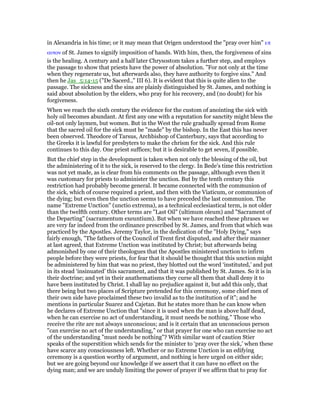
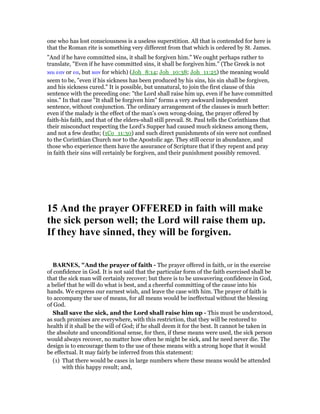
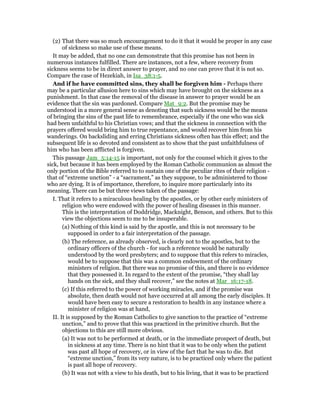
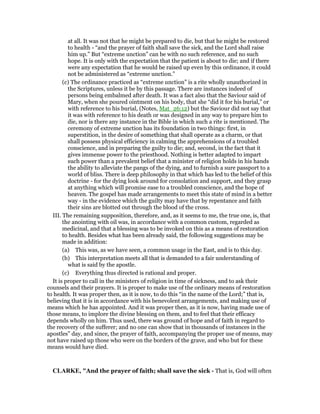
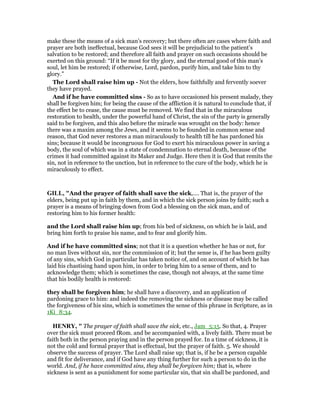
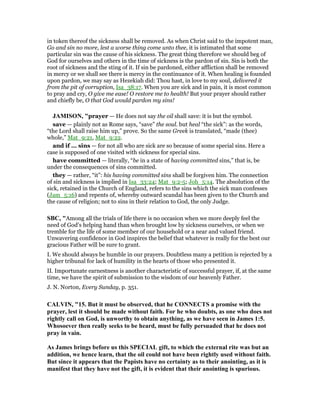
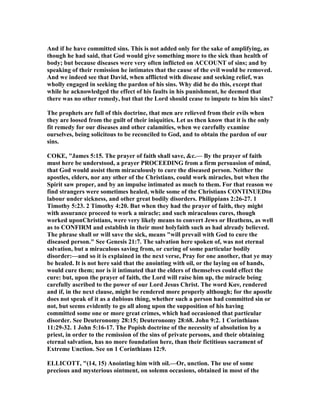
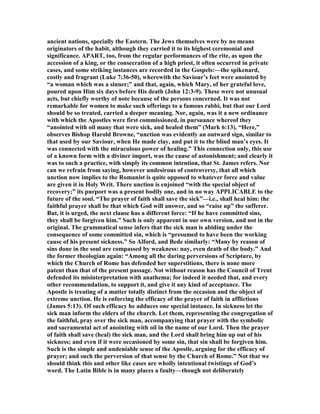
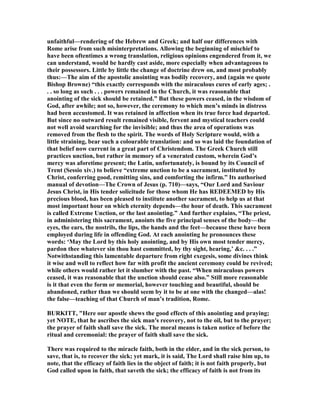
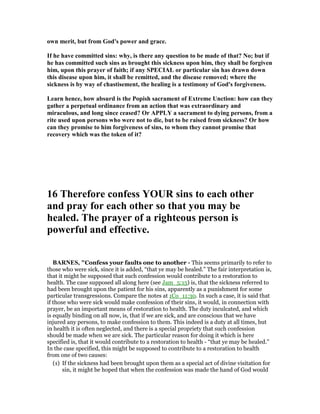
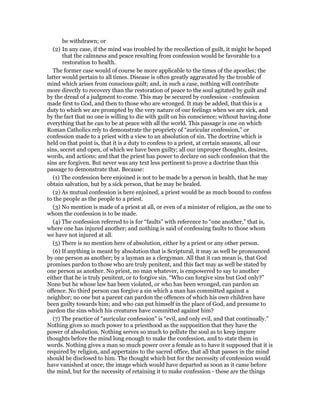
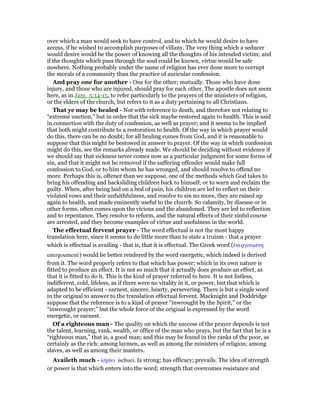
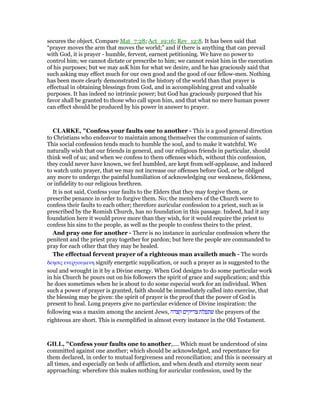
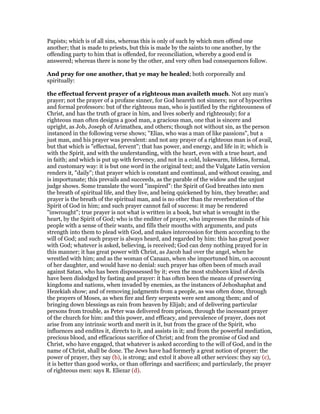
!["to what is צדיקים של ,תפלתן "prayer of righteous men" like? it is like a shovel: the sense is,
that as the shovel turns the corn on the floor, from one place to another, so prayer turns
the holy blessed God from wrath to mercy.''
HE RY, "Christians are directed to confess their faults one to another, and so to join
in their prayers with an for one another, Jam_5:16. Some expositors connect this with
Jam_5:14. As if when sick people send for ministers to pray over them they should then
confess their faults to them. Indeed, where any are conscious that their sickness is a
vindictive punishment of some particular sin, and they cannot look for the removal of
their sickness without particular applications to God for the pardon of such a sin, there it
may be proper to acknowledge and tell his case, that those who pray over him may know
how to plead rightly for him. But the confession here required is that of Christians to one
another, and not, as the papists would have it, to a priest. Where persons have injured
one another, acts of injustice must be confessed to those against whom they have been
committed. Where persons have tempted one another to sin or have consented in the
same evil actions, there they ought mutually to blame themselves and excite each other
to repentance. Where crimes are of a public nature, and have done any public mischief,
there they ought to be more publicly confessed, so as may best reach to all who are
concerned. And sometimes it may be well to confess our faults to some prudent minister
or praying friend, that he may help us to plead with God for mercy and pardon. But then
we are not to think that James puts us upon telling every thing that we are conscious is
amiss in ourselves or in one another; but so far as confession is necessary to our
reconciliation with such as are at variance with us, or for gaining information in any
point of conscience and making our own spirits quiet and easy, so far we should be ready
to confess our faults. And sometimes also it may be of good use to Christians to disclose
their peculiar weaknesses and infirmities to one another, where there are great
intimacies and friendships, and where they may help each other by their prayers to
obtain pardon of their sins and power against them. Those who make confession of their
faults one to another should thereupon pray with and for one another. The Jam_5:13
directs persons to pray for themselves: Is any afflicted let him pray; the Jam_5:14
directs to seek for the prayers of ministers; and the Jam_5:16 directs private Christians
to pray one for another; so that here we have all sorts of prayer (ministerial, social, and
secret) recommended.
JAMISO , "The oldest authorities read, “Confess, THEREFORE,” etc. Not only in
the particular case of sickness, but universally confess.
faults — your falls and offenses, in relation to one another. The word is not the same
as sins. Mat_5:23, Mat_5:24; Luk_17:4, illustrate the precept here.
one to another — not to the priest, as Rome insists. The Church of England
recommends in certain cases. Rome compels confession in all cases. Confession is
desirable in the case of (1) wrong done to a neighbor; (2) when under a troubled
conscience we ask counsel of a godly minister or friend as to how we may obtain God’s
forgiveness and strength to sin no more, or when we desire their intercessory prayers for
us (“Pray for one another”): “Confession may be made to anyone who can pray”
[Bengel]; (3) open confession of sin before the Church and the world, in token of
penitence. Not auricular confession.
that ye may be healed — of your bodily sicknesses. Also that, if your sickness be the
punishment of sin, the latter being forgiven on intercessory prayer, “ye may be healed”](https://image.slidesharecdn.com/james5commentary-150623140637-lva1-app6891/85/James-5-commentary-222-320.jpg)
![of the former. Also, that ye may be healed spiritually.
effectual — intense and fervent, not “wavering” (Jam_1:6), [Beza]. “When energized”
by the Spirit, as those were who performed miracles [Hammond]. This suits the
collocation of the Greek words and the sense well. A righteous man’s prayer is always
heard generally, but his particular request for the healing of another was then likely to
be granted when he was one possessing a special charism of the Spirit. Alford translates,
“Availeth much in its working.” The “righteous” is one himself careful to avoid “faults,”
and showing his faith by works (Jam_2:24).
CALVI , "16Confess YOUR faults one to another. In some copies the illative
particle is given, nor is it unsuitable; for though when not expressed, it must be
understood. He had said, that sins were remitted to the sick over whom the elders
prayed: he now reminds them how useful it is to discover our sins to our brethren,
even that we may obtain the pardon of them by their intercession. (142)
This passage, I know, is explained by many as referring to the reconciling of
offenses; for they who wish to return to favor must necessarily know first their own
faults and confess them. For hence it comes, that hatreds take root, yea, and increase
and become irreconcilable, because every one perniciously defends his own cause.
Many therefore think that James points out here the way of brotherly
reconciliation, that is, by mutual acknowledgment of sins. But as it has been said, his
object was different; for he CO ECTSmutual prayer with mutual confession; by
which he intimates that confession AVAILS for this end, that we may be helped as
to God by the prayers of our brethren; for they who know our necessities, are
stimulated to pray that they may assist us; but they to whom our diseases are
unknown are more tardy to bring us help.
Wonderful, indeed, is the folly or the insincerity of the Papists, who strive to build
their whispering confession on this passage. For it would be easy to infer from the
words of James, that the priests alone ought to confess. For since a mutual, or to
speak more plainly, a reciprocal confession is demanded here, no others are bidden
to confess their own sins, but those who in their turn are fit to hear the confession of
others; but this the priests claim for themselves alone. Then confession is required of
them alone. But since their puerilities do not deserve a refutation, let the true and
genuine explanation already given be deemed sufficient by us.
For the words clearly mean, that confession is required for no other end, but that
those who know our evils may be more solicitous to bring us help.
Availeth much. That no one may think that this is done without fruit, that is, when
others pray for us, he expressly mentions the benefit and the effect of prayer. But he
names expressly the prayer of a righteous or just man; because God does not hear
the ungodly; nor is access to God open, except through a good conscience: not that
OUR PRAYERS are founded on our own worthiness, but because the heart must be
cleansed by faith before we can present ourselves before God. Then James testifies
that the righteous or the faithful pray for us beneficially and not without fruit.](https://image.slidesharecdn.com/james5commentary-150623140637-lva1-app6891/85/James-5-commentary-223-320.jpg)
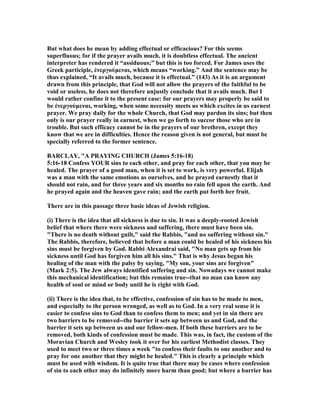
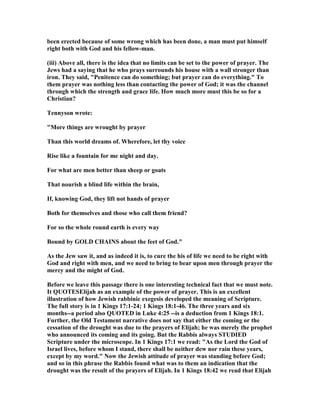
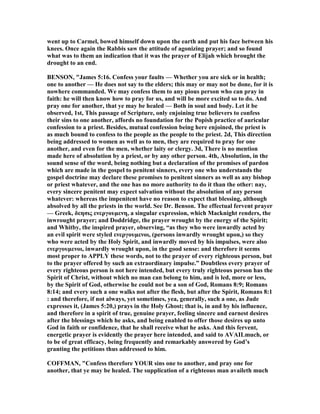
![in its working.
One to another ... Mutuality is certainly implied by this. There is no class of men set
up in God's church to hear confessions. o so-called "priest" ever had the right to
hear the confessions of the penitent, unless he himself, in turn, would likewise
confess his own sins to the confessor. As Roberts aptly wrote:
The Roman Catholic doctrine of auricular confession has no support from this
passage. "Elders" does not refer to a priestly set of workers. And not even the elders
ever had the power to absolve a sinner or set terms and conditions of his forgiveness.
[53]SIZE>
The cathartic effect of confession, as mutually engaged among Christians, is helpful
and beneficial, the purpose of such confessions being that of enlisting the mutual
prayers of Christians for each other. There is not in view here any requirement for
Christians to confess their sins "to the whole church," a practice which is not only
not in view here, but which, under certain circumstances, can have a POSITIVELY
detrimental effect. The holy church itself is not a "priest" standing between the
penitent Christian and his forgiveness.
It is felt that the comment of Wessel on this verse is appropriate:
This does not mean that Christians are to indulge in indiscriminate public, or even
PRIVATE confessions; and certainly the passage has nothing to do with confession
to a priest.[54]SIZE>
The supplication of a righteous man availeth much in its working ... Again, as
Wessel said, "There is no unanimity as to how to render this; but the meaning is
clear: a good man has great power in prayer."[55] This is as good a place as any to
stress the meaning apparent here. o matter what circumstance of suffering or
illness may overtake the child of God, the avenue of prayer is OPE for his seeking
relief from the Father himself through Christ. It has been the happy good fortune of
this writer to behold many answers to prayers in conditions and circumstances
approaching, but not reaching, the miraculous itself. God answers his children's
prayers; and the power of those prayers is sealed by James' word in this place.
Regarding the fad of some present-day religious groups unbosoming themselves
completely to those initiated into the cult, "It is apt to have more harmful than
beneficial results, giving an outlet for an unhealthy exhibitionism."[56]
It is also wrong to take James' words here as laying down any additional condition
of a Christian's forgiveness. The apostle Peter made repentance and prayer to be the
sole conditions of a sinning, penitent Christian's forgiveness; and it is not true that
James here laid down another condition. Helpful and beneficial as confession
assuredly is in many circumstances, no new condition is in evidence.
[53] J. W. Roberts, op. cit., p. 173.
[54] Walter W. Wessel, op. cit., p. 962.](https://image.slidesharecdn.com/james5commentary-150623140637-lva1-app6891/85/James-5-commentary-227-320.jpg)
![[55] Ibid.
[56] R. V. G. Tasker, op. cit., p. 135.
COKE, "James 5:16. Confess YOUR faults, &c.— Confess therefore your faults,
&c. See Mills, and Wetstein. They were to make a confession of those particular sins
which had drawn some remarkable diseases upon them, as a token of the divine
displeasure for their unchristian conduct. Their sending for the elders of the church
plainly supposes that they had faith to be healed; and the confession of their sins,
which they are here ordered to make, as plainly supposes that they were penitent:
for, unless they repented of those particular sins which had occasioned the disorders
under which they laboured, it does notappear that they obtained a miraculous cure.
The confession was to be made by a sick person, in order to his being cured; not by
a person in health, in order to his obtaining eternal salvation: and it was to be made
to the elders, or to any other Christians, who had the power of miraculously curing
diseases, that they might pray for the pardon of those particular crimes, and that
the penitent might be released from the punishment under which he had fallen.
From these considerations it appears, that the popish doctrine of auricular
confession has as little foundation here, as their sacrament of extreme unction, and
the necessity of sacerdotal absolution, in order to the remission of sins. They would
build several of their novel doctrines on the concluding part of this epistle; but they
are like castles in the air, without any foundation or support. From this direction of
the apostle, Confess your faults, &c. they have introduced the necessity of private
Christians confessing all their sins to a priest; that they may obtain his authoritative
absolution, and may be assured of being fully pardoned. By this means, they have
brought the people into a blind subjection to, and slavish dependance upon the
clergy; by this means they have enticed women to lewdness, and taught vice to the
innocent; have dived into the secrets of families and cities, of courts and kingdoms;
have betrayed princes and states, as well as private persons, and done infinite
mischief in the world: whereas, ACCORDI G to this direction of the apostle, the
same persons are here ordered to confess their faults one to another, who in the next
sentence are ordered to pray one for another. The priest ought therefore to confess
to the people, and desire their prayers and absolution, as well as the people to the
priest, in order to have his prayers and absolution; for it is said, Confess YOUR
faults one to another, and pray one for another.
The effectual fervent prayer, &c.— The prayer of a righteous man under the divine
impulse AVAILSmuch. The word ενεργουµενη signifies, "wrought by the energyof
the Spirit." The apostle, says Benson, means a prayer wrought in a man by the
Spirit of God, or which PROCEEDED from a prophetic impulse, and by which he
knew what success he should have; as plainly appears from what is said in the
preceding notes, concerning the miraculous cures which were effected upon such a
prayer, and likewise from what isafterwards said concerning the prayer of Elijah.
See Ephesians 3:20. Colossians 1:29. 1 Corinthians 12:11.
ELLICOTT, "(16) Confess YOUR faults one to another.—The meaning attributed
to the words of this verse by many devout Catholics cannot be established either](https://image.slidesharecdn.com/james5commentary-150623140637-lva1-app6891/85/James-5-commentary-228-320.jpg)
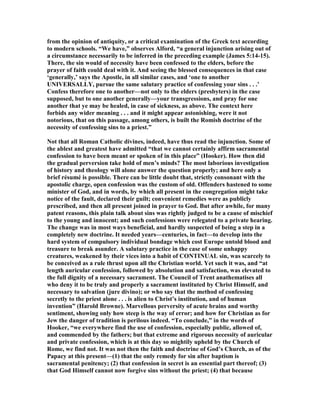
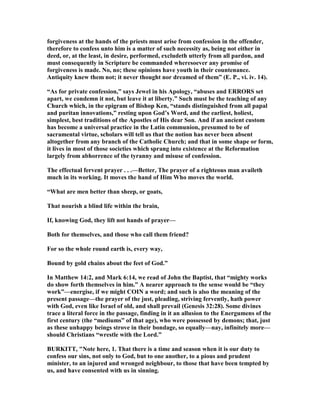
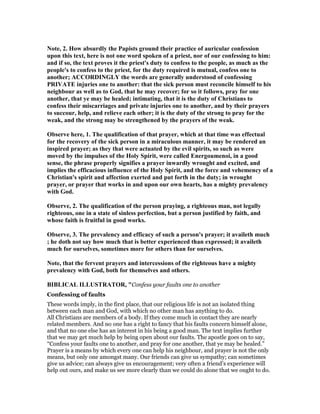
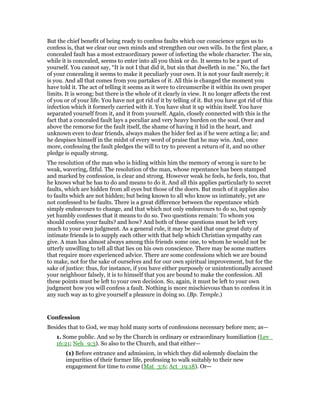
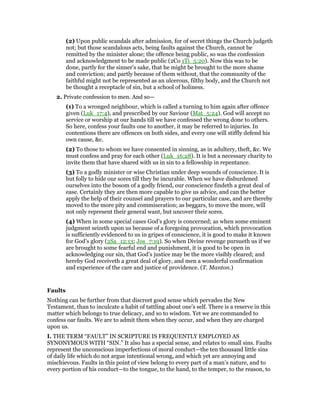
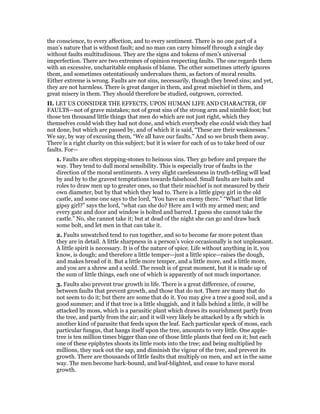
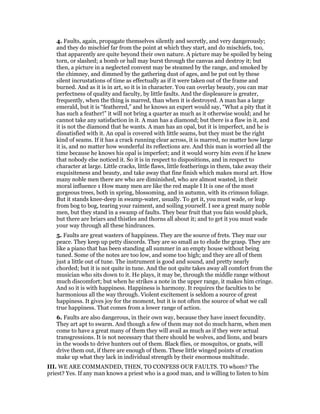
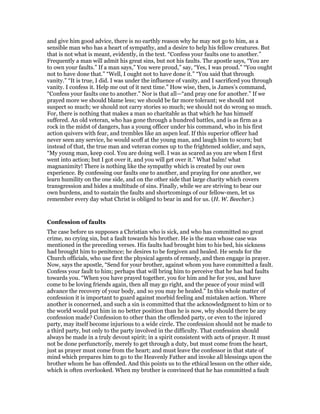
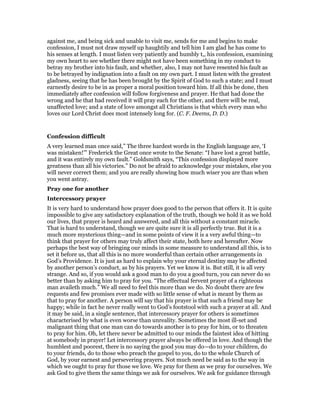
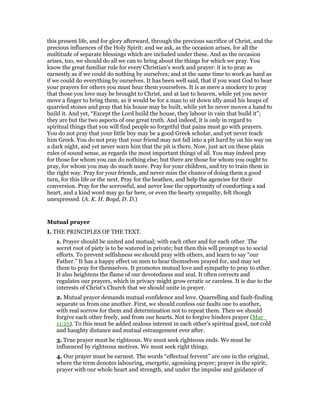
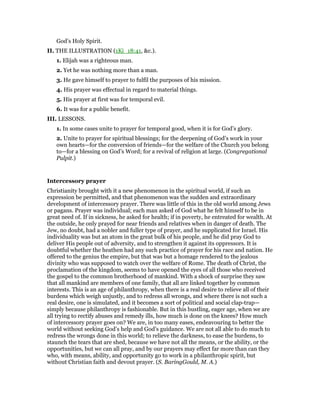
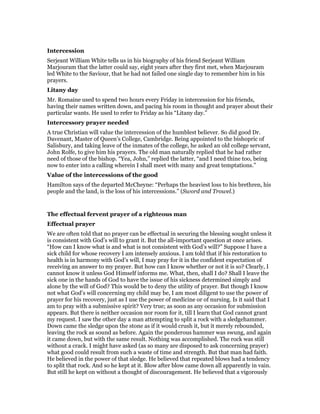
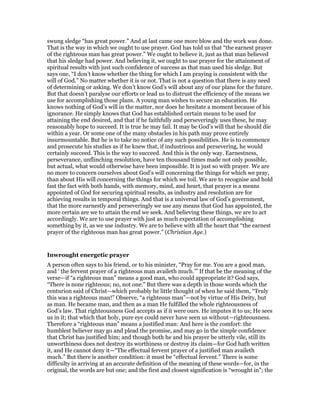
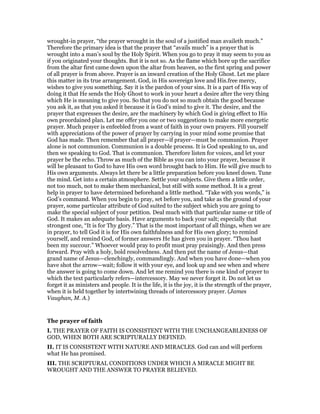
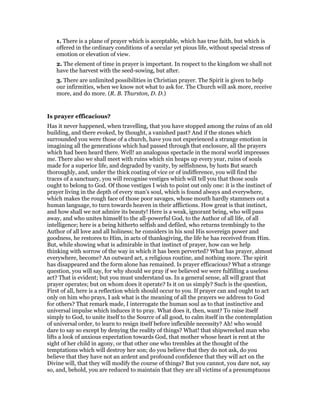
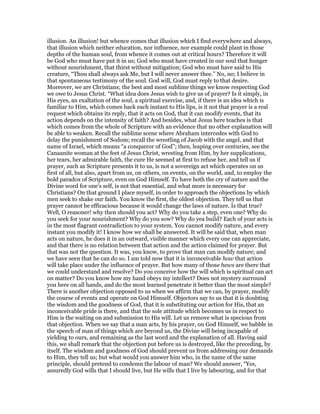
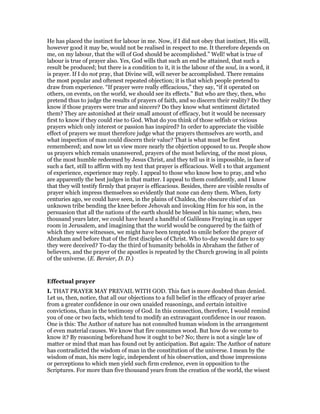
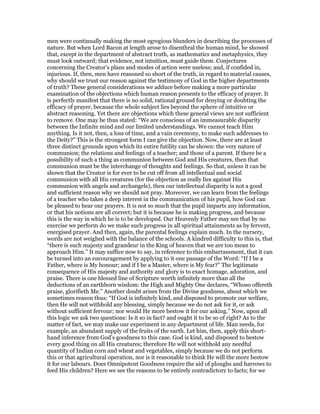
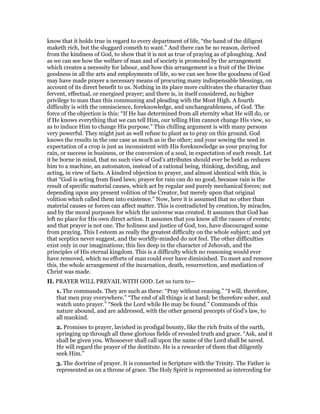
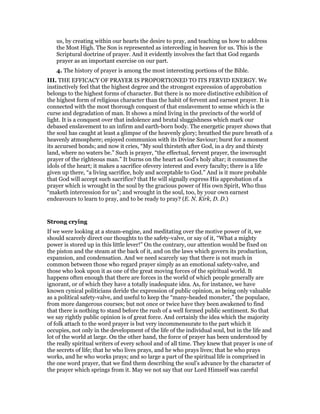
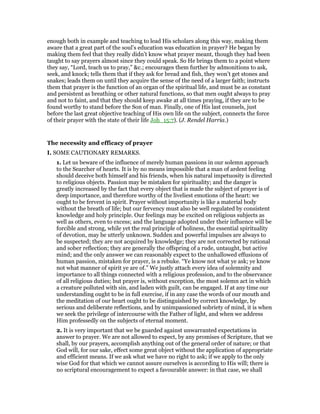
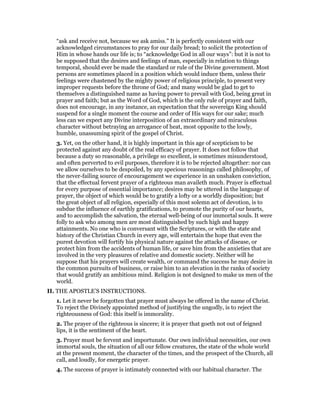
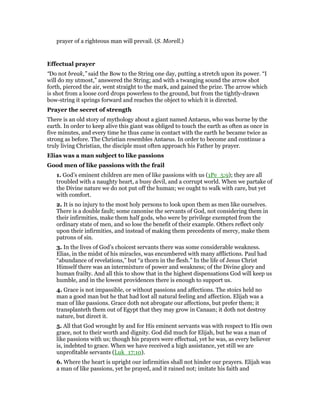
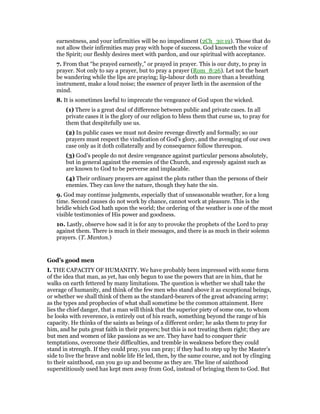
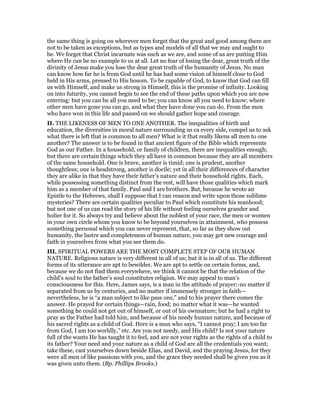
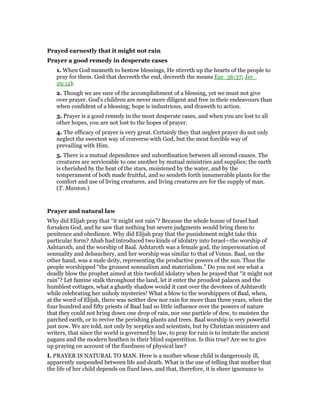
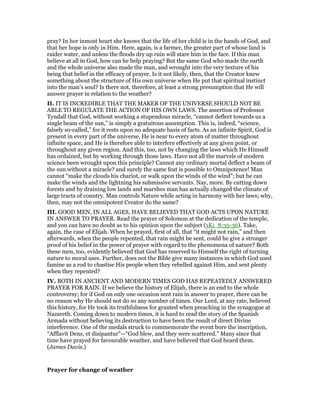
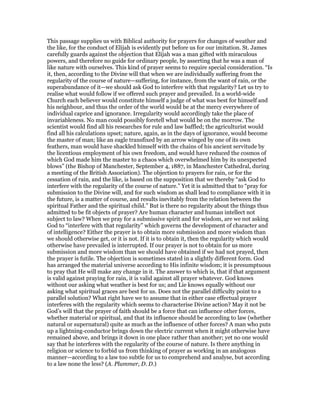
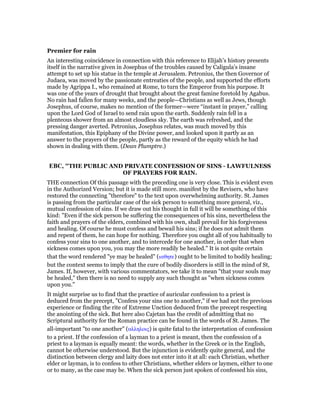
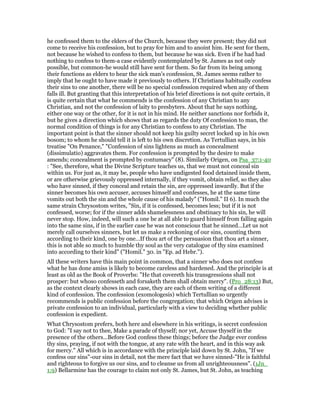
![confession to a priest ("De Paenit.," III 4); but it is manifest that St. John is speaking of
confession to God, without either approving or condemning confession to man, and that
St. James is speaking of the latter, without saying anything about the former. But just as
St. James leaves to the penitent’s discretion the question to whom he shall confess,
whether to clergy or laity, so also he leaves it to his discretion whether he shall confess to
one or to many, and whether in private or in public. In the second, third, and fourth
centuries public confession was commonly part of public penance. And the object of it is
well stated by Hooker: "Offenders in secret "were" persuaded that if the Church did
direct them in the offices of their penitency, and assist them with public prayer, they
should more easily obtain that they sought than by trusting wholly to their own
endeavors." The primitive view, he holds, was this: "Public confession they thought
necessary by way of discipline, not private confession as in the nature of a sacrament"
("Eccl. Pol.," VI 4:2, 6). But experience soon showed that indiscriminate public
confession of grievous sin was very mischievous. Therefore, in the East, and (if Sozomen
is correct) at Rome also, penitentiary presbyters were appointed to decide for penitents
whether their sins must be confessed to the congregation or not. Thus, what Origen
advises each penitent to do for himself, viz., seek a wise adviser respecting the
expediency of public, confession and penance, was formally done for every one. But in
A.D. 391, Nectarius, the predecessor of Chrysostom in the see of Constantinople, was
persuaded to abolish the office, apparently because a penitentiary presbyter had
sanctioned public confession m a case which caused great scandal; but neither Socrates
(5. 19) nor Sozomen (VII 16.) makes this point very clear. The consequence of the
abolition was that each person was left to his own discretion, and public penance fell
into disuse.
But public confess on had other disadvantages. Private enmity made use of these
confessions to annoy, and even to prosecute the penitent. Moreover, the clergy
sometimes proclaimed to the congregation what had been told them in confidence; that
is, they made public confession on behalf of the sinner without his consent. Whereupon
Leo the Great, in a letter to the Bishops of Apulia and Campania, March 6, A.D. 459,
sanctioned the practice of private confession ("Ep." 168. [136]). Thus, in the West, as
previously in the East, a severe blow was given to the practice of public confession and
penance.
But it is probable that the origin, or at least the chief encouragement, of the practice of
auricular confession is rather to be looked for in monasticism. Offenses against the rule
of the Order had to be confessed before the whole community; anal it was assumed that
the only other grave offences likely to happen in the monastic life would be those of
thought. These had to be confessed in private to the abbot. The influences of
monasticism were by no means bounded by the monastery walls; and it is probable that
the rule of private confession by the brethren to the abbot had much to do with the
custom of private confession by the laity to the priest. But it is carefully to be noted that
for a considerable period the chief considerations are the penitent’s admission of his sins
and the fixing of the penance. Only gradually does the further idea of the absolution of
the penitent by the body or the individual that hears the confession come in; and at last
it becomes the main idea. Confession once a year to a priest was made compulsory by the
Lateran Council in 1215; but various local synods had made similar regulations at earlier
periods; e.g., the Council of Toulouse in 1129, and of Liege in 710. But when we have
reached these regulations we have once more advanced very far indeed beyond what is
prescribed by St. James in this Epistle. There cannot be much doubt what is the main
idea with St. James: "Confess therefore your sins one to another, and pray one for
another, that ye may be healed. The supplication of a righteous man availeth much in its](https://image.slidesharecdn.com/james5commentary-150623140637-lva1-app6891/85/James-5-commentary-259-320.jpg)
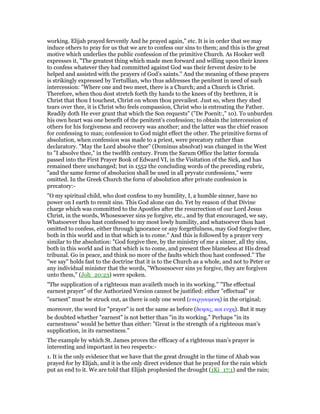
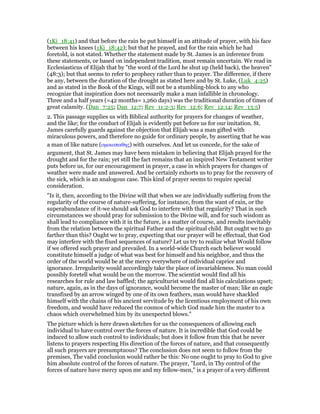
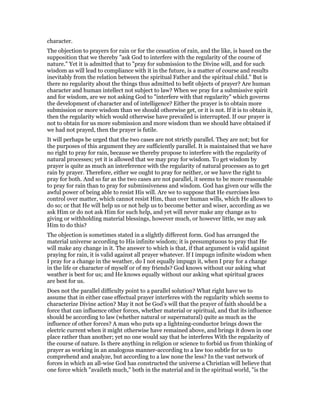
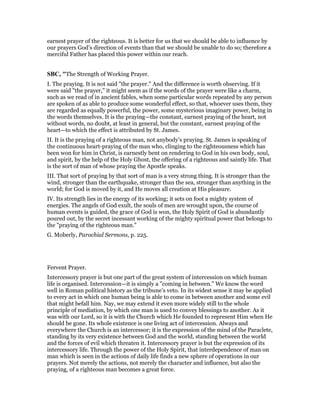
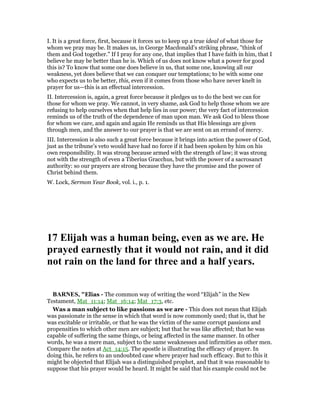
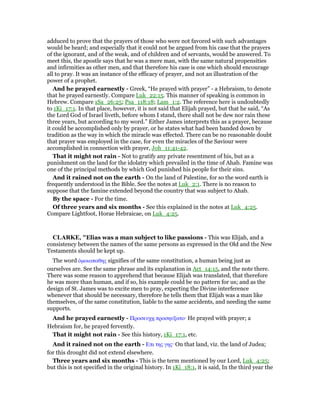
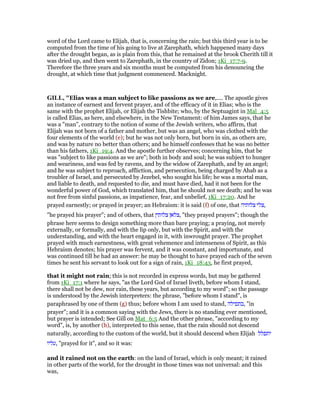
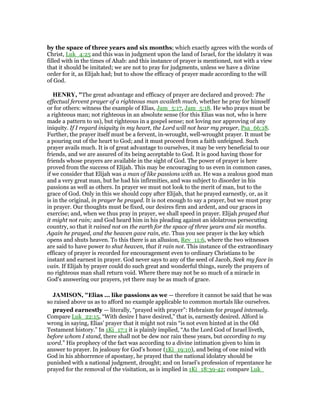
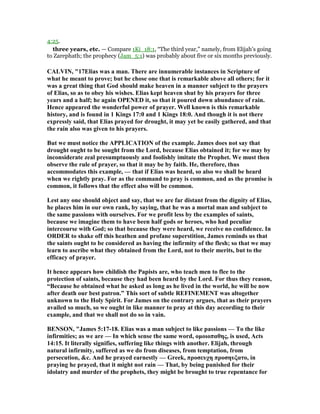
![these crimes. And it rained not on the earth — That is, on the land of the ten tribes;
for three years and six months — This is the period which our Lord likewise says
the drought CO TI UED, Luke 4:25. It is said, indeed, (1 Kings 18:1,) that in the
third year the word of the Lord came to Elijah, namely, concerning the rain. But
this third year was COMPUTED from the time of his going to live at Zarephath,
which happened many days after the drought began; as is plain from this, that he
remained at the brook Cherith till it was dried up, and then went to Zarephath in
the country of Sidon, 1 Kings 17:7; 1 Kings 17:9. Wherefore the three years and six
months must be COMPUTED from his denouncing the drought, at which time that
judgment commenced. See note on 1 Kings 18:1. And he prayed again — When
idolatry was abolished; and the heaven gave rain — As is recorded 1 Kings 18.,
where we are told, that he cast himself down on the earth, and put his face between
his knees, which was the posture of an humble and earnest supplicant. Thus Moses’s
praying is expressed by his falling on his face, umbers 16:4.
COFFMA , "Elijah was a man of like passions with us, and he prayed fervently
that it might not rain; and it rained not on the earth for three years and six months.
Elijah ... a man of like passions ... The argument is that Elijah, despite the fact of his
being a OTEDprophet, was nevertheless a fallible and sinful man like the
Christians of all generations; but that, in spite of his mortality, sin and
imperfections, God mightily answers his prayers, and he will do the same for us.
Three years and six months ... The EVE T in view in these words is recorded in 1
Kings 17:1-18:lff, where the exact duration of the drought is nowhere mentioned.
Despite this, the Old Testament expression "in the third year" in that passage is
sometimes construed as a "contradiction" of the "three years and six months" of
this passage and the one in Luke 4:25. Of course, this is another well-known
"pseudocon." As Haley said, "We may reckon `the third year' of the Old Testament,
not as indicating the length of the drought, but a reference to the sojourn of Elijah
with the widow of Zarephath."[57] In other words, the drought began six months
before the famine did, the Old Testament "third year" having reference to the
duration of the famine, and the ew Testament "three years and six months"
referring to the duration of the drought itself. Jesus himself endorsed this
CALCULATIO (Luke 4:25).
E D OTE:
[57] John W. Haley, Alleged Discrepancies of the Bible ( ashville: B. C.
Goodpasture, 1951), p. 415.
COKE, "James 5:17. Elias was a man subject to like passions, &c.— ' Οµοιοπαθης,
A man of a like frail and mortal composition; liable to the evils and afflictions of life,
and subject to death, as well as other men: and his saying in this place, that Elijah
wasfrail and mortal like other men, seems to have been in order to anticipate an
inquiry like that recorded, Sirach 48:3-4. "Elijah (they might have said) was an
extraordinary prophet; and at last translated without dying; whereas we are only
frail men; Why therefore should we expect such favours as were granted to him?"](https://image.slidesharecdn.com/james5commentary-150623140637-lva1-app6891/85/James-5-commentary-269-320.jpg)
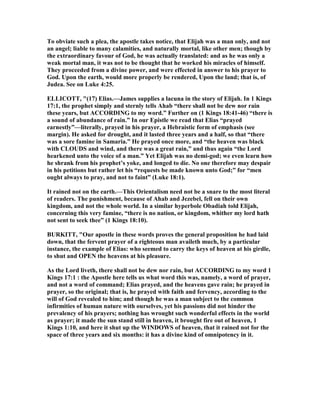
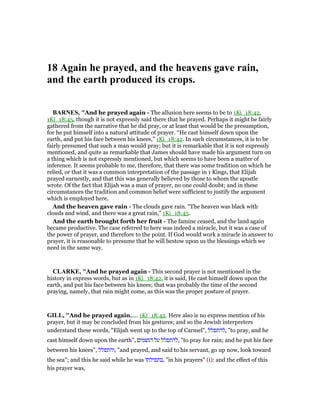
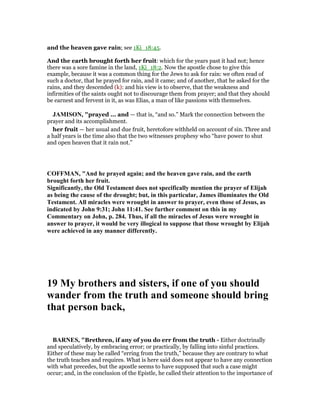
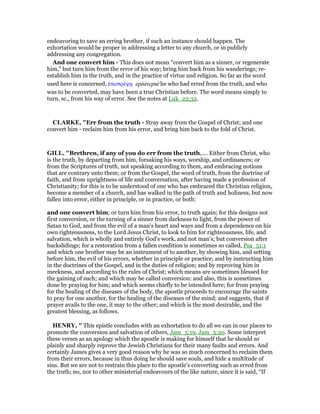
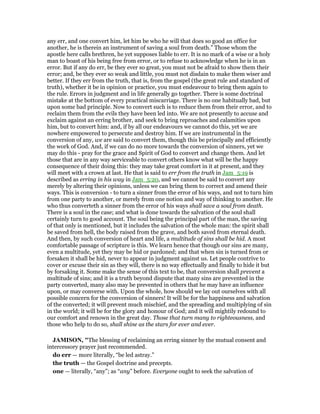
![everyone [Bengel].
BARCLAY, "THE TRUTH WHICH MUST BE DO E (James 5:19-20)
5:19-20 My brothers, if any among you wanders from the truth and if anyone turns
him again to the right way, let him know that he who has turned a sinner from his
wandering way will save his brothel's soul from death and will hide a multitude of
his own sins.
In this passage there is set down the great differentiating characteristic of Christian
truth. It is something from which a man can wander. It is not only intellectual,
philosophical and abstract; it is always moral truth.
This comes out very clearly when we go to the ew Testament and look at the
expressions which are used in CO ECTIO with truth. Truth is something which
a man must love (2 Thessalonians 2:10); it is something which a man must obey
(Galatians 5:7); it is something which a man must display in life (2 Corinthians 4:2);
it is something which must be spoken in love (Ephesians 4:15); it is something which
must be witnessed to (John 18:37); it is something which must be manifested in a life
of love (1 John 3:19); it is something which liberates (John 8:32); and it is something
which is the gift of the Holy Spirit, sent by Jesus Christ (John 16:13-14).
Clearest of all is the phrase in John 3:21, he who does what is true. That is to say,
Christian truth is something which must be done. It is not only the object of the
search of the mind; it is always moral truth issuing in action. It is not only
something to be studied but something to be done; not only something to which a
man must SUBMIT only his mind but something to which he must submit his whole
life.
THE SUPREME HUMA ACHIEVEME T (James 5:19-20 CO TI UED)
James finishes his letter with one of the greatest and most uplifting thoughts in the
ew Testament; and yet one which occurs more than once in the Bible. Suppose a
man goes wrong and strays away; and suppose a fellow-Christian rescues him from
the ERROR of his ways and brings him back to the right path. That man has not
only saved his brother's soul, he has covered a multitude of his own sins. In other
words, to save another's soul is the surest way to save one's own.
Mayor points out that Origen has a wonderful passage in one of his Homilies in
which he indicates these six ways in which a man may gain forgiveness of his sins--
by baptism, by martyrdom, by almsgiving (Luke 11:41), by the forgiveness of others
(Matthew 6:14), by love (Luke 7:47), and by converting a sinner from the evil of his
ways. God will forgive much to the man who has been the means of leading another
brother back to him.
This is a thought which shines forth every now and then from THE PAGES of
Scripture. Jeremiah says, "If you utter what is precious, and not what is worthless,](https://image.slidesharecdn.com/james5commentary-150623140637-lva1-app6891/85/James-5-commentary-275-320.jpg)
![you shall be as my mouth" (Jeremiah 15:19). Daniel writes: "And those who are
wise shall shine like the brightness of the firmament; and those who turn many to
righteousness, like the stars for ever and ever" (Daniel 12:3). The advice to the
young Timothy is: "Take heed to yourself, and to YOUR teaching; for by so doing
you will save both yourself and your hearers" (1 Timothy 4:16).
There is a saying of the Jewish Fathers: "Whosoever makes a man righteous, sin
prevails not over him." Clement of Alexandria says that the true Christian reckons
that which benefits his neighbour his own salvation. It is told that an ultra-
evangelical lady once asked Wilberforce, the liberator of the slaves, if his soul was
saved. "Madame," he answered, "I have been so busy trying to save the souls of
others that I have had no time to think of my own." It has been said that those who
bring sunshine into the lives of others cannot keep it from themselves; and certainly
those who bring the lives of others to God cannot keep God out of their own. The
highest honour God can give is bestowed upon him who leads another to God; for
the man who does that does nothing less than share in the work of Jesus Christ, the
Saviour of men.
BE SO , "James 5:19-20. Brethren — As if he had said, I have now warned you of
those things to which you are most liable. And in all these respects watch, not only
over yourselves, but every one over his brother also. Labour, in particular, to
recover those that are fallen. For if any of you do err from the truth — From the
right way in which he ought to walk, if he be seduced by any means from the
doctrine and practice of the gospel; and one — Any one; convert him — Be a means
of bringing him back into that way from which he had wandered; let him know —
Who has been enabled to effect so good a work; that he who converteth a sinner
from the error of his way — From the false doctrine and bad practice to which he
had turned aside, shall produce a much happier effect than any miraculous cure of
the body; for he shall save a precious immortal soul from spiritual and eternal
death, and shall hide a multitude of sins — amely, the sins of the persons thus
converted, which shall no more, how many soever they are, be remembered to his
condemnation. “The covering of sin is a phrase which often occurs in the Old
Testament, and always signifies the pardoning of sin. or has it any other meaning
here. For surely it cannot be the apostle’s intention to tell us, that the turning of a
sinner from the ERROR of his way will conceal from the eye of God’s justice a
multitude of sins committed by the person who does this charitable office, if he
continueth in them. Such a person needs himself to be turned from the error of his
way, in ORDER that his own soul may be saved from death. St. Peter has a similar
expression, (1 Peter 4:8,) love covereth a multitude of sins; not, however, in the
person who is possessed of love, but in the person who is the object of his love.” —
Macknight.
COFFMA , "My brethren, if any among you err from the truth, and one convert
him; let him know, that he who converteth a sinner from the ERROR of his way
shall save a soul from death, and shall cover a multitude of sins.
The great difficulty for some in these verses, as stated by Ward, is "in the thought of
the doom of a Christian."[58] Of course, the source of the difficulty is not in what](https://image.slidesharecdn.com/james5commentary-150623140637-lva1-app6891/85/James-5-commentary-276-320.jpg)
![James said but in the Calvinistic doctrine which has no support in the ew
Testament, and which, in fact, is contradicted on almost every page of it, including
this one. It is no denial of this that the word "convert" used here is the same one
used by Peter after he DE IED the Lord (Luke 22:32). That usage merely
CO FIRMS the thought that if Peter himself had not been converted even though
he was a true believer, he still would have suffered eternal death.
To avoid the thrust of this passage, some follow the course of Wessel in referring
"death" here to "physical death."[59] This, however, is not indicated at all. As
Roberts said, "Death here is eternal death, the second death of the Bible.
Repentance will not save a soul from any other kind of death?[60]
If any err from the truth ... The implications of this are profound. That a Christian
can err from the truth is not merely a possibility, but a frequent occurrence.
Inherent in this is also a fact, as Barclay put it, that "Truth is something that must
be done."[61] Failure to do it is a failure to WI eternal life.
Another question that surfaces in reference to these verses is the question of
whether or not the covering of "a multitude of sins" APPLIES to the sins of the
converted, or to the sins of the one doing the converting. The primary meaning must
certainly be the former; although, of course, there is a sense in which those who win
souls may Scripturally be said to "save themselves." Thus, Paul wrote Timothy, "In
doing this thou shalt save both thyself and them that hear thee" (1 Timothy 4:16).
Barclay caught the spirit of these words, "To save another's soul is the surest way to
save one's own soul."[62]
Many have commented on James' seemingly abrupt ending of the epistle; but this is
altogether appropriate. He closed on the note of every Christian's concern for the
reclamation of the backslider, including also the LARGER sphere of winning the
alien lost to Christ. As Tasker aptly phrased it:
o duty laid upon Christians is more in keeping with the mind of their Lord, or
more expressive of Christian love, than the duty of reclaiming the backslider.[63]
SIZE>
Here there is no signature, no farewell greeting, no formal closure of any kind, just
the bold imperious words of the inspired writer, standing starkly against the mists
of fleeting centuries like a massive inscription chiseled into a granite mountain. o
pseudonymous writer, no forger, no impostor of later times would have dared to
conclude a letter like this. James carries its own inherent testimony of its truth and
inspiration of God.
[58] Ronald A. Ward, op. cit., p. 1235.
[59] Walter W. Wessel, op. cit., p. 963.
[60] J. W. Roberts, op. cit., p. 179.](https://image.slidesharecdn.com/james5commentary-150623140637-lva1-app6891/85/James-5-commentary-277-320.jpg)
![[61] William Barclay, op. cit., p. 133.
[62] Ibid., p. 134.
[63] R. V. G. Tasker, op. cit., p. 142.
COKE, "James 5:19. If any of you do err from the truth,— The Christian revelation
is often called truth, as containing themost important truths, such as lead men to
holiness and happiness. That manner of life which the gospel prescribes, is here
compared to a plain path; and such as departed from it into the crooked paths of
unholiness or vice, were carefully to be brought under the power of Divine grace
into the right way again, by the friendly admonitions and good example of those
who had not wandered out of the way. See Galatians 6:1. 2 Timothy 2:24-25.
ELLICOTT, "(19) Brethren.—My brethren, it rather ought to be. The last, and, to
some, the dearest of the wise Apostle’s remarks, is this on conversion; and it fitly
closes his loving and plain-speaking Letter.
If any of you do err . . .—Better thus, If one of you be led away from the truth, and
one convert him. It is not the wilful ERROR, so much as the being seduced by
others, who draw the unwary from their proper course, till in time they become of
themselves “wandering stars, to whom is reserved the blackness of darkness for
ever” (Jude 1:13). As the leading away was an act prompted by the devil, so the
bringing home is the service of God, and each will have its fit REWARD. The sinner
is riding, as it were, headlong to destruction, when a friend lays hold upon the rein,
and literally “converts” him, i.e., turns him round; but, observe, the wanderer is still
far from home, and many a weary league must he traverse, even with face turned
and kept heavenward, before the end be neared.
BURKITT, "Our apostle concludes his epistle with an exhortation to the duty of
fraternal CORRECTIO and Christian admonition: "If, says he, any one among
you, who hath made an outward profession of Christianity, shall, for fear of
persecution, or otherwise turn aside from the rule of the gospel, whether in matters
of faith or practice, such a person, either Minister or private Christian, as shall be
instrumental, by prayer, reproof, or counsel to recover him out of that wandering
and backsliding condition, shall have the honour to save a soul from death, and
shall hide a multitude of sins; that is, he shall be a means of bringing him to a sight
of his sins, and to seek a pardon of them, which is the only true and happy way of
hiding and of covering of them."
Learn hence, 1. It is not sufficient that every one takes care of his own soul, but he
must also watch over the souls of others; there is no brother so mean in the
Christian church, but the care of his salvation belongeth to all in the Christian
communion.
Learn, 2. What great honour God puts upon the creature, in calling him a Saviour
to a restored and converted brother, he shall save a soul from death: but when God](https://image.slidesharecdn.com/james5commentary-150623140637-lva1-app6891/85/James-5-commentary-278-320.jpg)
